MATTERS MANUFACTURING





By the time you read this, the budget will have been and gone, and businesses will have a clear view of what they face in the years ahead.
Due to our print deadlines, we have just missed the budget announcement, however, thanks to continual leaks over the past few months, we have a pretty clear picture of the direction of travel.
Capital Gains and Inheritance taxes are likely to increase, and carried interest in the private equity space is set to be abolished.
When Labour came to power early this year, they did so largely on their promise of competence and a vow to grow the economy.
This promise created optimism in the business community and was reflected in conversations I had with contacts.
The mood more recently has been more downbeat, with a growing fear that the incentive to take risks in the UK is being diminished by higher taxes and that this will have a stifling effect on innovation and encourage more entrepreneurs to off-shore.
On a more positive note, there are still a lot of exciting things happening in the South East’s economy, particularly in the tech, property, and corporate finance space.
It was refreshing to interview three up-andcoming property stars for The Business

Magazine Property Podcast, where topics ranged from imposter syndrome to mentorship and networking.
If you want some inspiration as we come into the darker time of the year, then do give it a listen. It’s available on all major podcast channels, with a recorded version also available on YouTube.
We always strive not just to be on the sidelines of the region’s economy but to be involved and encourage growth, and we have been actively contributing to the Reading Tech Cluster as media partner.
The Cluster has had a promising start and will, in time, show what can be achieved when the region collaborates and comes together for the greater good.
This collaborative working is also shown through our close relationships with the Thames Valley Chamber of Commerce, Hampshire Chamber of Commerce, and the Dorset Chamber.
The flow of deals on our Deal Ticket platform has accelerated in recent months due to the likely rise in Capital Gains Tax.
October saw Glasgow’s iomart acquire Marlow-based IT managed services outfit Atech Cloud for £57m, while Chippenhambased inhaler manufacturer Vectura Group, owned by tobacco firm Philip Morris International, was acquired by Molex Asia Holdings for £150 million.
Our main interviews are with Hampshire County Council Leader
Stephen Emerson Managing Editor stephen.emerson@thebusinessmagazine.co.uk
Cllr Nick Adams-King, who talks on how devolution can benefit the region’s businesses, and we also catch up with Kier Kemp of rising Kent firm Condimaniac on what it takes to build a cult brand.
For the third year, we are delighted to collaborate with leading national law firm Freeths and Milton Park, the 250-acre business and technology park on a special 22-page Life Sciences Supplement.
Our roundtables, on the South East’s tech sector and our first Women in Property event, allows us to hear and report directly from those at the coalface of their sectors.
Whatever the budget holds, businesses in the South East will do what they have always done in times of uncertainty which is focus, innovate and strive to succeed.
We look forward to continuing to tell your stories in 2025.


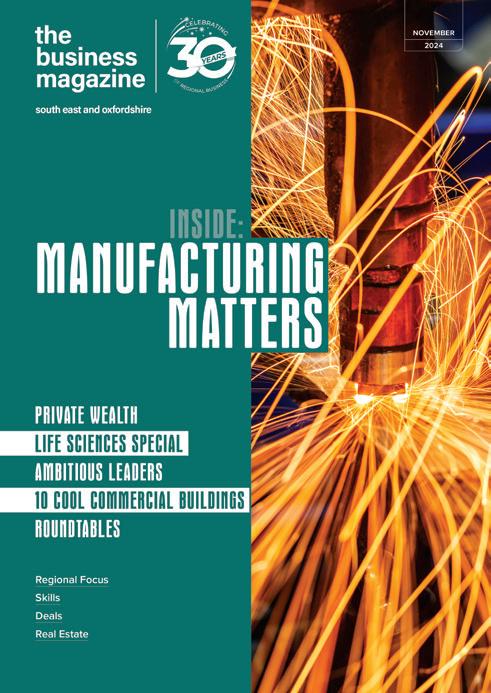


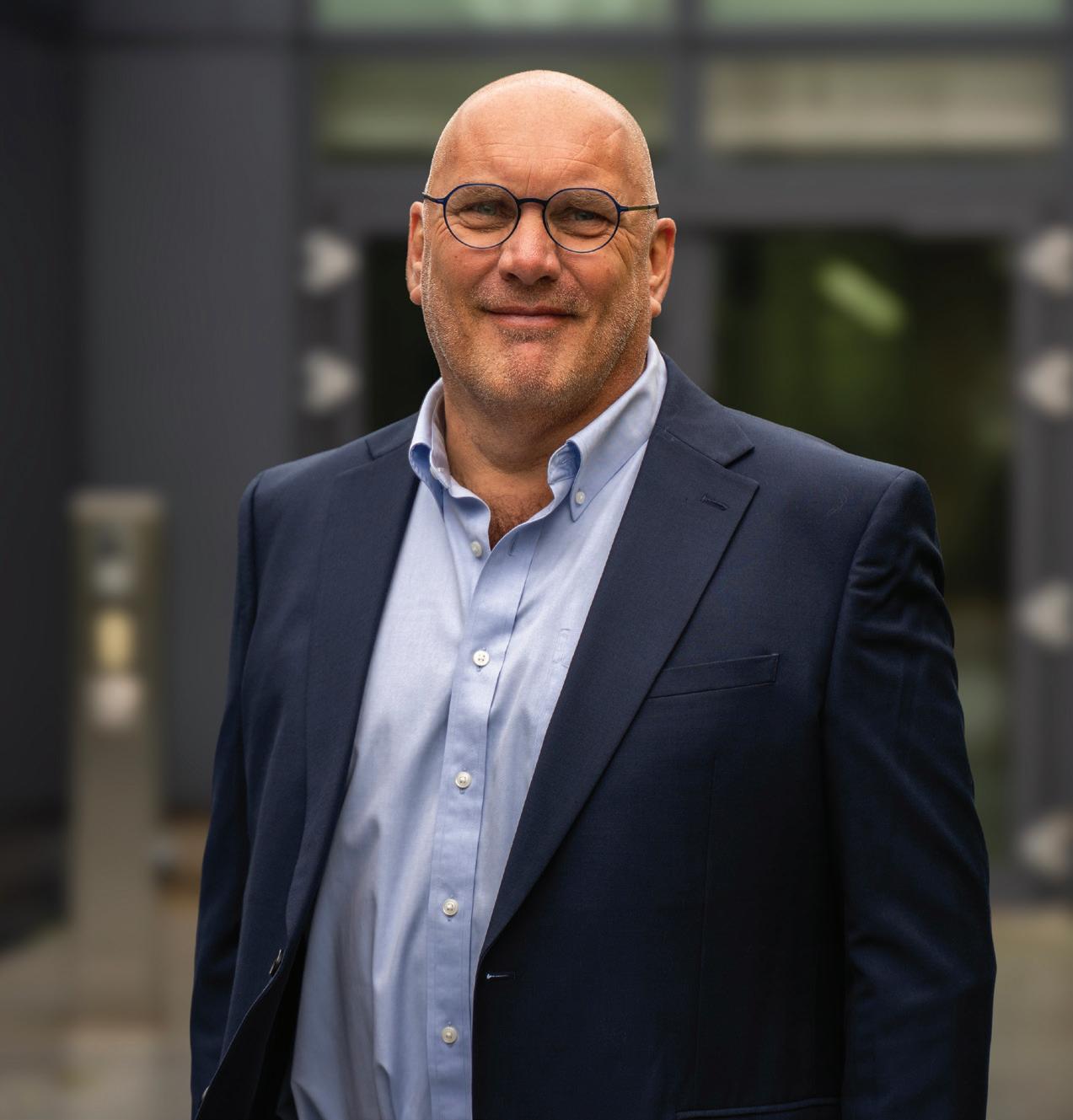




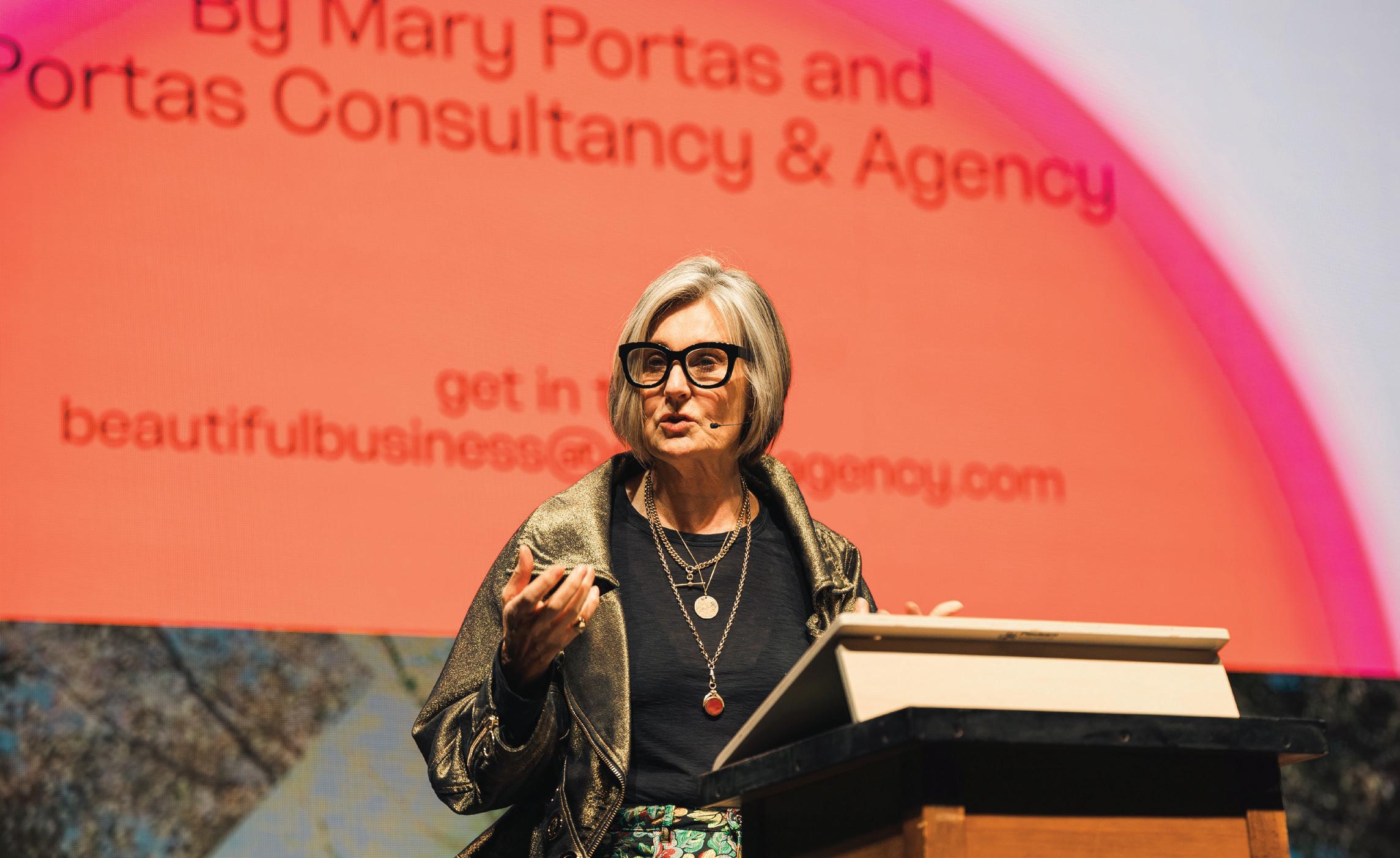
Ethical business needs to become “desirable and sexy as well as deeply trusted”, retail guru Mary Portas told the world’s largest ever gathering of 1,200 B Corps.
“That’s what makes beautiful business.”
The B Corp movement began in the USA in 2006, when friends Jay Coen Gilbert, Bart Houlahan and Andrew Cassoy shared a vision to make business a force for good. They founded B Lab, a nonprofit organisation that certifies businesses for their social and environmental impact.
Speaking on the first day of the inaugural Louder Than Words festival for UK BCorps held in Oxford, Mary said pre-owned items had grown desirable in part because charity shops were stealing the ideas of luxury brands.
She pointed out that while filming Queen of Shops for the BBC back in 2007,
the team were able to boost footfall by doing away with the word charity and making shops cool.
“We’re now seeing charity shop revenue surge 300 per cent faster than fast fashion,” she said.
“Owning pre-owned is becoming a badge of honour.”
She also warned business leaders against ethical grandstanding.
“Around the world, we’re concentrating much more on what divides us than what brings us together. But in business, taking the moral high ground doesn’t work.”
Other speakers for the event included Chris Turner, executive director of B Lab UK, and Anuradha Chugh, former managing director of ice cream giant Ben & Jerry’s, which tracks the carbon footprint of its ice cream (apparently a
single pint of Ben & Jerry’s produces about 3.4 lbs of carbon dioxide equivalent).
The company sets out how it plans to reduce its climate impact on its website.
Layla Moran, MP for Oxford West and Abingdon, said: “I’m delighted that B Lab chose Oxford as the location for its very first Louder Than Words festival.
“Oxford is known internationally for its contribution to academia, but it’s also a city focused on changing business for the better.
“A number of certified B Corps have their home here and are showing what’s possible when businesses are empowered to put people, the planet and profit on a more equal footing.”
There are a total of 256 B Corp registered companies based in the South East of England.

ss
Reading’s Altitude Angel has teamed up with Hampshire-based air traffic control services company NATS to launch a new initiative at Aberdeen International Airport.
The two firms have established a drone flight approval service to help operators more easily access airspace around the site.
Drone pilots wanting to fly in or through the flight restriction zone around the airport can now request access at the touch of a button.
Operators can submit flight plans online or via the Altitude Angel Drone Assist app, which are then reviewed, approved or amended by the air traffic control team in as little as a few minutes.
The service replaces a manual process that could sometimes take 14 days or more.
In September the Civil Aviation Authority published a plan that will see drones fly regularly and routinely beyond line of sight unlocking benefits across society.
This work builds on the regulator’s ambition for full integration of all airspace users in the skies above the UK.
The plan focuses on demonstrating beyond visual line of sight (BVLOS) activities by the end of this year and establishing routine BVLOS operations by 2027.
The Civil Aviation Authority’s delivery model is a key part to guarantee that BVLOS operations in the UK are run safely. This includes checking safety features in drone technology, comprehensive pilot training and enabling the sharing of the UK’s airspace safely.
The only way is up – Surrey researchers lead

Could vertical farming be the key to improving the UK’s food system?
This is the question behind a new research project led by the University of Surrey and backed by a £1.4 million grant from UK Research and Innovation.
Vertical farming is a method of growing crops in stacked layers, often indoors, using controlled environments.
Unlike traditional farming, it doesn’t rely on soil or natural sunlight, but instead uses soilless techniques and artificial lighting to create the best conditions for plant growth.
This allows crops to be grown yearround, regardless of weather conditions, and makes more efficient use of space and resources.
On the flip side, it also uses a lot of energy.
The Vertical Farming to Improve UK Food System Resilience project investigates how to improve the country’s supply of
nutritious leafy greens, essential for a healthy diet.
Dr Zoe Harris at the university’s Centre for Environment and Sustainability, said: “There’s been little in-depth analysis of the risks to our country’s leafy greens supply, nor a thorough examination of the benefits and trade-offs vertical farming could bring to the UK food system.”
The research team will work with farmers, industry, government and the local community to ensure the project focusses on real-life, immediate benefits.
Involved in the project are environmental and social scientists, as well as UK Urban AgriTech and five farm partners – Flex Farming, Innovation Agritech Group, Farm Urban, GrowPura, and LettUs Grow.
Dr Lada Timotijevic from the University of Surrey added: “We want to create tools that make it easy to see the impact of expanding vertical farming on considerations including food supply, land use and the environment, so we can make smart decisions for the future.”

An Indian multinational conglomerate, and co-owner of the Indian Premier League cricket team Delhi Capitals, has bought a majority stake in Hampshire Sport & Leisure Group, the company which owns Utilita Bowl, the home of Hampshire Cricket.
GMR Group (GGPL) plans to acquire all the company within the next two years and set up the venue for longterm growth and financial sustainability. Hampshire Cricket will become the first English club to join an international cricket group.
Rod Bransgrove, chair of Hampshire Sport & Leisure Holdings Group, said: “This is the fulfilment of a dream for me and, I hope, for all Hampshire Cricket supporters.
“Beyond our team’s accomplishments on the field over the past 24 years, we’ve transformed our stadium into a premier test match and events venue and one of the most exceptional cricket and leisure facilities in the country.
“We’ve also been pioneers in the development of women’s cricket and have consistently innovated throughout this relatively short history.
“After a thorough selection process, we believe GGPL is the perfect organisation with the right people to build on our proud legacy.”
The new owners hope to enhance the multi-sports and leisure facilities at Utilita Bowl, including the stadium, hotel and
golf course. They’ve also pledged to further cricket development of the teams.
Grandhi Kiran Kumar, corporate chair of GMR Group, said: “What initially attracted me to Hampshire was the way it was run by Rod, whose leadership ethos closely mirrors that of the GMR Group.
“I believe GGPL is in the best position to carry Rod’s legacy forward and continue building on the strong foundation he has established.
“With this acquisition, along with our investments in the US, Dubai and India, GMR is focused on engaging and connecting with the global youth.
“Our vision is to transform sports into a platform that unites people and cultures, drives global excellence and nurtures the creation of future world champions.”
Rod will continue as group chairman until at least September 2026, while David Mann will retain his role as CEO.
GMR Group operates across various sectors, including infrastructure, airports, power and sports, and supports initiatives in rural development, education, health and skills development.
The news has also been welcomed by the England and Wales Cricket Board. Richard Gould, Chief Executive Officer said: “This is an exciting time for Hampshire Cricket, and I’d like to welcome GGPL to cricket in England and Wales.”
Major players from the Buckinghamshire’s thriving space ecosystem gathered at Westcott Venture Park to celebrate successes and discuss the future of the industry.
The Westcott Showcase attracted more than 200 delegates.
Developments in rocket propulsion, sustainability in space and the fast-growing drone sector were showcased.
This year’s event was organised by Buckinghamshire Enterprise Zone, the county council and partners of the Westcott Space Cluster.
Visitors also witnessed the launch of Westcott Space Hub – funded by the UK Space Agency, Westcott Venture Park and Buckinghamshire Enterprise Zone – which will advance space research, manufacturing and testing.
The government considers the space sector as critical in meeting its wider goals, including becoming a science and technology superpower.
A UK Space Agency report estimates that the country’s space industry income was £17.5 billion in 2020-21. The space sector also provided an estimated 48,800 jobs while supporting an additional 78,000 jobs across the supply chain that year.


The UK manufacturing sector has been a major contributor to the success and wealth generation of the UK economy, global development and influence, for centuries, writes Richard Baker, Partner at national audit, tax, advisory and consulting firm Crowe.
As an island nation, the country’s forefathers, realised that with limited natural resources, to be a successful trading nation, and to provide sustainable income for the exchequer, the UK needed to add value by virtue of innovation, creativity, entrepreneurship and skilful hard work.
The vision and inspiration of the preVictorian enlightenment, driven by the likes of the Lunar Society, provided the building blocks for what became the ‘Industrial Revolution’ and created a string of manufacturing, agricultural and engineering successes of which examples continue and remain, throughout the globe.
British engineering and ingenuity and innovation has also played a key role in keeping the UK and the people of the world, safe, free, fed and watered and it continues to do so. In their 2024 report ‘The True Impact of UK Manufacturing’, Lloyds Bank, (working with Oxford Economics and the Manufacturing Technologies Association), identify that the sector is worth £518 billion to the UK economy (23.1% of GDP).
Despite its significance to the economy, 87% of the respondents to Crowe’s last manufacturing survey said the government support for the sector is inadequate.
Crowe teamed up with various industry figures earlier this year to answer this question and published a “Manifesto for Manufacturing” (www.crowe. com/uk/industries/manufacturing).
The manifesto is based on five pillars:
Skills and
• Strategic review, refocus of education engagement and provision with manufacturing.
• Overhaul the apprenticeship system and its funding processes, including introduction of a tax credit-based system and introduce training incentives for UK graduates.
• Supported graduate level study fees for (STEM) subjects.
• Reintroduction of enhanced Research and Development relief at 130% uplift for SMEs.
• Training and education measures to build UK cyber resilience and secure technology supply chains.
• Better communication of support and funding streams.
• Strategic financial support for manufacturing businesses to decarbonise as part of a single national strategy and assistance scheme.
• A reshoring initiative to provide funding and support for reshoring to the UK of products and components currently produced abroad.
• Carbon Border Adjustment Mechanism (CBAM) to protect ‘homegrown’ production.
• National standardisation of net zero and carbon neutral expectations and requirements.
Secure the UK’s supply chains
• Root and branch risk assessment covering supply chains and national infrastructure plans of UK steel production and technology dependent production processes.
• Public industry procurement process that favours UK suppliers as a point of preference.
• Utilisation and support of the SME supply chain.
Finance and investment
• Capital grants scheme to digitise manufacturing processes and support decarbonisation.
The Government has recently published its Industrial Strategy, “Invest 2035” which references advanced manufacturing as a key area of future growth. Fostering a pro-business environment and working in partnership are key principles. Whilst the messages are positive, time will tell what practical, real-life actions will arise from Invest 2035.
More discussion and commentary can be found in Crowe’s manifesto document which can be viewed here: www.crowe.com/uk/ industries/manufacturing.

If you would like to know more, please do get in touch with Richard Baker: richard.baker@crowe.co.uk www.crowe.co.uk
The UK could be losing its standing among the world’s top manufacturing nations. How can we get back on track?
By Daniel Face, senior reporter
UK manufacturing has been hit with a wakeup call.
The latest analysis from Make UK, the membership organisation which represents manufacturers across the UK, shows the country has fallen from eighth to 12th place among the world’s leading manufacturers, with an industry output of £217 billion.
Now ahead of the UK are Taiwan, which continues to enjoy high demand for its topof-the-range semiconductors; Russia, with an ever-growing defence sector to maintain its war in Ukraine, and Mexico, a big climber this year thanks to a thriving automotive, aviation and aerospace ecosystem.
Could it be that manufacturing simply isn’t as crucial to the national economy as it always has been? Not according to the data.
This April, big industry names from across the country gathered in Birmingham for MACH 2024, the UK’s national exhibition for engineering and manufacturing.
It was there that event host MTA – the Manufacturing Technologies Association – unveiled its new report, The True Impact of UK Manufacturing, in collaboration with analysts at Oxford Economics.
The paper broadens the scope offered by Make UK, placing the real value of manufacturing to the UK economy closer to £518 billion. That works out to be around 23 per cent of GDP.
It goes on to identify that “making things” accounts for more than a third of all UK goods and services exports, directly supporting 7.3 million domestic jobs.
If manufacturing does in fact prop up almost a quarter of the national economy, this latest stumble in the world rankings should be all the more alarming.
What’s to blame? We can roll out the usual suspects of the past few years – inflationary headwinds, supply chain

issues stemming from global conflicts, the lingering impact of the pandemic on any manufacturer that wasn’t churning out vaccines.
And even many of those are now having to make a stark pivot. Just look at AstraZeneca collaborator OXB – formerly Oxford Biomedica – which, having been one of the UK’s biggest manufacturers of the Covid-19 vaccine, is settling into a new identity as a cell and gene therapy contractor.
Evidently, though, other nations have weathered those storms better than our own. It might help that the government has just launched a green paper on its proposed Industrial Strategy, which puts advanced manufacturing at the top of its eight focus areas.
The other focus areas include clean energy, the creative industries, defence, digital technologies, financial services, life sciences, and professional and business services.


“... industry is a far greater contributor to GDP and jobs than listed in national accounts”
What unique challenges has the UK faced? The big one is of course Brexit, which has burdened businesses with higher import and export tariffs, delayed key investment decisions and squeezed the skilled labour market.
But most in the industry would agree that all these issues combined could have been better navigated given a confident, consistent plan from Westminster.
“Every other major economy, from Germany to China to the US, has a long-term national industrial plan,” says Stephen Phipson, head of Make UK.
“Even Barbados has one. As such, the UK is an outlier.”
Johnathan Dudley, head of manufacturing at national accountants Crowe, says: “In our latest annual manufacturing survey, which we use to gauge the temperature of the sector, our key findings reveal that 68 per cent of businesses in the sector are expecting a growth in sales this year despite global turbulence and difficult economic conditions, but 87 per cent of manufacturers are unhappy with the government support.
Much has been made of Labour’s “first mission in government” to achieve the highest sustained economic growth of all the G7 nations. And while the Office for National Statistics suggests this has been
the case at least for the first half of 2024, it remains doubtful whether that momentum can be maintained over the coming years.
Meanwhile, here is a key industry crying out for support and investment. If that’s what the new government is able to provide, it could help turn a wishful manifesto pledge into a realistic vision.
Johnathan adds: “Manufacturing in the UK still contributes one fifth of the country’s GDP and continues to grow.
“At Crowe we recognise the importance of manufacturing to the UK in keeping our country competitive. Our manifesto, published ahead of the Summer election, provides a blueprint for the government which drives innovation, job creation and decarbonisation of the economy, securing the industry and the country’s long-term prosperity.
“UK manufacturing has a global reputation for innovation, creativity and excellence,” he continued. “We invest in supporting this and urge the new government to work with us, and the manufacturing sector as a whole, to produce their promised strategy.”
Before the election, Labour put forward a four-pronged industrial strategy: to deliver clean power by 2030, ‘care for the future’ (opportunities here for health and care manufacturers), harness data for public good (think artificial intelligence and datadriven supply chain management) and build a resilient economy.

Four months on, while it has introduced its industrial strategy green paper, there have been no big spending promises directed squarely at manufacturing (unless the chancellor pulls something out of the bag in the budget, which happens after this magazine goes to print).
We’ve seen nothing so far to match, for example, the scale of the Inflation Reduction Act in the US – a move which has seen billions of dollars invested in clean energy manufacturers.
Across the manufacturing industry, from large companies to small and mediumsized enterprises, there are calls for the government to make its vision clear. Only then will they begin to commit to making the investments they need to grow.
Now comes a make-or-break moment. The worst the new government can do is nothing, leaving the industry underfunded, under-skilled and without direction.
But listen to the needs of manufacturers, act accordingly, and there’s no reason why the UK can’t regain its standing among the world’s best.


A government with a potential new strategy – whose is it to execute?
As things stand, the job falls to the minister for industry, a role encompassing the departments for both business and trade and for energy security and net zero.
Manufacturing is therefore just one of many concerns for the new incumbent Sarah Jones, whose responsibilities also span retail, hospitality and professional services, to name a few.
The industry has already made clear it feels neglected under the current arrangement. The latest Manufacturing Outlook Report from Crowe found that nine in 10 manufacturers were unhappy with the current level of government support.
For them, a strategy alone won’t suffice. They need someone fighting their corner to see it through to fruition.
Johnathan Dudley says: “It’s high time that a dedicated minister for manufacturing was established to unlock the sector’s potential.
“We want them to understand what we are hearing from our regular engagement with the manufacturing sector through our surveys and roundtable events which give us the insight to lobby government on the sector’s behalf. They can light the fuse of a new industrial revolution in

the UK by aligning innovation, economic development and education, and support nearly a million green jobs to help get this country making, building and adding value again.”
Growth ambitions will be driven over the coming years by major carbon capture projects and new battery gigafactories, spearheaded no doubt by some of the biggest global players in the industry –think Tata and Japan’s AESC Group.
But a dedicated minister wouldn’t just push flashy initiatives. They’d also be a key voice for the UK’s 260,000-plus small and medium-sized domestic manufacturers.
“We need a hero within the corridors of power,” adds Andrea Wilson, an SME director and longtime advocate for a ‘manufacturing champion’.
“Government policy is most often informed by original equipment manufacturers (OEMs), large businesses or career civil servants.
“As a result, we see decisions made, policies implemented, and support offered – the majority of which are not fit for purpose for the SME community.
“Listening to SME business prior to deciding what will help them will save this and future governments billions in wasted, over-administered and underutilised support.”
After a disappointing performance last year, the latest data suggests the industry could finally be turning a corner.
The S&P Global UK Manufacturing PMI (purchasing managers’ index) hit a 26-month high in August at 52.5.
This comes even as export orders fall for the 31st consecutive month, which has been put down to weaker demand from Europe and a slowdown in mainland China.
Rather, the domestic market has been leading the charge, as output, new orders and employment all picked up.
Large-scale producers have been particularly busy hiring, while small firms saw a mild increase in jobs and medium-sized companies made cuts.
“The upturn is broad-based across manufacturing,” said Rob Dobson of S&P Global Market Intelligence, “with the investment goods sector the standout performer.”


While it battles mounting losses and slow revenue growth, Reaction Engines hopes that its financial woes won’t stop the trialling of its heat exchanger technology on British naval vessels and in American industry.
In partnership with BAE Systems, the Oxfordshire firm will investigate how these systems could help achieve environmental improvements and operational benefits for the Royal Navy through waste heat recovery and exhaust cooling.
Its lightweight heat exchangers can be integrated alongside a ship’s existing diesel engines and gas turbine propulsion systems, as well as next-generation hydrogen and hybrid electric alternatives.
They’re also suitable for other defence applications in the air and on the ground.
Reaction Engines recently attracted the attention of the US Department of Energy, which has appointed the company alongside Ohio’s Echogen Power Systems on a $3 million three-year project to help decarbonise industrial processes across the US.
Together, they’ll develop a pilot-scale heat pump capable of heating air to more than 300C from ambient temperatures using supercritical (highly compressed) CO2.
This technology has the potential to reduce lifecycle carbon emissions by more than 90 per cent and energy intensity by more than 50 per cent relative to natural gas-fired heaters.
According to media reports, as we go to print Reaction Engines is in talks to secure a cash injection from overseas investors.
Banbury-based motorsport manufacturer Prodrive showcased its latest innovation, an electric quadricycle for last-mile urban deliveries, at Cenex Expo this September.
Built as part of a joint venture with Astheimer Design in Warwick, EVOLV is just 3.2 metres long and 1.4 metres wide, but offers a load capacity of four square metres to rival mid-size vans.
“EVOLV demonstrates how our collective innovative design and engineering can push the boundaries of what a last-mile EV can achieve,” said Dr Iain Roche, CEO of Prodrive.
“A compact footprint can go hand in hand with serious capability and efficiency.
G3 Systems in Portland, Dorset has been appointed to deliver a further six mobile roller brake testing (MRBT) systems for the Ministry of Defence (MOD).
The contract comes as part of the MOD’s Project Amphora, an initiative aiming to provide support for multiple containerised deployable systems that are critical to military operations.
G3 Systems was first contracted to deliver 12 MRBTs in 2018. This latest batch is due for delivery by next March.
The company will ensure that the systems can be made fully operational by two trained operators in under two hours from deployment, and ready to move in less than an hour.
Nick Rose, managing director at G3 Systems, said: “We’re delighted to be supporting the MOD again under Project Amphora.
“This is an excellent way to leverage our expertise in providing agile and effective solutions, ensuring that the military can rely on robust infrastructure even in the most demanding environments.”

“EVOLV offers the best of both worlds, injecting versatility without compromise into a logistics fleet.
“Together with Astheimer, we’ve assembled a talented team comprising logistics specialists, designers and engineers to identify, solve and deliver solutions that will make a difference to this segment.”
For more about these so-called ‘tuk-tuks of the Western world’, see our front-cover feature on The Future of Automotive in the September 2004 issue of The Business Magazine.

After quickly selling out the first editions of its Bentley Blower Jnr –an 85 per cent scale recreation of the iconic British racer – Hedley Studios has now launched a configurator to help customers personalise their own designs for the car.
Hedley Studios designs and builds what it describes as “automotive art pieces”.
Almost everything is customisable, says the Bicester business, from colourways and interior trims to tonneau covers and specific race numbers.
There are also six curated packs available, including “The Black Pack” – harking back to Woolf Barnato’s famous race against the Blue Train – and “The Grey Pack”, which pays tribute to the Speed Six that took victory at Le Mans in 1929 and 1930.

A total of 250 configurable models are available, taking the production run of the Bentley Blower Jnr to 349 worldwide.
“Since we launched the Bentley Blower Jnr last year, its reception has blown us away,” said copany founder and Ben Hedley.
“With all first editions sold out, we’re excited to launch the configurable options for the Blower Jnr.
“Craftsmanship lies at the heart of what we do, and giving clients the opportunity to curate their very own Bentley Blower Jnr through our online configurator provides a wonderful route into owning a slice of history, but with a very personal touch.
“Each configured pack we have on offer bears its own unique story and provenance, celebrating the great seminal moments and creations of the legendary Bentley brand.”
Manufacturers in the South East have enjoyed slow and steady growth in recent months – but business leaders are hoping for a major boost.
These are the findings of the latest Manufacturing Outlook from Make UK and BDO.
Almost six in 10 companies surveyed believe the recent change in government will produce better economic growth overall for the coming year. In contrast, just six per cent expect GDP to decline.
Balance on output in the South East is forecast to jump from +8 to +59 per cent in the next quarter, which compares
favourably to the more muted national picture.
Total orders are also expected to rise from +33 per cent to +60 per cent, backed by strong recruitment intentions from companies over the coming months.
“This is a very positive set of results which reflects the boost to stability provided by the new government,” said Keri-Anne Mruk, region director for the South East at Make UK.
“We now need to see this momentum maintained with investment in major infrastructure projects which will provide a long-term return for the economy overall.”
Matthew Sewell, head of manufacturing for BDO in Southampton, echoed this sentiment.
“Manufacturers across Southampton and the wider South East region are hopeful that a period of greater political stability will provide a better economic outlook ahead, and that in turn is boosting business confidence.
“All eyes are on the government’s next steps.
“We need an industrial strategy that is fit for purpose to ensure that the confidence firms currently have in future economic prospects is not misplaced.”


The company unveiled its new Oxford headquarters this September – “a symbol of our long-term vision”, says CEO Bruno Even
At the very far end of Oxford Airport, down a long road, Airbus Helicopters has been quietly working away on its new UK home.
The facility was originally confirmed in May 2022 while the pandemic stalled construction.
But now it’s here, and it’s big – 125,000 sq ft with eight landing pads and capacity for 32 helicopters at a time.
If there’s a silver lining to the delay, it’s that 2024 marks half a century since the company’s inception.
“Fifty years ago, a new business was created in the UK, not far from Heathrow,” CEO Bruno Even told visitors.
“It was called McAlpine Helicopters, founded by Kenneth McAlpine – grandson of the famous British industrialist Sir Robert McAlpine.
“What was then Aerospatiale noticed McAlpine’s high performance, and in 1993 took a 10 per cent stake before fully acquiring it in 2007.

“By then it was Eurocopter, and today of course we are Airbus Helicopters.”
The company has since swapped Heathrow Airport for Oxford, where it had grown to occupy a mishmash of 1940s hangars and offices.
One of the core aims of the move was to consolidate its various operations under one roof.
Although the helicopters are built at Airbus plants in Germany and France, Bruno was keen to stress that the UK is very much a “home country” for the global business.
Its 250 staff in Oxford are responsible for retrofits and completions on models arriving from the continent, as well as maintenance, repair and overhaul for civil and military clients alike. The new HQ even has its own design office.


Another key focus is on training. Almost 200 technical apprentices have learned the ropes at Airbus Helicopters’ Oxford base over the years – but with more classrooms and simulators, it should now be able to cater to larger cohorts.
The facility also houses a dedicated training workshop for engineers, complete with stripped-down parts from scrapped Airbus craft.
Nor does the training stop at their own employees.
“Today, all UK military pilots and rear crews learn their military flying on Airbus helicopters,” said Bruno.
“That’s because we provide and support the fleet of 36 Junos and Jupiters in the Military Flight Training System.
“It’s a great responsibility to support the next generation of military aviators.
“And in the air ambulance sector, we provide two-thirds of the UK’s fleet. Putting all this together with our private, business and utility customers, we’re supplying about half of all the turbine helicopters in the UK.”
Among the many models showcased was a new H135, due for delivery to London Air Ambulance later that day.
A lightweight twin-engine rotorcraft, the H135 has been deployed in more than 60 countries, having flown a combined seven million hours.
It was this that caught the eye of the Prince of Wales – a patron of the lifesaving charity and himself a former RAF helicopter pilot – as he paid a surprise visit to Airbus just days after telling Welsh Air Ambulance crews he’d love to get back in the skies.
Also on display was a decidedly unhelicopter-like innovation, the Flexrotor – a tactical unmanned aircraft system with vertical take-off and landing capabilities.
Bearing a maximum take-off weight of 25kg, the craft is designed for land and sea-based military operations and can
withstand extreme conditions from desert heat to Arctic cold.
With a new facility also comes modern sustainability standards.
The building is kitted out with energyefficient lighting and heating, and as such generates 50 per cent lower carbon emissions than the company’s previous base.
Airbus Helicopters has also committed to make full use of the sustainable aviation fuel available at the airport.
This is now produced on site by fellow occupier OXCCU at its OX1 demonstration plant.
“This £55 million investment underlines our commitment to growing our presence in the UK,” Bruno concluded, “where we will continue to serve both civil and governmental customers.
“The new building is a vastly improved working environment, both inside for our technical workforce and outside for flight operations.
“We have more space with better equipment, and we look forward to higher productivity as a result.”



Polystyrene foam (you may know it as Styrofoam) has long been the go-to option for manufacturers looking to package delicate electronics, glass, luxury products – anything they’d prefer not to shatter in transit.
But the tide is turning. In April 2022, the UK government imposed a tax of more than £200 per tonne on plastic packaging that doesn’t contain at least 30 per cent recycled plastic.
That’s not to mention growing consumer consciousness not just about the products we buy, but how they’re shipped to us, and where those endless mountains of foam wotsits end up.
As such, more and more businesses have sprung up in recent years offering eco-friendly alternatives like corrugated cardboard and finely shredded ‘wood wool’.
Among them was a once small Surrey start-up with a rather different approach.
Founded in 2019, the Magical Mushroom Company has built a thriving international operation out of the very soil itself.
The company works with mycelium – a sprawling underground network of thin fungal strands which can bear fruit on the surface in the form of mushrooms.
Mycelium contains a natural substance, chitin, which is perfect for packaging. Not only does it serve as a natural binding glue, but it’s also water-resistant and flame retardant.
To this, its technicians add an agricultural byproduct – usually hemp, which locks in carbon dioxide, but often wheat or sawdust – before leaving the mixture in a shaped mould to grow.
The process is surprisingly quick. Within just a week’s time, the packaging is kiln dried and ready to go.
Once the customer has received the product, they have plenty of options to dispose of the fungal casing, which is 100 per cent biodigestible.
That means it can be crumbled down into small pieces and left to decompose in the garden or compost heap over the course of around a month and a half.
The Magical Mushroom Company has worked with a radiator manufacturer, luxury ice cream brand, candle-makers, and – fittingly – a couple of mushroom supplements businesses.
That’s not to mention Dorset’s own cosmetics giant, LUSH.
It begins by establishing a client’s design requirements, before the in-house prototyping and product testing teams take over.
Testing can be as rigorous as the client requires. Many are shipping premium, expensive goods – others, like Hampshire’s Raymarine, fragile electronic equipment.

After use, mushroom packaging can be crumbled up and added to compost
Once moulded and dried, prototypes are dropped, crushed and shaken about to ensure they’ll hold up during transit. Temperature and humidity tests are also particularly important for perishables.
The company still retains its headquarters in Esher, Surrey, but has also opened two facilities in Nottingham and another in Bulgaria – ramping up production to 200,000 units a week.
In 2022, it closed a £3 million seed funding round led by fellow mycelial materials firm Ecovative Design and with participation from Dale Vince, founder of Ecotricity.
The team are now looking to break into the American market, having secured their first US client in online superstore WineDirect and drawn up plans for the Magical Mushroom Company’s first stateside factory.


Instead of wasting hundreds of thousands of pounds and several years on implementing a traditional ERP, manufacturing SMEs from the UK have found a solution that costs a tiny fraction of that and takes just weeks to set up.
MRPeasy is a manufacturing resource planning system designed specifically for small and medium-sized companies. This focus on SME manufacturing already sets it apart from others on the market that started as accounting or inventory tools or as offshoots of huge ERPs like SAP. But the real difference lies in its cost and user-friendliness.
Andy Nancollis, CTO of Motion Impossible, a camera dolly systems manufacturer from Bristol, highlights the price of the software: “The cost was a big factor—most ERP systems are big and quite expensive, so MRPeasy stood out from the start. While very affordable, it still manages to offer everything we need, with plenty of room for us to grow into the software. This seems to be unique to MRPeasy.”
For some, the transition to MRPeasy was a refreshing change from more complex systems. Suzanne Boak, Production Manager at Splosh, a cleaning product manufacturer in Wales, compares it to Netsuite: “Netsuite was a behemoth and quite difficult to work with. MRPeasy feels like a breeze. It’s intuitive and simple. There’s no fear that you’re going to press something and the whole thing’s going to explode.”
People also appreciate the ease of setup and practical support. “I set MRPeasy up myself, and it was that easy,” says Ralph Jones, Director at Britannia 2000 Holdings, a surveillance technology manufacturer from Windsor. “The online help has been really quick to respond to any issues.”

The right functionality for every industry
MRPeasy offers the necessary functionality for a diverse range of industries. This includes everything from food and chemicals to electronics and precision engineering.
For A Wrate Engineering, a precision engineering company in London, MRPeasy has been transformative. “It is 1,000 percent better than what we were previously using. I love it. We now have all the information in one place,” says Lee Brien, Director of Operations. “All you need to find is just one click away, which saves a huge amount of time.”
Cantium Scientific, an air quality test systems manufacturer from Norfolk, considers MRPeasy an essential part of their business. “It helps us stay on track with customers in 50 countries. It’s the framework for how we manage things,” says Managing Director Stephen Plumridge.
Alistair Watson, Managing Director of Stakam, a chemical manufacturing company from Arbroath, Scotland, says: “I feel like we struck gold with MRPeasy. It’s become such an asset that I often grapple between wanting to keep it as our secret weapon and the desire to showcase our robust systems.”
The praises across sectors echo a common theme: MRPeasy delivers a high level of functionality at a fraction of the cost of traditional ERP systems, making it the ideal choice for SME manufacturers.
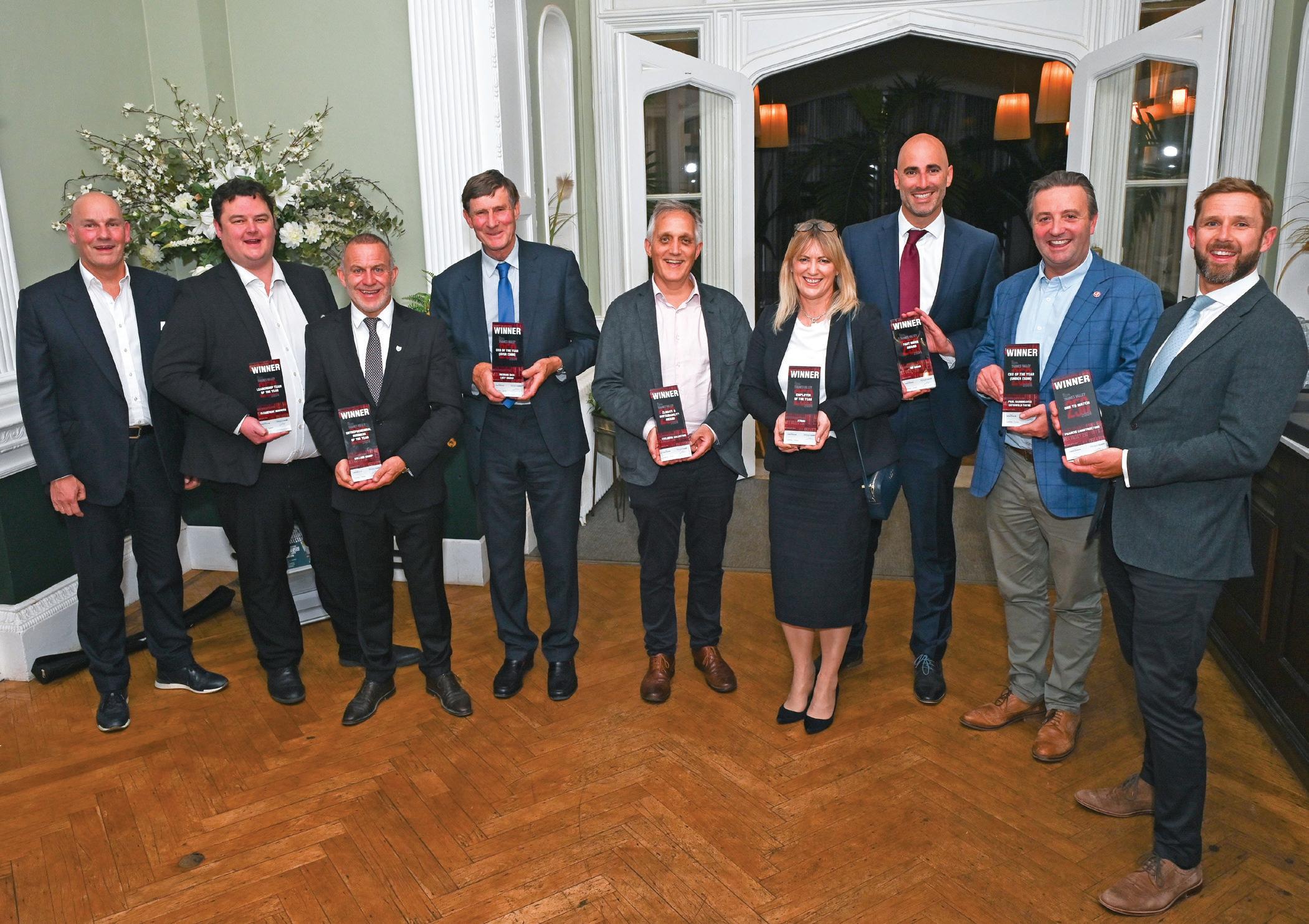
A celebration of the best of the Thames Valley 250’s businesses has highlighted the strength and depth of talent across the region.
The Thames Valley 250 comprises the top privately-owned businesses (by turnover) headquartered in the region, defined as Oxfordshire, Berkshire, West Surrey, North Hampshire and parts of Buckinghamshire.
Gateley Legal, Morgan Lovell, Verlingue and Blue Peak Consulting sponsored the TV250 this year. The 14th annual awards event was held at Easthampstead Park, Wokingham.
Richard Thompson, Chief Executive of The Business Magazine, which compiles the ranking, noted that this year’s TV250 employs more than 144,000 people and generates a turnover of almost £35 billion.
“The companies making up the TV250 have achieved 18% year-on-year growth in turnover,” he said.


Guest speaker Jacob Leone, Investment Director at private equity firm LDC, provided insights into private equity funding. LDC typically invests £10-£50 million in mid-sized businesses. The firm has been operating in the Thames Valley for 20 years and has provided £600m of funding in the region over the past 12 months.
Jacob highlighted some key reasons for accessing private equity, including business owners looking to exit and management teams seeking to buy into their business. He also covered the pros and cons of this type of funding.
“On the positive side, private equity firms offer strategic support and advice as well as providing capital. We can help professionalise businesses to continue their growth journeys. On the negative side, it’s a more expensive form of capital than taking on debt,” he said.





CEO OF THE YEAR (UNDER £50M)
WINNER: Paul Hargreaves – Cotswold Fayre
FINALISTS: Will Barrett – Francis Construction • Justin Brinklow – Ontime Automotive • Neil Pizzey – Amazon Filters • Anthony Young – Bridewell
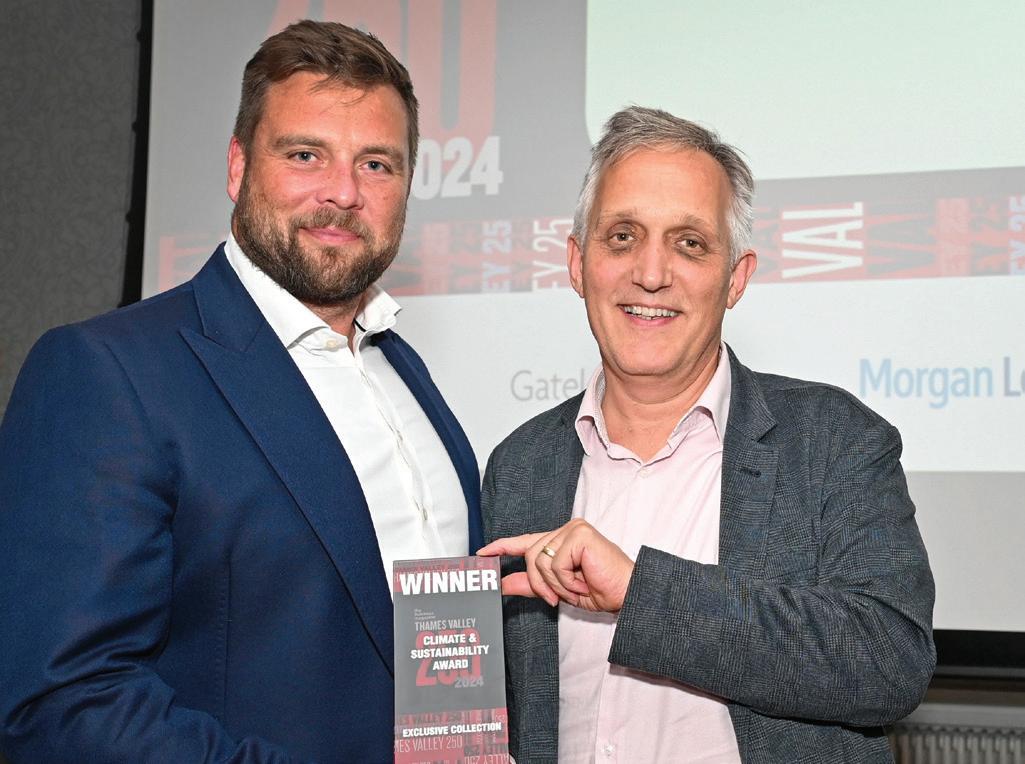
CLIMATE & SUSTAINABILITY AWARD
WINNER: Exclusive Collection
FINALISTS: Cotswold Fayre • Roc Technologies • Westcoast • Whistl



CEO OF THE YEAR (OVER £50M)
WINNER: Richard Dick – Lucy Group
FINALISTS: Rob Collard – Collard Group • Martin Dodd – Huntswood CTC • John O’Hanlon –Waylands • Bashir Parkar – BAP Pharma


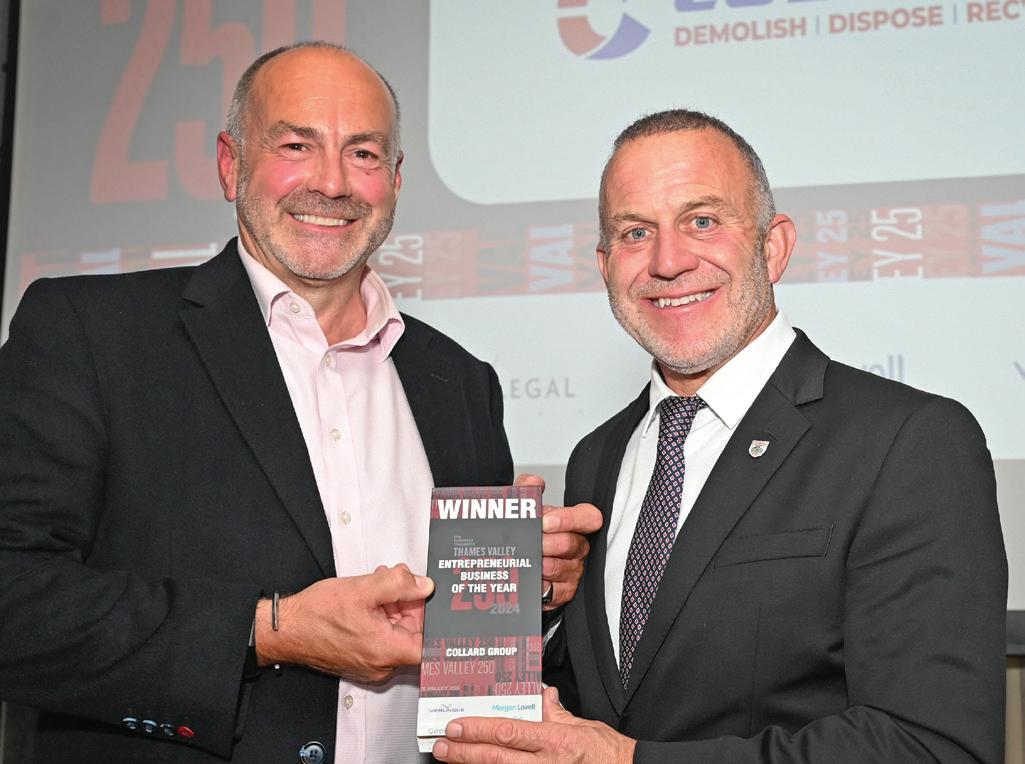
ENTREPRENEURIAL BUSINESS OF THE YEAR
WINNER: Collard Group
FINALISTS: BAP Pharma • Cotswold Fayre • Lucy Group • Roc Technologies

FAST RISER OF THE YEAR
WINNER: RH Amar
FINALISTS: Amazon Filters • Bridewell • Francis Construction • Waylands




LEADERSHIP TEAM OF THE YEAR
WINNER: CleanEvent Services
FINALISTS: BAP Pharma • CV-Library • Roc Technologies • Waylands


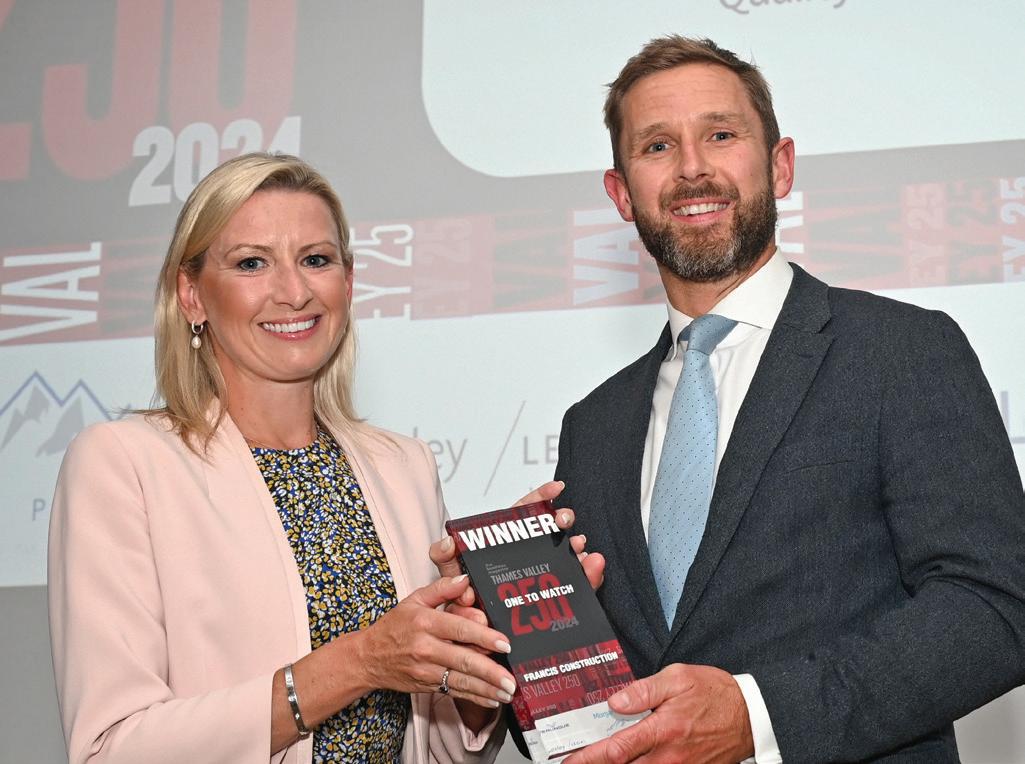
ONE TO WATCH
WINNER: Francis Construction
FINALISTS: Bridewell • Cotswold Fayre • RH Amar • Waylands


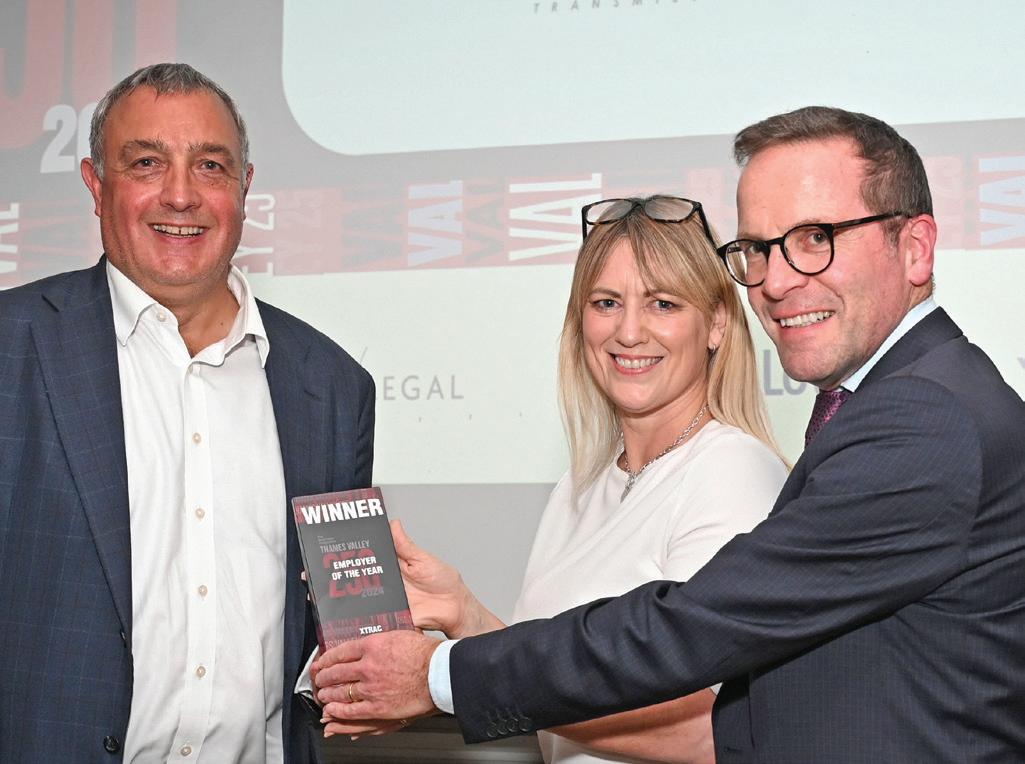
EMPLOYER OF THE YEAR
WINNER: Xtrac
FINALISTS: AND Digital • CleanEvent Services • Collard Group • RH Amar • Roc Technologies • Whistl

TO READ MORE ABOUT THE WINNERS SCAN THE QR CODE


632,756 UK businesses are in ‘significant’ financial distress, up 5.1 per cent on the prior quarter (Q2 2024: 601,950) and 32.3 per cent higher than Q3 2023 (478,176)
Significant’ financial distress increased in 21 of the 22 sectors covered by Red Flag Alert in Q3 2024 versus Q2 2024
In Q3 2024 ‘significant’ financial distress rose particularly rapidly in Utilities (+19.3 per cent), Food & Drug Retailers (+10.4 per cent), Financial Services (+9.94 per cent) and Bars & Restaurants (+8.7 per cent)
The number of businesses in ‘critical’ financial distress fell quarter on quarter by 23.2 per cent to 31,201 in Q3 2024 (Q2 2024: 40,613), 17.3 per cent lower than Q3 2023 (37,772)
This trend was seen in the Hotels & Accommodation (-33.5 per cent), Construction (-28.5 per cent) and Real Estate & Property Services sectors (-26.5 per cent), in particular, with all experiencing a reduction in ‘critical’ financial distress versus Q2 2024.
The sectors experiencing the highest numbers of companies in ‘critical’ financial distress were Support Services (4,860), Construction (4,324) and Real Estate & Property Services (4,099).

The latest “Red Flag Alert” research from leading UK advisory firm Begbies Traynor, which has provided a snapshot of British corporate health for almost two decades, highlights the challenging conditions UK businesses continue to face, with the number of companies facing ‘significant’ financial distress up around five per cent in Q3 2024 to 632,756 businesses (Q2 2024: 601,950).
The steady increase in companies experiencing ‘significant’ financial distress was driven by noticeable increases in distress in the Utilities (+19.3 per cent), Food & Drug Retailers (+10.4 per cent), Financial Services (+9.94 per cent) and Bars & Restaurants (+8.7 per cent) sectors.
With 21 of the 22 sectors monitored by Red Flag Alert reporting the level of ‘significant’ financial distress increasing in Q3 2024 versus the prior quarter, the latest data highlights how the heightened level of economic uncertainty is impacting businesses in almost every corner of the economy across the UK and pushing another 30,000 companies into financial distress.
Julie Palmer, Partner at Begbies Traynor, said: “With the end of the year now in sight, many British companies must be looking ahead to the finish line with a cautious degree of optimism for what 2025 has to offer after a difficult year. So far 2024 has
been hard to navigate for companies and the final quarter looks no different as a high degree of uncertainty weighs on the UK economy.
“With over 630,000 firms now in significant financial distress, more than thirty per cent higher than this time last year, no section of the country’s economy is immune from the legacy debt built up by many businesses during the pandemic.
“It is also apparent that the toxic effect of high inflation is still filtering down to businesses. The construction sector in particular continues to struggle with the legacy of high materials and labour inflation which have led to some highprofile insolvencies recently. This is a trend that I expect to continue, and I do not believe ISG will be the only major casualty in this sector with the domino effect likely to hit the sub-contractor community in due course.
“For some, the prospect of a change of government was viewed as a potential catalyst for a much-needed economic boost, but there are significant concerns surrounding what the next Budget might hold for the economy and the knockon effect could be damaging for many businesses teetering on the edge of collapse, as it seems certain many will have to deal with higher employee-related taxes.

Ric Traynor, Executive Chairman of Begbies Traynor, added: “As we move into the final quarter of 2024, the decline we have seen in ‘critical’ financial distress is a welcome surprise after a challenging year. That said, it is too early to say if this is a trend that will continue into the autumn – traditionally a busy period for corporate insolvencies.
“The government’s Employment Rights Bill could make it more difficult and more expensive to employ staff.
“Companies must also contend with geopolitical risks that could derail any domestic policy, including conflict in the Middle East, which could at the very least result in a spike in energy prices and bring back the spectre of high inflation. Added to this is the upcoming election in the US, which has the potential to impact both foreign and economic policy.
“Against this backdrop, the only certainty is uncertainty, and we know this is bad for both business and investment alike. It is clear that the UK economy is far from being out of the woods.”
Begbies Traynor’s Red Flag Alert has been measuring and reporting corporate financial distress since 2004. It has become a benchmark on the underlying health of companies across every sector and region of the UK.
Red Flag Alert’s algorithm measures corporate distress signals, drawing on company accounts and factual, legal and financial data from a wide range of relevant sources, including intelligence from the UK’s leading insolvency business, Begbies Traynor.
Companies are measured against a new scorecard of indicators to give greater insight and accuracy into the health of businesses. Two years of work by data scientists analysing eight years of data, taking into consideration pre, during and post-pandemic insights to find signals and patterns indicating businesses in distress, combined with AI tools, means that Red Flag Alert aims soon to be able to predict how many companies in trouble will go on to fail.

Beans Coffee Club distributes 130 different roasts from more than 20 suppliers

Beans Coffee Club has secured a £100,000 loan via the Thames Valley Berkshire funding escalator to scale up its business.
Based in Bracknell, Beans runs an online platform connecting coffee enthusiasts with more than 20 independent UK roasters.
It runs a subscription service personalising selections based on individual preferences. Unlike typical single-roaster subscriptions, Beans provides customers with access to 130 different coffees.
This latest loan, provided by equity investor The FSE Group, will enable the business to hire a new marketing expert and begin approaching agencies as it looks to build brand visibility and cash in on the growing popularity of homebrewed, cafe-quality coffee.
Fiona Jones launched Beans Coffee Club alongside husband Richard in 2019. They successfully pitched to the Dragons on BBC’S Dragon’s Den last year, bagging a £50,000 investment.
“As a relatively early-stage business, there are limited options to raise funding from mainstream finance providers,” she said.
“We’re delighted to be working with The FSE Group. Their support will help us reach new customers and continue to promote the incredible work of independent UK roasters.”
Beans Coffee Club has shown strong growth since its inception.
Annual sales have almost tripled since 2022, and the company is looking to
achieve five times this over the next three years.
The team believe their focus on sustainability and fair pricing for roasters and farmers will resonate with a growing number of coffee lovers looking for ethical, high-quality products.
Paul Smith, investment manager at The FSE Group, added: “Beans Coffee Club has demonstrated a proven and scalable business model with impressive year-onyear growth.
The new hires and marketing partnerships funded by this loan will be critical to delivering their ambitious growth plans.
“We’re excited to support such a driven and innovative team.”
Mechanical and electrical engineering firm Campbell West is celebrating significant growth over the past 12 months.
The Bracknell business posted revenues of £10 million – up 54 per cent on the previous year – and is aiming for £13 million next year.
A highlight was securing a £6 million project to deliver building services infrastructure for the new ophthalmology department alongside refurbishments at Ashford and St Peter’s Hospitals NHS Foundation Trust in Surrey.
The company has also welcomed seven new team members, including estimators, a quantity surveyor, financial assistants and project managers.
“While market conditions have improved, much of our success is due to our motivated, self-driven team working to deliver high-quality service to our clients,” said co-owner Steven Campbell.
“The fact that we’re able to offer a single point of contact to clients for mechanical and electrical services has also set us apart from others.
“We’ve restructured the business and enhanced expertise by investing in training and development. This has enabled us to take on larger projects, which has bolstered our revenue.”
Steven founded the company in 2017 with Daniel West, whom he met while working as an apprentice.
With an initial focus on the healthcare sector, Campbell West has expanded into local government, education, data centres, workspaces, industrial buildings and large residential projects.

A Reading-based med-tech Occuity has achieved CE marking for its PM1 pachymeter device, paving the way for sales in Europe and beyond.
The PM1 can measure an eye’s corneal thickness in just a few seconds, allowing for fast and safe diagnosis of glaucoma.
It’s the world’s first handheld, non-contact optical pachymeter.
CE marking is a European safety standard which validates the safety, efficacy and environmental standards of the PM1.
Having built a strong global distribution network, the company now plans to transition from product development to
revenue generation and says it is primed to ship the PM1 to key markets.
“CE marking opens the door to new commercial opportunities and validates the hard work our team has put in,” said CEO Dr Dan Daly.
“With the PM1 ready for market and a strong pipeline of products following closely behind, all built on an innovative platform that leverages Occuity’s groundbreaking optical technology, we’re poised for substantial future growth.”
The company also closed a convertible loan note round in October, offering a final window for investors before the business enters full commercialisation.
Windsor & Eton Brewery has closed a successful second equity raise on crowdfunding platform Republic Europe (formerly known as Seedrs) after surging past its £200,000 goal within the first 24 hours.
The business secured the backing of 427 investors for a total of £384,500, with individual shares sold at £3.42.
This latest raise follows a record sales year for the brewery’s four bars in Windsor in owns, and the 350-plus venues it supplies around the country.
The team is planning to put the money towards opening a new pub, as well as running their first sustained marketing campaign and boosting capacity at the brewery.
“We’re delighted with the response from both existing and new investors,” said co-founder and chair Will Calvert.
“Fourteen years after we brought craft brewing back to the heart of this historic brewing town, we’re so pleased that our supporters remain as excited about our plans as we are.”
ByBox, a software and supply chain management provider based in Slough, has unveiled its new name – Thinventory.
Thinventory oversees a network of ‘smart lockers’, enabling clients with large numbers of field engineers to securely collect and return equipment and parts at convenient locations.
The business operates in 31 countries and delivers 30 million items a year.
Executive chair Stuart Miller said: “We started out to simplify distribution and secure inventory closer to the point of use, helping customers meet tight service level agreements at lower costs.
“Our network of 45,000 lockers worldwide has been pivotal in achieving this.
“As we’ve grown, so has our ambition, with technology and innovation now key in providing the best solutions for customers as we invest more in research and development than ever before.
“Rebranding as Thinventory represents our dedication to reducing waste, optimising processes and delivering value.
“We’re proud of what we’ve achieved to date and are excited for the future.”
The new name will feature on the company’s head office in Slough, as well as its distribution centres in Bristol, Coventry, Doncaster, Glasgow, Huntingdon, London, Milton Keynes, Solihull and Warrington.

Revolution-ZERO aims to do away with single use medical supplies

A Hampshire medical textiles business has secured £1 million investment to accelerate growth from the South West Investment Fund via fund manager The FSE Group.
Revolution-ZERO was founded in 2020 to replace single-use medical textiles with more effective, economic and sustainable alternatives.
It aims to have six operational medical textile processing units by 2026, rising to 24 by 2028, and wants to become a £25 million turnover business within the next three years.
Founder and CEO, Tom Dawson, said: “Our model has already shown significant potential in reducing single-use item
dependency in healthcare settings and this funding will help us scale these solutions more rapidly.”
In the UK alone, around 53,000 tonnes of single-use regulated medical textiles are consumed annually, costing the NHS more than £400 million.
Revolution-ZERO aims to disrupt this market, which is valued at £405 million annually in the UK and £4 billion across Europe.
Anna Staevska, FSE investment manager, added: “We see Revolution-ZERO’s innovative approach to medical textiles as a game-changer for the healthcare industry.”
Precision Fuel & Hydration is to remain official hydration partner for IRONMAN triathlon events in Europe, South Africa and Oceania through 2025 after a successful fivemonth collaboration.
The Dorset business will also supply the upcoming IRONMAN 70.3 World Championships in Taupo, New Zealand this December.
Since May, Precision Fuel & Hydration has provided its PH 1000 electrolyte drink to athletes at more than 40 IRONMAN events.
PH 1000 is designed to enable athletes to pull on two of the ‘three levers’ of endurance sports nutrition – fluid and sodium – with the third lever, carbohydrate, being delivered through a selection of energy products and snacks from other brands.
CEO Andy Blow, said: “Having raced IRONMAN triathlons as a pro back in the early 2000s, I’m delighted that we are continuing as an official partner and that we were able to expand our support to more triathletes around the world.
“It was my own experiences with hydration and cramping issues in races such as Kona and Nice that led to the founding of our business back in 2011.”
The UK’s National Oceanography Centre (NOC) in Southampton is trialling a fossil-free marine diesel to fuel the Royal Research Ships James Cook and Discovery.
Hydrotreated vegetable oil (HVO), made from used vegetable oils, fats and non-food crops, significantly reduces net CO2 vessel emissions compared to conventional diesel fuel.
The trial is funded by the UK’s Natural Environment Research Council which owns the two vessels.
HVO can be used as a “drop-in” replacement in marine engines and because it’s made from already used products and non-food crops, its life-cycle CO2 emissions are much lower than fossil fuel.
Kevin Williams, Head of Research Ships Engineering, said: “NOC is focused on understanding and protecting our ocean. Reducing our own environmental footprint is a key part of that.”
HVO is one of the more stable biofuels, which means it’s suitable for the different conditions NOC vessels operate in, from high temperature regions to the Arctic. However, there are some challenges around its use, such as cost and availability, especially in remote places.
Merlin Entertainments, has launched its 2024 Engineering Academy.

Merlin Entertainments, which sits at No 1 in our Solent 250 list of private companies, has announced the second year of its innovative UK-based Engineering Academy, alongside the launch of its 2024 engineering apprenticeship cohort.
This pioneering academy programme run by the global leader in branded entertainment destinations, aims to equip both Merlin’s technical employees and new
apprentices with the skills and knowledge needed to thrive in a rapidly evolving technological landscape.
The 2024 cohort will consist of 27 individuals, reflecting a 63 per cent growth from the previous year. This expansion underscores Merlin’s commitment to developing an engineering workforce that is technologically adept and industry ready.
Meachers Global Logistics has invested more than £1 million in its fleet and new faces in key areas of the business.
The recent purchase of 10 trailers and six tractors is part of an ongoing investment into the Meachers fleet. Six of the trailers will be dual branded with Meachers’ customer Prysmian Cables and Systems, formerly Pirelli Cables, based at Eastleigh.
Meachers’ former Commercial Director Gary Whittle has also taken over the role of Operations Director, following the retirement of Rob Lewis in March.
He explained: “Prysmian is a long-standing trading client and so we are pleased to foster our relationship by increasing the fleet size and including them on the branding. We’re investing in our assets and building for the future to make us bigger and more resilient.
“We’re supporting the infrastructure of the organisation, with training, promotions, and new faces joining us in key midmanagement roles. We’re aiming for a broad resilient team in anticipation of future customer demands,” said Gary.
Meachers sits at No 110 in our Solent 250 list.



Primarily targeting current UK employees and new apprentices, the academy provides hands-on training tailored to the future of engineering and facilities maintenance roles.
The academy ensures that participants are not only equipped to navigate the evolving tech landscape but are also primed to drive innovation across the industry.
Hall & Woodhouse invests in Holidaymaker
Dorset brewery Hall & Woodhouse, which sits at No 40 in our Solent 250, has invested in Dorset-based small business, Holidaymaker, to support its mission to bolster the holiday park and hospitality industry with increased guest engagement technology.
The Holidaymaker guest experience app was created in 2020 to drive revenue, boost brand loyalty, and increase repeat business for hospitality brands. The founding aim of Holidaymaker was to develop a technology that revolutionises the way businesses in the sector connect with guests.
Anthony Woodhouse, Chairman of Hall & Woodhouse, said: “We feel strongly about backing Dorset-based winners and enabling entrepreneurs to unlock their full potential. Holidaymaker was an obvious investment for us as a business due to its work in the hospitality sector.”
“It is an exciting time to be working closely with Holidaymaker, as it looks to grow and push the boundaries of what can be achieved in the sector. We are eager to see what learnings we can apply to our own business through this partnership.”



Hampshire’s leading IT managed service provider, Aura Technology, has taken a bold step forward by merging with Oxfordshire-based claireLOGIC. This strategic partnership is set to revolutionise the IT landscape, bringing together two powerhouses to deliver unparalleled service and expertise.
With its strong presence in Southampton and London, Aura Technology has been a trusted partner for many businesses in the region. With a team of over 100 dedicated professionals, Aura has built a reputation for delivering proactive IT solutions that prevent issues before they arise. Their client-centric approach ensures businesses can focus on what they do best, leaving their IT needs in capable hands.
claireLOGIC, headquartered in Oxford, has been a beacon of excellence in IT support since its inception in 2011. Serving a diverse range of sectors across Oxfordshire and London, claireLOGIC offers a comprehensive suite of services, including IT support, cloud services, managed services, and consulting. Their team of highly-skilled engineers is passionate about providing the best possible service to clients, ensuring their IT infrastructure is robust and reliable.
The merger of these two industry leaders is a natural progression driven by a shared vision and complementary strengths. Tim Walker, founder and Managing Director of Aura Technology, has been the Chairman of claireLOGIC for the past seven years. Tim reflected on this exciting development: “We’ve realised many similarities between the two businesses. More recently, we’ve been exploring if there are more ways in which we could collaborate and work together more.”
This merger is not just about combining resources; it’s about creating synergy to drive innovation and growth. Andre Vaux, co-founder and Managing Director of claireLOGIC emphasised the potential of this partnership. “We’ve had a longstanding relationship with Tim and developed a great synergy. We agree that both businesses have brighter futures together, and we can grow into new areas and work together as the market changes. We’re all looking forward to this next chapter,” Andre stated.

This merger promises enhanced service offerings and more excellent resources for both companies’ clients. The newly enlarged Aura Group will continue to deliver the high-quality support that clients have come to expect, with the added benefit of expanded expertise and capabilities. “For all of our customers, nothing will change in how we serve them. Our services and commitment to delivering high-quality support is unwavering. It’s an exciting time for Aura Technology and claireLOGIC,” Tim summarised.
In conclusion, the merger of Aura Technology and claireLOGIC is a testament to the power of strategic partnerships. By combining their strengths, these two companies are poised to lead the way in IT-managed services, delivering unmatched value to their clients. As the IT landscape continues to evolve, Aura Technology and claireLOGIC are ready to navigate the future together, unlocking new horizons and setting new standards of excellence.
Banking partner at Shakespeare Martineau Jake Holmes shares the latest trends for SME and mid-market lending across the South, including insights from his banking and advisor contacts.
With the UK general election behind us and interest rates falling, the appetite for lending to the region’s businesses remains strong across most sectors, despite lower transaction volume.
This is, in no small part, down to the quality of the businesses. As John Turner, area director at Lloyds Banking Group explained: “We’ve seen over recent years that SMEs on the South Coast are very resilient –they’ve experienced Brexit, Covid, supply chain issues, the cost-of-living crisis, inflationary pressures and rising interest rates. They’ve managed to survive and thrive, despite these headwinds.”
Tech remains a hot sector, as Carey Moore, regional director at NatWest, highlighted: “Technology businesses are particularly desirable to lenders given their growth prospects, and there is no sign of this abating.”
Anthony Donohue, head of corporate, added: “This is a focus sector and we’ve been really effective in supporting such businesses through NatWest’s new product, which allows intellectual property to be leveraged as collateral for borrowings”.
Illustrating the improved market sentiment, Santander UK reported a record year of new client wins, particularly SMEs. Matt Shaw, regional director, noted: “Manufacturing and wholesale businesses continue to thrive, particularly those trading internationally. Debt processes have ramped up and our Growth Capital team are looking at some notable transactions completing Q4/Q1.”
There are inevitably pockets facing challenges; such as the construction industry where developers are struggling to achieve gross development value sales. The commercial property market also remains somewhat subdued. Dan Curtis, in-house counsel at MSP Capital, commented: “At the start of 2024 we saw
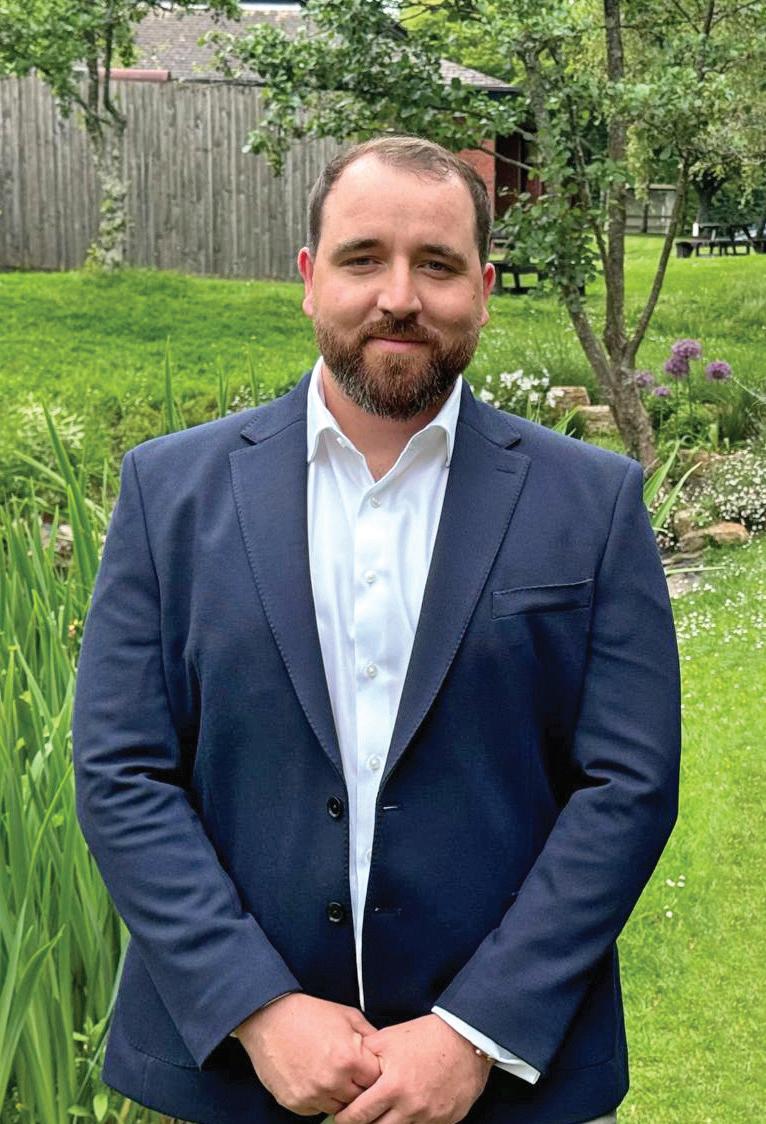
Developers have faced tighter margins, leading them to approach opportunities with greater caution
signs of the market picking up. The interest rate cut stimulated activity from first-time buyers and the election brought renewed optimism, however warnings of a ‘painful’ budget led to a return of uncertainty in the market, with clients delaying or even halting transactions.”
The resulting downturn in real estate activity has created some interesting shifts in the property financing market. As Ben Myers, commercial finance manager at Onyx Money flagged: “Developers have faced tighter margins, leading them to approach opportunities with greater caution. However, whilst we’ve seen a decrease in the volume of funding requests, the quality has notably improved.”
At the same time, it can’t be overlooked that uncertainty brings opportunity and, as Dan Curtis points out, “Opportunistic clients wasted no time seeking out lenders capable of making swift decisions to strike deals where vendors needed to complete before the budget was released.”
Capital remains readily available for businesses across the South, but it is fair to say that it is being provided by, and sourced from, a broader range of suppliers than before.
We’ve seen an increase in wholesale financing as a workaround to direct lending to businesses with higher risk profiles. Moreover, where some banks have indicated a diminished appetite for smaller deals, this has created opportunities for other lenders to pitch for transactions where they would previously have been outpriced.
Similarly, borrowers are now looking at the whole market when evaluating how they meet their capital requirements, and increasingly this includes debt funds. Funds are issuing credit-backed terms much quicker than major banks and this ability to mobilise makes them attractive to businesses.
We’ve also seen an uptick in equity being used to fund investment. Cat Dilloway, investor at Business Growth Fund, reported: “We’ve had a really busy year so far, and have deployed £18m into businesses on the South Coast. It’s a vibrant region for SMEs, and we can see a lot of opportunities to deploy more growth capital, partnering with ambitious businesses in the area.”
With increased competition among major banks, bolstered by the availability of private equity capital, there has been a marked softening of lending criteria. A prime example is the treatment of vendor debt on transactions, with senior
lenders no longer insisting this be fully subordinated (albeit this has meant intercreditor negotiations are more protracted).
We’ve witnessed banks taking higher ‘singleholds’ on transactions, when previously they’d share their commitment with other lenders through ‘club’ deals; possibly as a means of achieving growth in a somewhat volume restricted market. It’s now common to see single lender deals of £50m.
Perhaps it should come as no surprise given the turmoil of recent years, but there is a definite shift to borrowers seeking greater flexibility when it comes to debt terms.
Jeremy Richards, director at PKF Francis Clark notes: “Customers appear willing to pay higher margins/fees to achieve flexible terms including bullet (vs amortising) repayment profiles and additional headroom in financial covenants.”
There’s also been a resurgence in accordions (where possible upsizes in loans are baked into facility agreements) and businesses are either seeking ‘five-year money’, or extension options are being incorporated to allow them to extend facilities by one or more years.
With more funders than ever to approach, there is plenty of scope to explore such options.
Despite sustainable finance remaining a priority for banks, there’s been modest
uptake in the SME and mid-markets. Recognising that this may be attributable to the perception that external monitoring costs (to demonstrate compliance) might outstrip the benefits to be gained through such facilities, certain banks are introducing streamlined products and tools (particularly for SMEs), such as Lloyds’s clean growth finance incentive scheme and green buildings tool.
It’s worth noting that most banks now have a mandatory section in their credit paper dealing with sustainability, so businesses need to address this when borrowing, even where they’re not looking to utilise a sustainability product.
Lenders unanimously report that transactions are taking longer; the average duration stretching to several months in some cases. The reasons aren’t entirely clear, although when it comes to acquisition financing, this may be because the underlying acquisition process has slowed. It’s quite common to see latestage price chips which can reopen negotiations and stall completion.
Despite businesses breaching financial covenants (largely those exposed to discretionary consumer spending, like hospitality), we’ve seen little evidence of bullish enforcement behaviour from lenders, save for when businesses fail to engage after experiencing financial difficulties.
As Graeme Lipman, director at Begbies Traynor says: “Proactive communication with lenders remains key. Lenders are most amenable to supporting businesses that demonstrate transparency.”
As it stands, there is a sense of renewed optimism for the SME and mid-markets across the South Coast, and we expect lending activity to remain strong throughout Q4 2024 and Q1 2025. For help and support financing your business contact Jake.Holmes@shma.co.uk

County council leader Nick Adams-King is determined to get the voice of business heard by government
by Stephen Emerson, Managing Editor
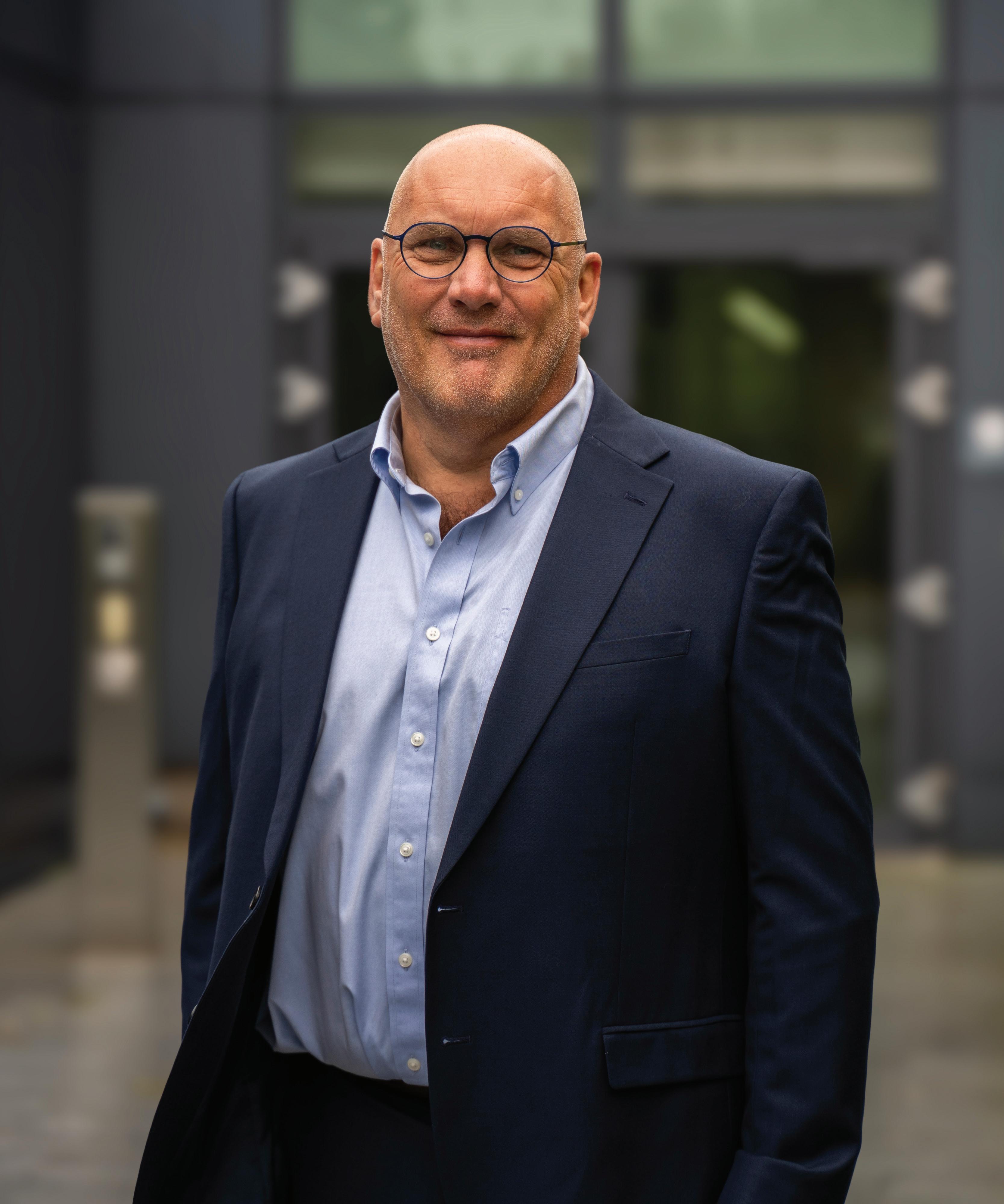

Tenacity is a quality vital to success in both politics and business says Hampshire County Council Leader Cllr Nick AdamsKing, and there are early signs that his dogged determination is paying off.
In September, an expression of interest in a devolution deal was submitted by Hampshire, together with Isle of Wight, Portsmouth and Southampton City Councils in an act of unity that had failed to materialise on three previous attempts.
The devolution deal would equip Hampshire with a mayoral devolution set up like that seen in Greater Manchester, with the county able to negotiate with central government as a unit on key areas including economic development, planning and transport.
Nick said: “You need patience and tenacity to succeed in politics. If you give me a challenge, I will stick at it and not run away.
“If you can fix the macro then it enables you to deliver on the micro and those little wins are the most important.”
Born in Cambridge, brought up in North Devon and now living in Romsey, Nick’s early career and years in business have left an imprint on him.
The son of North Devon sweet shop owners, he first studied as a chartered
You need patience and tenacity to succeed in politics. If you give me a challenge, I will stick at it and not run away from it
surveyor, before running a post office and working in the relocation department of The Nationwide Building Society.
He then set up his own corporate relocation company focused on moving businesses around the country, with a particular focus on the blue-chip sector.
The firm, which counted Marks & Spencer, Pfizer and GlaxoSmithKline, among its client base, grew from a team of four people to 100 and a turnover of £65 million.
Nick sold the relocation business in 2001 and invested in a restaurant in Bournemouth which developed a reputation for drag cabaret.
He opened several similar restaurants in the seaside town, even expanding overseas into Prague in 2003.
His early involvement in politics stemmed from a frustration at Bournemouth Council’s attitude towards business, and he won a seat on the authority in 2005 for the Conservatives.
He stood for parliament in 2010 for the Mid Dorset and North Poole constituency but lost by a slender margin of 269 votes.
He said: “I’m glad I didn’t win as I think that through my career in local government, I have had a much greater impact than I would have done had I become an MP.”
Life shifted to a different gear when he entered into a civil partnership with his partner and now husband James, a doctor at Southampton General Hospital, with whom he has adopted first a son and then a daughter.
Nick said: “I had a deal with James that if it didn’t work out with becoming an MP, then I would let James put his foot to the floor with his career and I’d look after the kids.”
He didn’t stay out of local politics for long.
He secured a seat in 2015 for Test Valley Borough Council before winning a seat on Hampshire County Council only three years ago.
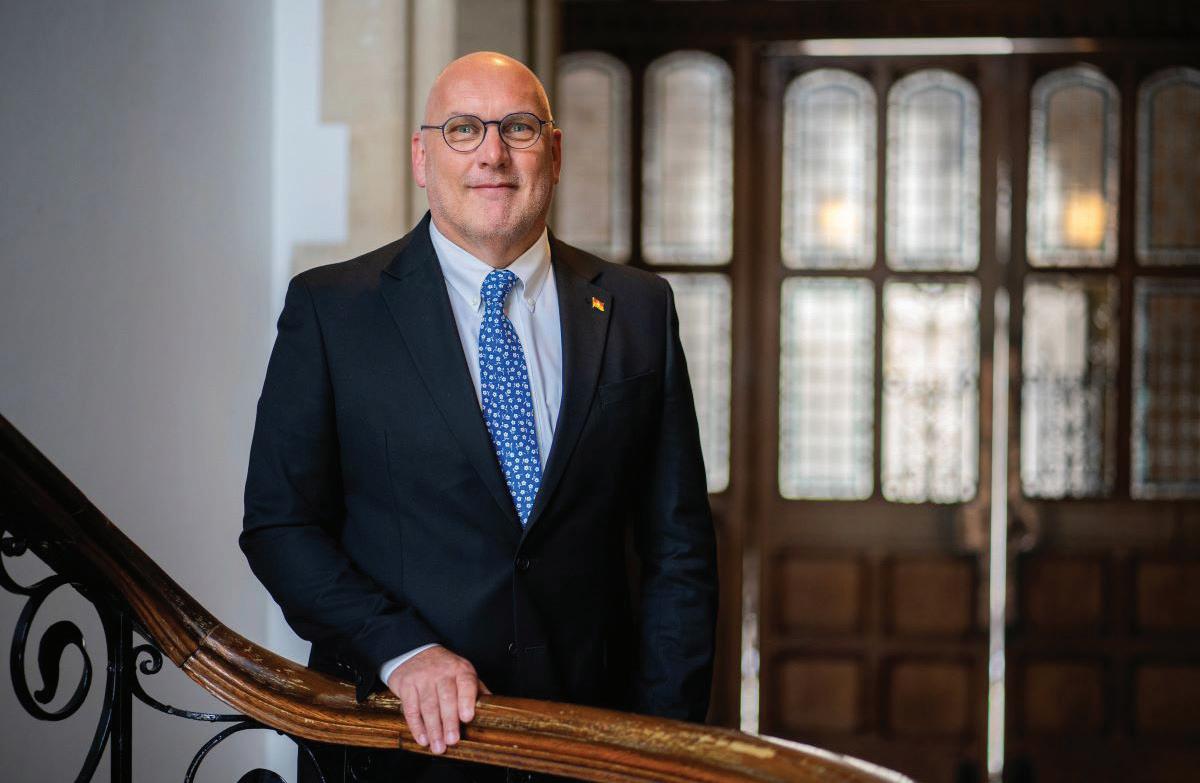
His appointment as leader came fast. He had just 36 hours’ notice following the resignation of previous incumbent Rob Humby, who stepped down suddenly to spend more time with his family.
Nick said: “I had a week of imposter syndrome.
“I haven’t had a moment yet where I haven’t felt on top of things, although it is extraordinarily busy and your diary is not quite your own.”
The Hampshire County Council leader says he was keen to carry on the council’s association with the Hampshire Business Awards, organised by The Business Magazine, since taking on his new role.
He said: “Anything that we can do to showcase business is a good thing.
“It also comes back to attracting the attention of government.
“It is an opportunity to show how inspiring and how innovative they are, and what opportunities there are to partner with the council.”
Hampshire’s devolution bid aims to attract government attention alongside creating more bargaining power for business.
The submission of a formal proposal was no mean feat, according to the county
council Leader, who says he has worked hard to repair links with councils across the county and Solent.
He said: “The relationship between the county council and many others has become strained.
“I think there is an opportunity here to press the reset button so that we can have a better relationship with district and borough councils.
“I have visited every district and borough leader since being appointed and there are a lot of efficiencies that we can achieve if we all work together.”
Members of a combined authority would likely be drawn from the leadership of existing councils, with a mayor also elected.
Nick said: “Not giving up and finding a way through has resulted in something that should end up being really good for all of us, and particularly good for business.
“If we’re going to provide these core services, rather than look at it on a district or borough basis, let’s look at it across the whole piece.”
Nick, as chair, has taken a lead role in the Hampshire Prosperity Partnership since it was established this April.
The new body takes on many of the economic development duties previously carried out by the local enterprise
I have visited every district and borough leader since being appointed and there are a lot of efficiencies that we can achieve if we all work together
partnership. It is cross-party and includes representatives from some of the region’s biggest employers, colleges and universities.
Nick said: “It feels like we can make a difference and can take the voice of business, both big and small, and apply it to what we do. We can apply it to how we lobby government and how a combined authority, under a devolution would operate.”
Nick acknowledged that Hampshire County Council faces tough choices ahead when it comes to providing services, as it seeks to address an annual £175 million budget shortfall from 2025/26 onwards.
He said: “We are in a really challenging financial situation.
“With my background, I want to focus on entrepreneurialism and innovation and look at how we can do things better, effectively and more efficiently.
“We also need to look at how we can use public money better to create a fairer and more equitable Hampshire.”
The Hampshire Business Awards take place on November 21 at Farnborough International Exhibition and Conference Centre. Tickets can be purchased at www.thebusinessmagazine.co.uk

The Grenfell Tower Inquiry has made significant recommendations to the construction industry, which focus on a range of new procedures and regulations that cover building, fire performance testing and contracting, plus recommendations around the roles of government, local government, architects, contractors and the fire service. Rubin Italia in B P Collins’ dispute resolution team, who acted for a core participant in the Grenfell Inquiry, briefly explores what is next for the sector.

Before the inquiry, there were five government departments responsible for different regulatory aspects including Building Regulation, Products Regulation, Building Control and Enforcement as well as Testing and Certification Services. The inquiry concluded that oversight for all these matters should be the responsibility of one independent regulator. However, whether a more centralised approach to decision making will make matters safer is, as yet, unclear.
The inquiry recommended that building control approval should only be obtained after a Fire Safety strategy has been undertaken by a registered fire engineer. Whilst necessary, there is likely to be an added cost to the build as there needs to be systems in place to ensure that these individuals are suitably qualified.
Building product manufacturers were criticised by the inquiry for using, “… misleading marketing material, in part, because the certification bodies that provided assurance to the market of the quality and characteristics of the products failed to ensure that the statements in the certificates they issued were accurate and based on appropriate and relevant test evidence.”
The inquiry also indicated that the industry had been testing the fire performance of external cladding on a small scale using BS8414.
Its recommendation to solve both issues is to develop and use new testing methods in conjunction with professional and academic communities.
The insulation and panel choices made by the architects involved in the design and refurbishment of Grenfell Tower were found to be lacking by the inquiry, however, evidence showed that similar materials have been used on hundreds of high-rise panels across the country. Moving forward, the inquiry has recommended that an application for building control approval be supported
by a statement from a senior manager or principal designer from the architect firm involved, to ensure that all reasonable steps have been taken to ensure that on completion, the building and its design adheres to more new, stringent regulations.
Subcontracting work is common in the building industry, however, the Grenfell inquiry found that it was unclear which contractor was dealing with which aspect of the build, including its design and fire safety. As a result, the inquiry has recommended the introduction of a licensing scheme specifically for contractors wishing to undertake work on higher-rise buildings and that the director/senior manager from the Principal Contractor has to take all reasonable care to ensure that on completion and handover, the building is as safe as is required by the building regulations.
The inquiry’s recommended systems, procedures and proposed new regulations have been designed to prevent another Grenfell tragedy. With an increasing demand for more housing across the country, there is an opportunity for all stakeholders involved in the construction sector to work together to create an environment that ensures safe and sustainable housing in the future.
Rubin Italia is a senior associate in B P Collins’ Dispute Resolution practice, who acted for a core participant in the Grenfell Inquiry. For advice on your commercial or personal disputes, please email enquiries@bpcollins.co.uk or call 01753 889995.



BARRATT HOMES IS COMMITTED TO NURTURING TALENT AND OPENING UP OPPORTUNITIES FOR PEOPLE OF ALL AGES TO EXPLORE CAREERS IN THE CONSTRUCTION INDUSTRY. THE LEADING HOUSEBUILDER OFFERS A RANGE OF APPRENTICESHIPS FOR EVERYONE FROM SCHOOL LEAVERS TO THOSE WANTING TO BUILD ON THEIR ACADEMIC ACHIEVEMENTS WITH A DEGREE APPRENTICESHIP, AS WELL AS THOSE LOOKING TO CHANGE CAREER DIRECTION.
For many young people today, the prospect of spending several years at university before they can start their careers is changing. By contrast, the chance to learn ‘on the job’ and gain transferrable skills, as well as a qualification, is becoming increasingly popular and apprenticeship figures are rising nationally.
With an overwhelming amount of choice, it’s crucial that young people are made aware of the opportunities open to them. Through its employment and skills plan, Barratt Homes and its subcontractors recruit and train people in the communities where they are building, as well as providing career advice in local schools.
Two of the many apprentices currently taking advantage of the pathways offered by Barratt into the construction industry are Sara Wrona (24) and Jamie Driver (25).
Sara and Jamie both joined Barratt as Technical Trainees at the firm’s headquarters in Hedge End, Southampton – Sara in October 2021 and Jamie a year later. Both agree it’s a great way to combine studying with workplace experience.
Sara, who was awarded Apprentice of the Month from the Chartered Institute
of Building (CIOB) in November 2023, said: “I’ve always wanted to work in construction and being able to gain hands-on experience while continually improving my knowledge while I study has been excellent. It’s been challenging at times, and can get quite busy, but to be recognised as Apprentice of the Month at the end of last year shows that all the hard work I’ve put in has paid off.”
The building industry has historically been a male-dominated one and, although more women are now joining the sector, there is still a stigma surrounding females taking on construction roles. Sara said: “When

I joined the construction industry, I was worried about voicing my opinions and feeling heard among colleagues who were mainly male and a lot further ahead in their careers. I instantly felt at ease with Barratt, however, and felt respected both on and off site.”
Barratt also supported Sara in her determination to raise funds for Macmillan Cancer Support in memory of her mother, Ewa, who sadly died of breast cancer in 2021. Last October, Sara took on a 14,500ft skydive at Netheravon Airfield in Salisbury in aid of Macmillan, and Barratt matched the amount of sponsorship she raised, so that a total of £1,050 was donated to the UK’s leading cancer care charity.
Jamie, who has been with Barratt for nearly two years, feels that an apprenticeship was the right choice for him. He said: “Being able to learn on the job has been a great way for me to enter a career in construction, and I’m really enjoying it.” Jamie, a keen footballer, has also benefited from sponsorship that will see the Barratt logo appear on Jamie’s kit, in match programmes and on his club’s social media channels.
Jamie plays for Colden Common FC, a Hampshire Premier League side, three times a week and the housebuilder’s
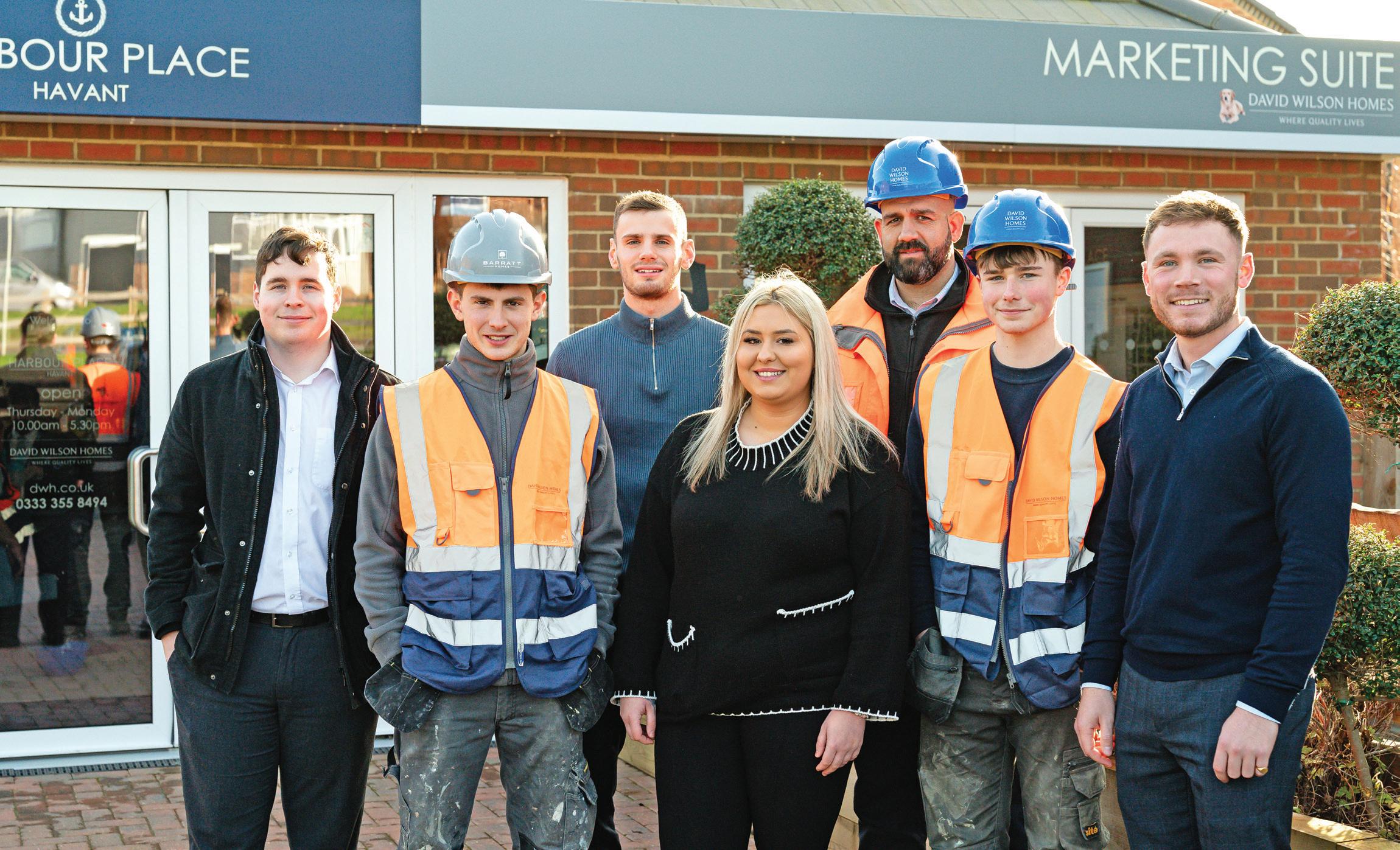
sponsorship is welcome news both to him and his club.
“This incredible support means that my training kit will be sponsored for the entire season, which is brilliant,” Jamie said. “The club relies heavily on generous donations and Barratt’s help will mean it can allocate more money to developing the club’s facilities to provide a platform for younger age groups to progress.”
OPPORTUNITIES FOR ALL
Barratt’s apprenticeship schemes include opportunities for everyone, from recent school- and college-leavers to people who want to change careers. The housebuilder offers level 2-3 trade apprenticeships in construction and construction support, and level 4-7 higher and degree apprenticeships, where those who have studied to a higher level can earn a degree while working on projects across construction, quantity surveying, technical and real estate.
For graduates, Barratt’s two-year ASPIRE programme is designed to nurture future business leaders. The scheme is tailored to support career development in each individual’s chosen discipline, while building their understanding of how Barratt’s departments work together to build communities.
Megan Hamlyn, Barratt Homes Marketing Manager, said: “We work alongside the communities where we’re building new homes, as well as schools and local councils, to provide career opportunities for young people in the local area.
“We’re also delighted to be able to help people to the Barratt family at every stage on their career journey through our many training schemes and we have opportunities for everyone.”
More details about Barratt’s apprenticeships and other training programmes can be found at www.barrattcareers.co.uk/ apprentices-graduates/

Students who’ve just embarked on their final year at school might be thinking about their next steps career-wise. For Sam Sweatman, who is 16, an apprenticeship was the perfect option. “I knew I wanted to leave school and start work after my GCSEs,” he said. “I think it’s really important to have a trade. I discussed my career plans with my mum and told her I wanted to do something active, to work outside and be part of a team. She found out about the bricklaying apprenticeship with Barratt and it struck me as a great idea.”
Sam started his apprenticeship in August and he’s really enjoying it. “I’m working with a great group – there are quite a lot of us and there are people of all ages and different backgrounds. You wouldn’t think we have only known each other a short time. It’s brilliant.” He’s also excited about where his career with Barratt might take him when his apprenticeship is completed. He said: “I’d like to look into options to move into other areas of the business, like site management.”





Construction work has started on a new headquarters at Bicester Motion for electric motor manufacturer YASA.
The development is set to span 90,000 sq ft.
Originally a spin-out from the University of Oxford, the company was bought in 2021 by the Mercedes-Benz Group. It now employs more than 400 staff across several Oxfordshire sites, with teams in innovation, engineering, prototyping, operations and business support.
Many of them are hoping to relocate to the Bicester Motion campus in January 2026 following practical completion of the facility next summer.
In the meantime, construction is expected to support eight apprenticeships, as well as opportunities for work experience, volunteering, career events, local school engagement and site tours.
Dr Tim Woolmer, founder and chief technology officer at YASA, said: “We’ve been on an amazing journey, and from when we spun out of an Oxford University
PhD in 2009, our vision has always been to accelerate electrification.
“YASA’s home has always been in Oxfordshire, the heartland of automotive technology in the UK, and our new facility will complement our existing manufacturing facility just down the road in Yarnton.
“We look forward to seeing our building progress.”
YASA HQ is being built in Bicester Motion’s new Innovation Quarter, recently renamed ‘The Ranges’ after the former RAF Bicester rifle ranges on site.
“This is another significant milestone for Bicester Motion,” added chief executive Daniel Geoghegan.
“Not only in officially welcoming pioneering YASA and their staff, but also our continued investment into enabling vital future mobility innovation.
“We look forward to boosting construction jobs and the wider local supply chain in delivering this important project.”
Former Prime Minister David Cameron has returned to the Advisory Council of the Oxford-Harrington Rare Disease Centre (OHC), where he will lead efforts to deliver 40 new and potentially life-changing therapies for rare diseases into clinical trials over the next decade.
He originally joined in October last year before he was appointed Foreign Secretary, a role he lost after Labour won the General Election.
Lord Cameron is a passionate advocate of rare disease research though his family’s experience of caring for their son Ivan, who had a rare condition known as Ohtahara syndrome.
“Of all the causes I have advocated, this one really is very personal,” he said.
In 2012, when in government, he established the 100,000 Genomes Project. Genomics England has helped position the UK as a leader in rare disease research.
“Establishing a world-leading database with hundreds of thousands of genomes is one of my proudest achievements as Prime Minister,” he added.
“Yet to be truly transformational, genomics requires the best of academia, life sciences, pharmaceutical companies, philanthropy and venture capital from around the world to come together. That is what the Oxford-Harrington Rare Disease Centre sets out to do.
“As a father I know all too well the impact of rare diseases. We miss our son Ivan every day. But the steps we are taking now means that families like ours will have hope. It is vital that we try to give it to them.”

Tokamak Energy has launched a new business division centred around its high temperature superconducting (HTS) magnet technology to commercialise years of research.
Based at Milton Park in Oxfordshire, the company is used to working with HTS magnets in its nuclear devices, where they confine hot plasma fuel in order to achieve the conditions necessary for fusion energy generation.
These magnets generate stronger fields and operate at higher temperatures than conventional low temperature superconductors, making them more energy-efficient and easier to manage.
But the technology has potentially far wider-ranging applications – from medical diagnostics to materials analysis and even defence. TE Magnetics wants to become a leading designer and supplier of HTS magnets to the fusion industry and beyond.
“TE Magnetics will commercialise our transformative magnet technology and take it into new markets,” said Warrick Matthews, CEO of Tokamak Energy.
“Launching this new division allows us to focus on our core mission of delivering clean, secure and affordable fusion energy while supporting our strategy for rapid growth across complementary markets.”
TE Magnetics is set to offer services from modelling and prototyping through to development and large-scale manufacturing.
The division will be led by Liam Brennan, with Rod Bateman as head of magnet systems development and Theo Becker as head of operations.
“The era of high temperature superconductors is here,” Liam added.
“TE Magnetics is born from Tokamak Energy’s world-class fusion mission and is centred on opening new fields of performance in applications that will change the world in which we live today.
“We’re taking our knowledge, skills and talent forward to disrupt existing and create new markets for magnet technologies over the next decade, including renewable energy, science, and land, water, air and space propulsion.”
Oxford Space Systems has delivered its new antenna to the ECHOES project, which aims to improve global communication and surveillance.
The company’s VHF isoflux helical antenna measures nearly four metres in length and represents a crucial component in the project.
Spearheaded by Startical – a joint venture between Spanish firms Indra and Enaire – ECHOES will demonstrate the feasibility of a space-based solution for very high frequency (VHF) communications in air traffic management.
The initiative has received substantial funding from the European Union.
“Supported by the UK Space Agency through ESA’s General Support Technology Programme, we’ve developed an antenna that meets the demanding requirements of this groundbreaking project in record time,” said Sean Sutcliffe, CEO of Oxford Space Systems.
“Our close collaboration with Startical and Indra ensured that our design was well aligned with the mission needs and integrated seamlessly with the satellite.”

Guildford funeral services and funeral plan business Aura has completed a £2 millionplus funding round to support future growth – including the creation of 16 new jobs.
Aura aims to address the logistical, financial and emotional challenges of funeral planning.
Its digital platform simplifies the process, allowing families to focus on working through grief and celebrating their loved ones without undue stress.
Founder Paul Jameson launched the business in 2019 alongside son David and family friend Ben May after he was
Compliance startup Falco wins over investors at Kent roadshow
Founders and investors in Kent came together in September for the latest startup roadshow from South East Angels, the Brighton-based investor network.
Five early-stage businesses across a variety of industries pitched their ventures to potential investors – but it was Falco that triumphed on the day.
Falco is developing autonomous digital co-workers that integrate with existing compliance teams.
Studies have found that 60 per cent of compliance professionals in the financial services industry are burnt out. As a
diagnosed with motor neurone disease and initially given six months to live. Paul already had a will, but didn’t want to burden his family with unorganised affairs or a costly funeral. He now serves as executive chairman.
Company investors include The FSE Group, which put £350,000 towards the latest round, as well as the FSE Investor Network and Oxford Innovation Fund.
David, now CEO, said: “This funding will enable us to further our mission of creating a society where planning for death is embraced as part of life. Our digital tools ensure that we can cater to the diverse
result, many leave their roles due to the pressures of regulatory change, substantial fines and a lack of resources and tools to operate efficiently.
In response, the team at Falco are building up the capabilities of their compliance agent, AskFalco, to match the full range of tasks handled by a compliance officer.
That includes everything from monitoring and analysing regulatory changes to responding to queries from business units, updating policies and procedures, managing reporting and developing training materials.
The aim is to help companies boost productivity, reduce errors and stay on top of regulations.
Peter Galea, co-founder and CEO of Falco, said: “Winning the pitch competition was a huge validation of our mission to alleviate the immense pressures compliance teams face today.”
needs of our clients during their most challenging times.
“We’re thrilled to have the support of The FSE Group and our other investors on this journey.”
Jonathan Day, FSE investment manager, added: “Aura’s innovative approach to funeral planning is combined with an impressive management team and strong market potential.
“They’ve successfully navigated FCA registration and in just over a year, driven sales of more than £2 million in funeral plans alone.”

Other stops on this year’s roadshow include Brighton, Southampton, Tunbridge Wells, Guildford and London.
Jake Fox of South East Angels added: “These events exist to highlight talented local founders building impressive, scalable businesses.
“Falco was chosen as the winner because Pete clearly presented how much he knew compliance teams’ pain points and how using the latest in AI technology could alleviate their struggles.”

Members of county trade organisation
Produced in Kent have seen some of the newest tech in the farming world at an event showcasing innovations.
These included soft fruit picking robotics start-up Dogtooth Technologies, led by CEO Dr Duncan Roberston.
Attendees saw a live demonstration of how the strawberry harvesting robots work with tabletop growing systems, used widely around the world.
“By harnessing a combination of lowcost robots and state-of-the-art AI control systems, we can help to ensure a sustainable future for horticulture and support our farmers in their efforts to provide consumers with fresh, high-quality produce,” said Dr Robertson.
Dogtooth Technologies has been working with UK growers and developing commercial robotic harvesting solutions since 2016.
The robots use autonomous navigation along crop rows to locate and pick ripe fruit. They also come with onboard quality control – grading picked berries and placing them directly into punnets according to supermarket criteria.
Many agricultural sectors face seasonal labour shortages, particularly since Brexit, with some farmers reporting crops being left to rot as they didn’t have enough pickers. Robots could be the answer.
Organisers say the event has sparked new collaborations and discussions about the future of farming in Kent.
Sussex & Surrey Institute of Technology (SSIoT), a consortium of universities, further education colleges and industry partners across the Sussex and Surrey region, has partnered with the University of Chichester.
Led by Chichester College Group, SSIoT develops industry-led courses to prepare students for the jobs of tomorrow.
Professor Jane Longmore, vicechancellor at Chichester, said:
“The university has a long-standing commitment to supporting educational opportunity across the region and will
open new pathways for learners with degree apprenticeships in engineering, biomedical science and nursing.
“We fully embrace the need for local universities and colleges to work together with employers to generate economic prosperity for our communities.”
The Institute is supported by companies including Roche Diagnostics, Gatwick Airport, Southern Water, Wates Group, Irwin Mitchell, Pearson, Coast to Capital, NatWest and Gatwick Diamond Business.
A pioneering West Sussex hydrogen energy company has signed a new agreement with leading Indian energy and environment solutions business Thermax.
Ceres has licensed Thermax to manufacture, sell and service stack array modules – towers of energy-generating cells – based on Ceres’ advanced solid oxide electrolysis technology.
The company will also apply its experience in heat integration and waste heat recovery to manufacture a first-of-its-kind pressurised water flow control system.
The collaboration could create a system up to 25 per cent more efficient than current low-temperature electrolysis technologies and use steam generated from heat/waste recovery in industrial processes.
This would help decarbonise hard-to-abate industries such as fertiliser, steel, chemicals and refineries.
Phil Caldwell, CEO of Ceres, said: “This agreement will take Ceres into the Indian market, which is rapidly becoming one of the most dynamic and increasingly important markets for green hydrogen, green steel and green ammonia. Our entry into this new region marks an exciting opportunity for Ceres as we help enable the path to industrial decarbonisation.”
Thermax now plans to develop a supply chain and establish a manufacturing facility for the electrolysers.
Shepherd Neame has been recognised for its £1.2 million transformation of The Royal Crown in Rochester, Kent.
The independent family brewer and pub company picked up a conservation award from the City of Rochester Society.
The Grade II listed building on the high street near Rochester Bridge reopened following three-month renovation.
The pub dates back to the 1860s and there’s been an inn on the site since the 1300s.
It had been named The Crown up to the relaunch, but Shepherd Neame has since reinstated its former royal title.

Robert Flood, chairman of the City of Rochester Society, presented a bronze plaque to Shepherd Neame’s director of property services, Martin Godden.
Robert said: “Our society first began issuing conservation awards in 1977, in recognition of projects which have made a positive contribution to the local street scene in Rochester.
“When it came to choosing a recipient for our latest award, The Royal Crown was a definite frontrunner, as it’s such a fantastic development.
“The restoration is an outstanding example of how to refurbish and enhance a classic public house and is receiving welldeserved praise from residents and our many visitors and tourists.”
An innovative app designed to improve maternal and neonatal care for black and brown people has been created by University of Brighton student Ruby Jackson.
Melanatal is an educational tool which provides birthing people and clinicians with the signs and symptoms of a range of maternal and neonatal conditions on black and brown skin, including jaundice, pre-eclampsia and mastitis.
Ruby hopes greater understanding and awareness of the different ways these conditions can present themselves will help reduce race-based health inequality.
Black and brown women in the UK are nearly four times more likely to die in pregnancy, childbirth and postpartum compared with white women, and black babies have the highest rate of both stillbirth and neonatal death.
“It was during my placement in Ghana that I first saw how jaundice presented on a baby with dark skin,” said Ruby, “and I
realised I’d never seen anything like that.
“As I reflected on this, I thought of Melanatal as a means of bridging the existing knowledge gap.
“This app will help provide much-needed information for black and brown women. Through Melanatal, clinicians can get better knowledge to care for black babies.”
Ruby has now secured a place on the NHS Clinical Entrepreneur Programme.
This gave her the opportunity to pitch the idea as part of a global digital health challenge delivered by Amazon Web Services (AWS) Healthcare, Cogniss and The Validitron.
In June, she was named one of two winners of the competition, earning 12 months of mentorship and business support to bring the app to life.
Ruby, who’s due to graduate soon, will be running a pilot this year with the hope of working with NHS trusts to adopt and integrate it into their services.


Kier Kemp is on a mission to champion the underdog of the food world, and his music experience has given him all the tools he needs
by Stephen Emerson, Managing Editor
People have an image of being a musician, that all you do all day is take drugs and have sex. However being in a band taught me everything I need to know about running a business

Walking out on stage to thousands of fans and a wall of light and noise may seem a far cry from the world of small business with its daily routine of coffee and spreadsheets.
However for musician Kier Kemp, of alternative rock outfit Fearless Vampire Killers, running a band and marshalling a business are not that different.
While many view an MBA as the best training for running a business, Kier says his experience in the music business has equipped him with all the skills that he needed to launch and grow Kent-based condiment maker and seller Condimaniac, which he runs with his wife Jen.
Managing finances, tours, organising logistics and brand building are all part of running a band too, said Kier who grew up in Suffolk.
He said: “People have an image of being a musician, that all you do all day is take drugs and have sex.
“However being in a band taught me everything I need to know about running a business.
“After you do a gig, there’s tickets, then the promoter, then your agent, your manager, tour expenses and then what’s left, and sometimes it’s not a lot, is yours.”
Kier moved to London in 2007 aiming to breaking into the music business and soon after, Fearless Vampire Killers was formed.
The group went on to tour the world both as a headline and support act, including topping the bill at Derby’s Download Festival, before taking a break in 2016.
Kier said: “I’d burned out. We’d been going so hard for eight years that I was depressed, we all fell out and the band began to fracture. It’s all good now though.”
The band reunited in 2020, performed its first proper gig in 2022 and has plans to tour next year.
With spare time following the band’s break-up in 2016, Kier set up an Instagram account where he reviewed condiments, which gave him the idea to set up Medway-based Condimaniac.
He said: “We would create these in-depth reviews with beautiful pictures in the same way that you would approach fine wine, and it developed a bit of a cult following.”
Condimaniac launched its first sauce, called Smokey Dragon, in 2019. The business now has four staff, is to recruit more, has secured investment and is set to occupy a 3,000 sq ft manufacturing facility.
‘E-commerce first’ model
The business is “e-commerce first” and reluctant to engage with large supermarkets, however Kier is keen to work with higher end and independent stores.

He said: “We’re not big fans of the established food network which drives small businesses down on price to the point that they can barely exist.
“We would rather be high margin, smaller scale and develop over time through subscribers to our club.”
Kier likened the experience of small food brands being signed up by a supermarket as akin to that which bands experience when they sign up to a record label.
He said: “The vast majority of little brands just want to be in a supermarket because that’s the established thing to do. That’s the thing that you can put on your LinkedIn and people are impressed.
“In music everyone wants to be signed by a label, and it’s the same thing here. A supermarket will get you to pay loads for marketing to sell in their store and you can end up with nothing at the end of it.”
My whole life has been spent building cult brands and everything that I have learned in the band, I have applied to the business
Key to the success of Fearless Vampire Killers has been in building up a cult following that remains invested in the band to this day.
Kier said: “My whole life has been spent building cult brands and everything that I have learned in the band, I have applied to the business.
“Now that we are doing the band again, I’m taking that entrepreneurial knowledge that learned through Condimaniac and applying it to the band.
“I get to do my favourite things all the time –food and music.”
Achieving a cult following is considered the holy grail for brands both large and small but many, Kier says, are not prepared to put in the work needed to create that community.
He said: “There is an old adage that you only need 1,000 true fans to make money off a thing and they say this about bands.
“You don’t need 100,000 passive people, you need 1,000 people that are really into what you do.
“We have Club Maniac, which is our subscriber platform, and it has revolutionised our business because you get to have stability from recurring income.”


Kier believes in the effectiveness of being passionate when it comes to getting results – so much so that he is writing a book on how it can help business owners prevail.
He said: “I’ve always believed strongly that passion is the ultimate starting point as a business operator because when inevitably the sh*t hits the fan and stuff gets hard, you are going to be the one that sticks it out because you care.
“Lean into your obsession, that’s your body and mind’s way of telling you what you should be doing with your time and your life. Follow that rabbit hole and don’t let anyone tell you it’s a stupid idea.”
Condimaniac’s website contains a manifesto with a bold vision for the company that sets out how it aims to change the way people think about condiments, which it describes as the underdog of the food world.
What does the future hold for Kier and his team and where does he want to take the brand as they bid to realise their vision?
Kier said: “I have no interest in running an international conglomerate. I would quite like it to grow to the point that it’s worth about £10 million and sell it.
“I’m a working-class kid who has never had more than a few thousand pounds in the bank so it would be bizarre to sell it for millions. But who knows?”
IN ASSOCIATION WITH south east and oxfordshire




For the third year, we are delighted to collaborate on our life sciences supplement with leading national law firm Freeths and Milton Park, the 250-acre business and technology park
By Nicky Godding, Editor

Looking back over the last three years, it’s clear that the reputation of Oxfordshire’s life sciences sector continues to grow globally, and the University of Oxford is still spinning out more companies than any other UK university.
But complacency isn’t an option. The region must continuously promote the vibrancy of the sector, the opportunities available to those who want to bring their skills and build careers here, and the attractive lifestyle on offer when they move here.
With the change in government this summer has also come a new perspective on supporting the UK science sector.
Businesses in this country’s life sciences industry generated more than £108 billion in turnover in 2021-22, a 13 per cent increase from the previous year.
The new Labour government says it recognises the value of life sciences, and in February published its plan for the sector. This said that if Britain is to truly
lead the world, then we must back the industries in which we are already global leaders.
Life sciences is one of those and it has a huge role to play in Britain’s economic future.
A vibrant and supported life sciences sector will also help make the NHS fit for the future and pioneer breakthroughs which will transform and extend lives.
This is a positive intent which now needs to be supported with actions. In September Lord Darzi published his rapid investigation into the state of the NHS, commissioned by government.
The NHS surgeon and academic’s conclusions suggested there must be a tilt towards technology.
Lord Darzi said: “There is enormous potential in AI to transform care and for life sciences breakthroughs to create new treatments.” He also wants more support for British biopharmaceutical companies.
In August, the government gave a boost to those investing in life sciences, when it extended the Enterprise Investment Scheme and Venture Capital Trust. Both were set to end next April, but have now been extended 10 years to April 2035.
But more lab space is needed for start-ups, scale-ups and the big biotechs wanting to expand. More homes are also needed close to workplaces for those employed in the sector. Unless you support the industry holistically, it won’t thrive.
Our list of 100 life sciences businesses across the Oxfordshire region celebrates the diversity of innovation. Some companies are revenue-generating, others have that goal ahead of them.
Milton Park (the UK’s largest single ownership innovation community), and Freeths, voted UK law firm of the year in September, live and breathe the life sciences sector and understand better than most the challenges it faces, alongside the opportunities which they know are there for the taking.

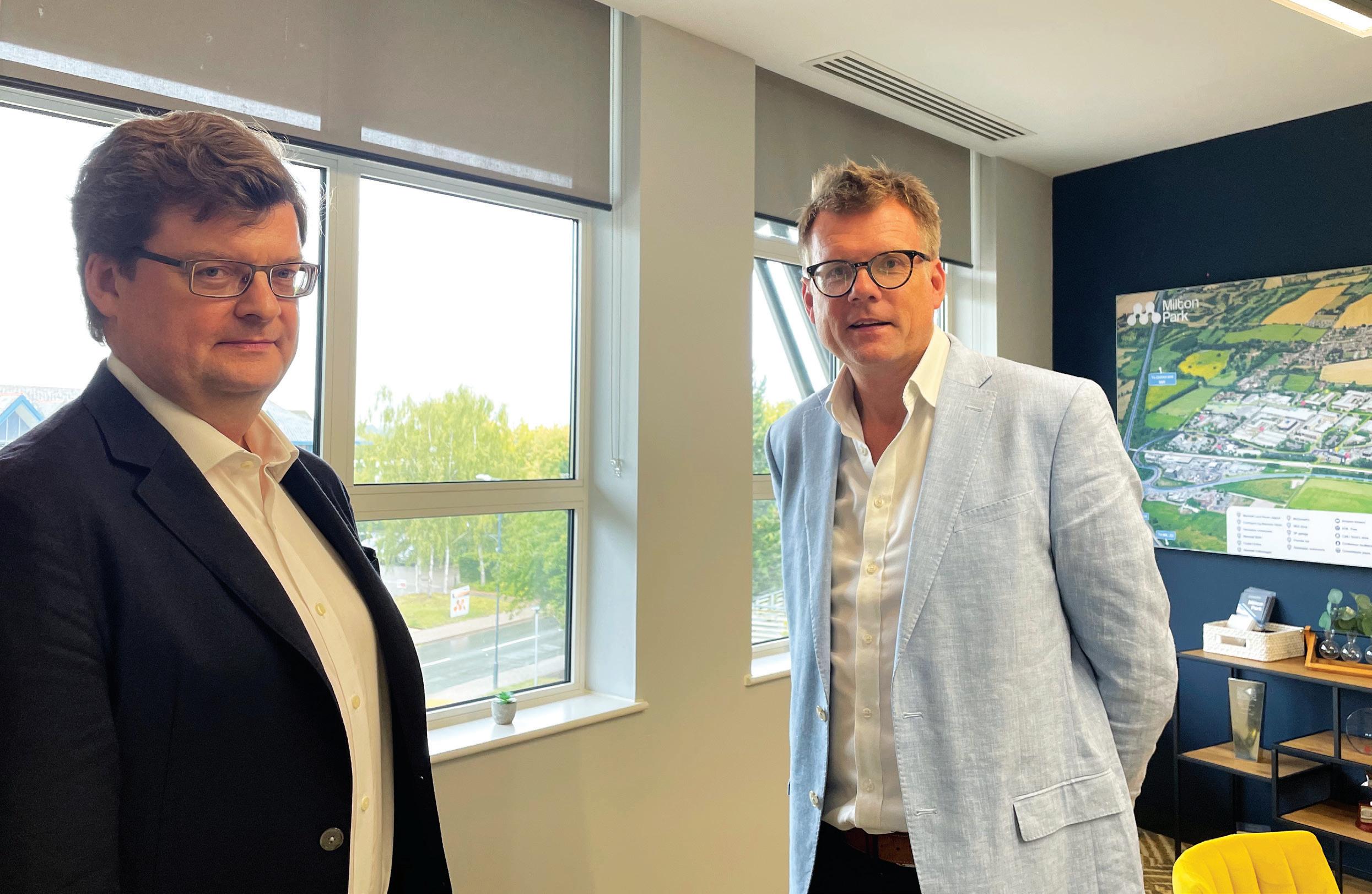
During the years 2020 and 2021, investment into life sciences companies across the UK surged as investors poured money into Covid research over the course of the pandemic.
Many agree this was in large part thanks to investor optimism and expectation after the amazing vaccine achievements of Oxford University spin-out Vaccitech (now renamed Barinthus Biotherapeutic and listed in our 100 life sciences companies).
But upwards trajectories can’t last forever and the investment market is now thought to be settling back down after a few years of exceptional volatility.
That has meant a drop in foreign direct investment into UK life sciences last year, the second year-on-year decline since 2021.
Inward investment into the sector in 2023 was £0.8 billion, a 21 per cent reduction compared to 2022. But we weren’t the only country to experience this. The USA and Ireland also saw reductions.
Equity finance raised by the UK life sciences sector similarly dropped last year.
Last year equity finance fell to £2.9 billion, a 14 per cent decrease compared to 2022. But again, similar decreases were seen in most comparitive countries.
Despite this, the UK was still ranked third in 2023, up from fourth the previous year and behind only the USA and China.
What can the government do to kickstart further growth in the UK’s life sciences sector?
It’s done two things already. In September it extended the Enterprise Investment Scheme (EIS) and the Venture Capital Trust (VCT).
Both were set to end next April, but this autumn the government announced it was extending them by 10 years to April 2035. The schemes are designed to encourage investment into new or young companies through tax-relief incentives.
This boosts innovation, creating jobs and stimulating economic growth.
According to Philip Campbell, Commercial Director at Milton Park in Oxfordshire, the extension of the EIS and VCT is a great start – now the region needs to double down on creating the right conditions and support for investment.

Quite often a founder will see the science as the primary focus and building a business as secondary. The reality is that they need to do both

“For young companies it’s about getting going quickly,” he said. “At Milton Park we are very lucky that we have a simplified planning regime, strong infrastructure, excellent power provision and space for every size of company.”
Claus Andersen, Partner in law firm Freeths Life Sciences team, agreed. “Above all the government’s announcement on EIS and VCT has created some stability, and this is important. It takes a long time to get from idea to product commercialisation.
“But the government still has a big challenge ahead.
“While I understand the focus on closing the deficit, there is a difference between investing in growth and firefighting daily economic problems. The life sciences and technology sectors are two areas really driving the UK economy.”
Claus and Philip both pointed out that it was a pity that the government slipped out September’s EIS and VCT announcement without much fanfare.
Claus said: “It would have delivered a stronger message if a senior government minister had made the announcement, underlining its commitment to the sector.”
Philip added: “If the government doesn’t
make a noise that it is supporting companies investing in this country – that if they invest, they will be rewarded in tax reductions – money will go to other European countries, or to the USA.”
To drive economic growth, the UK needs a fair tax regime for investors and stronger communication to ensure they understand the benefits.
But it’s not all about those with the money. If young companies want to attract investment, they need to think of themselves as businesses from the start, not simply researchers with a great idea.
“Start-ups and founders should take advice early,” said Claus. “They need to establish themselves as investible entities as soon as practical, because the earlier they can attract investment, the more opportunity they will have to develop their IP into a commercial business. Investors seldom commit to fund an unpatented idea – they need clarity on a business’s direction and ambition.
“Quite often a founder will see the science as the primary focus, and building a business as secondary. The reality is that
they need to do both.”
A start-up needs to decide what it wants to be, how long it will take to get there and how much investment is needed to make that happen.
Philip added: “By putting the start-up on a business footing early, the founder will reduce their cash burn, so it makes practical sense.
“From a real estate perspective, particularly with young companies, we are seeing growing demand for more fitted space, so that they don’t bear the capital cost of fit-out.”
The whole of Milton Park is under single ownership, in fact it is the largest single ownership innovation community in the UK. “That makes it a lot easier for us to help young companies size their lab and office space up or down as needed,” said Philip.
“We offer a ladder of growth. From a virtual offering where companies just have an address, to co-working and grow-on lab space, right up to companies such as Evotec and Adaptimmune which employ hundreds of people and have significant lab space at Milton Park.

We are all laying the foundations for future generation
Oxford also has a strong business support system, from the county’s local enterprise partnership to Oxford University Innovation, the university’s technology transfer and consultancy company which manages the research and development of university spin-offs.
There is also Oxford Science Enterprises, the early-stage venture capital firm which invests in spin-outs, and Advanced Oxford which – through its membership of senior leaders from the area’s biggest knowledge-intensive businesses –supports the long-term development of the Oxford region. And there are many other similar support organisations.
Success doesn’t happen without strong advocacy and support. “It’s a great privilege to work within the life sciences ecosystem,” said Philip. “We are all laying the foundations for future generations.”
Claus added: “Working collectively also helps create fertile conditions for growth.”
But it’s no secret that certain skills are in short supply in the UK, as in many other European countries, and everyone is competing for talent.
What can be done to encourage more skilled people into the UK’s life science companies, particularly the Oxfordshire region?

Oxford has a strong global brand
A renewed focus by government on housebuilding has been welcomed across the scientific community and its support ecosystem, but there’s much more to be done.
“Oxfordshire’s life sciences businesses need lab space and their staff need homes to live in,” said Claus. “We also need to develop home-grown talent and make it easier for those looking to build their careers in the UK to obtain skilled worker visas.”
Oxfordshire should promote its globally
competitive and substantial life sciences cluster more widely, along with celebrating the benefits of the region as a great place for work and its leisure activities.
“We need to share more broadly the high quality of life that people enjoy in the Oxfordshire region and beyond, and because we are part of the Oxford/ Cambridge Golden Triangle – the UK’s biggest scientific cluster, there are ample opportunities for skilled people to build their careers here,” Claus added.


He added: “The UK has a very good reputation in many parts of the world, but we can’t be complacent. With so much global competition, we need to ensure that the positive aspects of living in the UK – our open and relatively peaceful democratic society, the opportunities waiting to be seized and our beautiful towns, cities and countryside are all fully appreciated and promoted.”
Philip added: “It used to be a no-brainer to set up a business in the UK. And it still is for many, but we know there is now tougher competition from other countries.”
However, in our list of 100 life sciences companies, it is evident that the UK is still a destination of choice for scientists and business founders from all over the globe.
Many of the companies selected for the list are led by scientists from across the world and this is a reason to be cheerful. The UK is still recognised as having one of the most fertile innovation economies in the world.
the world knows the strength of this region’s life sciences sector.
“We have the ideas and the opportunities,” said Philip. “We just need to ensure that we have the fuel (a strong economy and the right skills) to continue to power that engine of growth.”
The passion and optimism that runs through Oxfordshire’s life sciences community is clear to see when the
region’s scientific community comes together, which it does regularly at the many networking, conferences and other events held across the region.
“Oxfordshire is an exciting place to be,” said Philip. “Innovation is a team sport and we work hard to develop collaboration and partnerships to drive knowledge exchange and scientific excellence.”
Claus agrees. “Oxford has a strong global brand.
“Despite our determination not to be complacent and our acknowledgement that everyone needs to keep their feet on the accelerator, the world knows the strength of this region’s life sciences sector.
“And we, representing the professional sector, are supporting those with the ideas, technologies and scientific discoveries that could change and improve the world as we know it.”

Company name Founded
Akamis Bio 2006 Howard Davis
Alethiomics 2021 Prof Beth Psaila
AlveoGene 2023 David Hipkiss, Executive Chair
AMS Biotechnology (Europe) 1987 Alex Sim
Clinical-stage oncology company leveraging its Tumor-Specific ImmunoGene Therapy platform to improve cancer outcomes
Location
Abingdon Science Park
Developing life-changing treatments for patients with blood cancer Oxford
Transforming rare respiratory disease outcomes using Inhaled gene therapy Oxford
Milton Park, Oxfordshire Accession Therapeutics 2020 Bent Jakobsen
Active Needle Technology 2016 Ian Quirk
Adaptimmune Therapeutics 2014 Adrian Rawcliffe
Leading provider of quality life science research reagents and services
With its stealth virus platform technology, Accession Therapeutics is focused on treating intractable and widespread forms of cancer
Precision needle targeting in ultrasound-guided interventional procedures, such as cancer biopsy, drug delivery and regional anaesthesia
Clinical-stage biopharmaceutical company developing novel cancer immunotherapy products for cancer patients
Adaptix 2009 Sarah Small 3D X-ray technology at point-of-use
Arctoris 2016 Tom Fleming
Arcturis Data (UK) 2018 Alex Snow
Avaxipen 2017 Robin Cohen
Tech-enabled contract research organisation
Uses real-world data to support the discovery and development of new medicines
Developing needle-free solid dose vaccines
Advancing the next generation of immunotherapies that lead T cells to gain control over disease
Oxford Business Park, Oxford
Culham Science Centre, Abingdon
Milton Park, Oxfordshire
Begbroke Science Park, Oxford
Milton Park, Oxfordshire
Oxford Technology Park, Kidlington
Milton Park, Oxfordshire Barinthus Biotherapeutics (UK) (formerly Vaccitech) 2016 Bill Enright
Blue Earth Therapeutics 2021 David E Gauden
Clinical stage radiopharmaceutical company advancing next generation targeted radiotherapeutics to treat cancer patients
Brainomix 2010 Dr Michalis Papadakis Creates AI-powered imaging biomarkers enabling precision medicine
BV Biomedical 2020 Roy Garvin
Coding Bio 2020 Simon Bornschein
Convatec 1977 Karim Bitar
Dark Blue Therapeutics 2020 Alastair Mackinnon
Diffblue 2016 Toffer Winslow
DJS Antibodies 2014 Dale Starkie, Director Scientist
Eden Research 1995 Sean Smith
Developing a novel treatment for multiple sclerosis
Building immunotherapies for cancer patients by testing millions of candidates to find the best therapies
Advanced wound care, ostomy, continence and infusion care
Drug discovery company leveraging therapeutic and disease insights to exploit cancer’s vulnerabilities and dependencies
Harwell Campus, Oxfordshire
Oxford Science Park, Oxford
Oxford
Oxford Science Park, Oxford
Headington, Oxford
Milton Park, Oxfordshire
Oxford Science Park, Oxford
Using AI technology to fundamentally transform the way developers write code Oxford
Developing a new platform for antibody discovery to create novel therapeutics Oxford
Developing sustainable biopesticides and plastic-free encapsulation for global crop protection
Milton Park, Oxfordshire
Oxford Expression Technologies Ltd 2006 Dr Adam Chambers, Principal Scientist Centre of Excellence in the application and development of baculovirus science Oxford
Oxford Gene Technology Ltd 1999 Adrian Smith
Oxford Genetics Ltd (OXGENE) 2011 Weimin Valenti (General Manager)
Oxford Immune Algorithmics Ltd 2018 Dr Hector Zenil, Owner
Pioneer in hybridisation technology and a leading provider of clinical research and diagnostic solutions Kidlington
Helps pioneering companies accelerate the discovery and biomanufacture of their CAR-T/cell therapies and gene therapies Oxford
Deep-tech that applies predictive and generative Artificial General Intelligence (AGI) to deliver decentralised precision health and predictive medicine Reading
The Business Magazine has endeavoured to correctly describe the work of each life sciences company listed. However, the magazine does not accept liability for any inadvertant mis-representation.

Company
Emergex Vaccines 2020 Professor Thomas Rademacher
Enara Bio 2016 Kevin Pojasek
Etcembly 2019 Michelle Teng
Evariste 2017 Anna Hercot
Everest Biotech 1999 David Smoller
Developing T cell-priming immune set-point candidates against viral and bacterial infectious diseases, using purely synthetic non-biological components
Exploring the hidden depths of cancer and T-cell biology to discover and characterise dark antigens, a novel class of shared immunotherapy targets
Milton Park, Oxfordshire
Oxford Science Park, Oxford
Building the world’s largest machine learning database and immunology expertise to deliver powerful TCR immunotherapies through rapid computerassisted engineering Harwell Campus, Oxfordshire
Developing small molecule therapeutics targeting synthetic lethal pathways in oncology Oxford
Specialists in anti-peptide and antigen affinity purified goat polyclonal antibodies Upper Heyford
Evotec (UK) 1991 Dr Christian Wojczewski Drug discovery, development and manufacturing
Evox Therapeutics 2016 Dr Per Lundin
Exscientia 2012 Dave Hallett
Improving the natural delivery capabilities of exosomes, and developing a new class of therapeutics
The first company to automate drug design and the first to have an AIdesigned molecule enter clinical trials
Flexsr 2023 Professor Aditi Lahiri Developing more flexible speech recognition
Fluorok 2022 Gabriele Pupo
Gardin Agritech 2020 Sumanta Talukdar
GeneOmics Solutions 2018 Prathiba Kurupati
GFC Diagnostics 2007 Dr Graham Cope
Greywolf Therapeutics
2017 Peter Joyce
Human Centric Drug Discovery 2021 James Peach
Hypha Discovery 2004 Liam Evans
Immunocore 2007 Bahija Jallal
IngenOx (previously Celleron Therapeutics) 2022 Professor Nick La Thangue
Iotasciences 2016 Dr Michael Lutz
Iuvantium 2022 Björn Schimmöller
Aiming to revolutionise the way fluorochemicals are produced worldwide
Innovative optical sensor technology which can measure the health of crops, fruit and vegetables.
Milton Park, Oxfordshire
Oxford Science Park, Oxford
Oxford Science Park, Oxford
Oxford
Oxford Science Park, Oxford
Milton Park, Oxfordshire
Early diagnosis and treatment in a personalised fashion using multi-omics data Oxford
Specialists in point of care detection of smoking and cotinine measurements and treatment adherence in TB Chipping Warden
Addressing immune dysfunction in oncology and autoimmunity
Improving neurology drug discovery by bringing more human data to the process
Specialising in the synthesis, purification and characterisation of drug and agrochemical metabolites, API degradates and natural products
Commercial-stage biotechnology company that discovered, developed and commercialised the world’s first approved T cell receptor therapy
The discovery and clinical development of new and innovative therapies to treat cancer
Developing single-cell biology handling solutions
Deeptech synthetic immunobiology company
Ivy Farm Technologies 2019 Richard Dillon Sustainable meat production
Life Research Oxford 2024 John Jain
MatchBio 2023 Omer Dushek
Mitorx Therapeutics 2021 Jon Rees
Nanolyse Technologies
Nanovation Therapeutics UK
2020 Imad Ahmed
2021 Dominik Witzgmann
Bringing together US and UK researchers in reproductive medicine to develop assays for studying and validating epigenetic modifications in human sperm DNA
Improving functionality of Chimeric Antigen Receptor-based therapeutics using their proprietary range of bespoke synthetic receptors
Reversing mitochondrial dysfunction to arrest decline in muscular dystrophy and neurodegeneration
Developing advanced materials with transformative applications and creating next-generation, nano-enabled chemical sensors
Developing safe and efficient delivery of genetic medicines to target tissues in the body
Milton Park, Oxfordshire
Oxford Centre for Innovation, Oxford
Milton Park, Oxfordshire
Milton Park, Oxfordshire
Oxford Science Park, Oxford
Begbroke Science Park, Oxford
Oxford
Oxford Business Park, Oxford
Oxford Science Park, Oxford
Oxford
Oxford Business Park, Oxford
Harwell Campus, Oxfordshire
Harwell Campus, Oxfordshire

Company name
NeoVac 2021 Eran Eilat
Neuro-Bio 2013 Baroness Susan Greenfield
Neu Health 2023 Caroline Cake
New England Biolabs 2011 Donald Comb
Niox Healthcare 1998 Ian Johnson (Executive Chairman)
Novo Nordisk Research Centre Oxford 2014 Dr. Bill Haynes (site head)
Nucleome Therapeutics 2019 Dr Mark Bodmer
Ochre Bio 2019 Jack O'Meara
Ojas Immune 2024 Dr Aroul Selvam Ramadass
Omass Therapeutics 2016 Ros Deegan
Optellum 2015 Johnathan Watkins
Orbit Discovery 2020 Neil Butt
OrganOx 2008 Craig Marshall
Osler Diagnostics 2016 Connor Campbell
Oxccu Tech 2021 Andrew Symes
Oxehealth 2012 Todd Haedrich
Oxford Biodynamics 2007 Jon Burrows
Oxford Biolabs 2009 Dr Thomas Whitfield
Oxford Biomedica 1996 Dr Frank Mathias
Oxford Biotherapeutics 2003 Christian Rohlff
Oxford Brain Diagnostics 2018 Dr Steven Chance
Oxford Cancer Analytics 2020 Dr Peter Jianrui Liu
Oxford Cannabinoid Technologies 2017 Clarissa SoweminoCoker
Oxford Drug Design 2001 Dr Alan D Roth
Oxford Endovascular 2015 Mike Karim
Oxford Nanopore Technologies 2005 Dr Gordon Sanghera
Clinical stage company with an unique IP for lipid nanoparticles
Using a new discovery to develop drugs to treat Alzheimer’s Disease
Location
Milton Park, Oxfordshire
Culham Science Centre, Abingdon
Making the latest Parkinson's disease and dementia care accessible for all Oxford
Leader in the discovery and production of enzymes for molecular biology applications
Design, development and commercialisation of medical devices for asthma diagnosis and management
Milton Park, Oxfordshire
Oxford Science Park, Oxford
Novo Nordisk Research Centre Oxford focuses on identifying novel therapies for patients with type 2 diabetes and cardiometabolic diseases Headington, Oxford
Discover and validate first-in-class targets through genetics in the dark genome
Developing therapies for the biggest liver health challenges, from increasing donor liver supply to reducing cirrhosis complications
Identifying new medicines against highly validated but inadequately drugged targets using novel biochemistry techniques, native mass spectrometry and custom chemistry
Identifying new medicines against highly validated but inadequately drugged targets using novel biochemistry techniques, native mass spectrometry and custom chemistry
Developing Virtual Nodule Clinic, the first AI clinical decision support software for lung cancer management
Developing technologies to significantly improve the throughput for screening biological molecules for affinity and function
OrganOx’s Metra harnesses patented normothermic machine perfusion technology to preserve donor livers for up to 24 hours prior to transplant
Developing and commercialising a portable lab to provide lab-quality diagnostics to anyone, anywhere, at any time
Transforming CO2 into sustainable aviation fuel, chemicals and plastics
Vision-based patient monitoring. Created the first digital observation tool for mental health
Oxford Science Park, Oxford
Oxford Science Park, Oxford
Oxford
Oxford Business Park, Oxford
Oxford Centre for Innovation, Oxford
Oxford Science Park, Oxford
Oxford Business Park, Oxford
Oxford
Oxford
Oxford Science Park, Oxford
Developing and commercialising precision medicine tests for life-changing diseases. Oxford
Developing solutions for unwanted signs of ageing, including hair loss, premature greying and skin ageing using naturally-based ingredients
Collaborating with innovative pharmaceutical and biotechnology companies to make cell and gene therapy a universally accessible clinical option
Clinical stage oncology company focused only on first-in-class immune therapies, with special emphasis on improving outcomes for patients with solid tumors who respond poorly to PD-1 inhibitors
Pioneering approach to analysing the brain's cellular structure to support drug development in defeating Alzheimer's and other neurodegenerative conditions
Enabling curative cancer treatment through early detection
Developing non-addictive pain medications to reduce the reliance on opioids
Leveraging knowledge of tRNA synthetases and generative AI methods to rapidly advance multiple drug candidates to the clinic
Developing next-generation medical devices for neurovascular disease
Makes a novel generation of DNA/RNA sequencing technology that provides rich data which is fast, accessible and easy to use
Oxford Business Park, Oxford
Oxford
Oxford Science Park, Oxford
Oxford Centre for Innovation, Oxford
Oxford
Oxford
Oxford Centre For Innovation, Oxford
Oxford Business Park, Oxford
Oxford Science Park, Oxford

Company name Founded
CEO Description
Oxford Optical Laboratories 2023 Rob Stevens
Oxford Vacmedix UK 2012 William Finch
Oxgene 2009 Keith Meaney, General Manager
Oxitec 2002 Grey Frandsen
Oxsonics 2013 Jérôme Marzinski
Oxular 2014 Mark Gaffney
Pathios Therapeutics 2017 Paul Higham
Perspectum 2012 Rajarshi Banerjee
Physiomics 2001 Dr Peter Sargent
Precision Life 2013 Dr Steve Gardner
Quantum Dice 2020 Dr Ramy Shelbaya
Replimune 2015 Sushil Patel
River Therapeutics 2022 Paul Brennan
Samsara Therapeutics 2019 Meenu Chhabra Karson (executive chair)
Serenox 2022 William Mawalla
Sibelius Natural Products 2009 Peter Leyland
Spybiotech 2017 Mark Leuchtenberger
Summit Therapeutics 2003 Bob Duggan
SynaptixBio 2021 Dan Williams
Synox Therapeutics UK 2021 Ray Barlow
Synthlab 2023 Priyansh Gujarati
The Electrospinning Company 2008 Ann Kramer
Theolytics 2017 Margaret Duffy
Ultromics 2017 Dr Ross Upton
Vertex Pharmaceuticals 1994
Verso Biosense 2009
Reshma Kewalramani
Nadia Whittley
Wild Bioscience 2021 Ross Hendron
Location
Innovating to address emergent problems in optical systems for human and machine vision Witney
Developing therapeutic agents for the treatment of cancer
Helps accelerate the discovery and biomanufacture of their CAR-T /cell therapies and gene therapies
Leading developer of biological solutions to control pests that transmit disease, destroy crops and harm livestock
Clinical-stage therapeutics company developing a platform technology to make anti-cancer drugs smarter
Oxford Science Park, Oxford
Oxford Science Park, Oxford
Milton Park, Oxfordshire
Oxford Science Park, Oxford
Providing innovative approaches and treatment options to retinal specialists Oxford Science Park, Oxford
Clinical-stage oncology and immunology company
Advanced imaging solutions that can help doctors make better decisions, personalise care for patients and ensure better outcomes
Transforming oncology drug development
Precision medicine company aiming to identify, target and treat the biological mechanisms driving disease within subgroups of patients
Milton Park, Oxfordshire
Oxford Business Park, Oxford
Milton Park, Oxfordshire
Long Hanborough, Oxford
Harnessing the fundamental quantum properties of light to enable secure encryption Oxford
Developing cancer treatment with therapies designed to activate a powerful and durable full-body anti-tumor response
Milton Park, Oxfordshire
Drug discovery company dedicated to the development of novel therapeutics for the treatment of diseases with significant unmet clinical need Oxford
Treating neurodegenerative disease by restoring autophagy
Established to deliver rapid and accurate diagnostics to sub-Saharan populations via the set up of local DNA sequencing capacity
Supporting healthy ageing with its portfolio of natural ingredients to meet increasing market demand
Developing a new generation of vaccines
Biopharmaceutical oncology company
Enabling the translation of ground-breaking research in TUBB4a Leukodystrophy into a transformative therapy
Aiming to establish emactuzumab as a best-in-class drug to address the unmet needs of patients
Wood Centre For Innovation, Oxford
Chalgrove, Oxfordshire
Milton Park, Oxfordshire
Oxford Business Park, Oxford
Milton Park, Oxfordshire
Oxford Business Park, Oxford
Oxford Science Park, Oxford
Predicting chemical reaction success using neural networks and experimental datasets Oxford
The design, development and manufacturing of biomaterials, translating innovations from concept to clinic
Discovery platforms harness the power of viruses to systematically identify therapies optimised for a chosen patient population
Detection and phenotyping of heart failure through AI
Focus on discovering, developing and producing innovative medecines for serious diseases
Developed a micro-sensing device that could revolutionise fertility treatment
Designing crops to be more sustainable. Building a platform to develop solutions for next generation crops
Harwell Campus, Oxfordshire
Oxford Science Park, Oxford
Oxford Business Park, Oxford
Milton Park, Oxfordshire
Milton Park, Oxfordshire
Milton Park, Oxfordshire



By Nicky Godding, Editor
Three years ago, Sumanta Talukdar sold the business he co-founded in 2014 to the owner of Snapchat for a cool $500 million.
Their company, WaveOptics, had developed the technology behind augmented reality displays which Snapchat’s parent company, Snap Inc, aims to deploy in spectacles.
After a decade of hard graft proving the technology, securing funding and building the business you’d have thought he’d want to take a breather.
But that’s not how Sumanta, 46, rolls. In 2019 he launched another business which now has his full attention. Why do it all over again?
“Because I can’t imagine doing anything else,” he says.
His latest venture is Gardin. The company has developed innovative optical sensor technology which can measure the health of crops, fruit and vegetables. Alongside is a suite of machine learning analytics to help increase crop yields, decrease their variations, improve forecasting and reduce the resources used while the crop is growing. Why turn his attention to agri-tech and digital phenotyping from augmented reality?
“I began to ask myself why some food looked great but tasted terrible, and wondered how did such food make it all the way through the supply chain to me?
“We all know that food supply chains are in trouble and climate change is causing havoc, and I thought very smart people would be working on solving the problem. Then I got more curious and started talking to the industry, and realised I was wrong. People were not asking the questions that I was to solve these problems.
“When I talked to crop growers, and others right through the supply chain, I discovered they weren’t measuring their product.”
“They measured everything else: the air, soil, temperature, sunlight and how much fertiliser they used – everything in fact but the product itself.
“And I thought, wow. Every industry I’ve ever worked in has an insane focus on measuring the product. And you’re not.”
“I’ve worked in many industries, but this time I felt there was an opportunity to develop something which will have more of an impact.”
The idea for Gardin is
Sumanta started by looking at what needed to be measured, because that would lead to effective decision-making. “The only metric that the food industry has been using for generations is tonnage,” he said. “The farmers invest in what they think are the right conditions to grow their crops, but don’t analyse the crop itself, except what it looks like, and that isn’t evident until later.
“I remember thinking it’s a bit like BMW checking to see if the engine turns over smoothly, after doing the paint job. Why wait until the product is almost ready when it’s too late to do something about it?”
Armed with these questions and some early research, Sumanta went to the industry. “I asked them, ‘If I could tell you what’s happening with your crops as they grow, not when they’ve almost grown, would you be interested? And what normally takes weeks and months to learn could be identified in less than 12 hours.’”
The farmers and growers he spoke to began listing all the ways they could use the technology in reducing costs and risks – and increasing productivity.
Having identified the need and undertaken extensive due diligence (which took around two years), he knew that if the problem could be solved, it could help combat a major and growing world problem: food shortages.

By 2020 he was building his team and the following January he’d raised $1.3 million in pre-seed funding. By December 2021, he’d secured a further $10.8 million for the business, which by now had moved to lab space at Milton Park in Oxfordshire.
It took just two years for the company to develop the technology, secure accreditations and begin shipping the product.
What has been the hardest part of the Gardin project? “Developing the product of course,” says Sumanta, “But also understanding the pricing structure in agriculture, which is different.
“In most industries, you develop a product that solves the problem and price it accordingly. But growers are some of the most time-pressured people in the
world. They don’t have time to faff around with the prototypes and discuss pricing strategies. The product has got to work and deliver value, otherwise they will be stuck with produce they can’t sell.
“Since the dawn of agriculture growers have done what their forefathers have done. And that was fine for generations. But climate change means seasons are now unpredictable, energy prices are soaring and farmers are faced with major decisions such as how much expensive fertiliser to buy and how much irrigation is needed. You can put moisture sensors in the soil but that’s not actually measuring what the plant is using. Our product can tell us if the plant needs more water or less, or of it needs more light, or minerals in the soil or if the temperature isn’t right. And we have that insight, not by guesswork but by proper analysis of the crop.”
Up until 15 or so years ago, our solution wasn’t needed because the climate wasn’t as unstable as it is now

Why haven’t other companies developed such a product sooner? It all comes down to timing says Sumanta.
“Up until 15 or so years ago, our solution wasn’t needed because the climate wasn’t as unstable as it is now. And because Covid revealed the fragility of the food supply chain, we were able to secure funding to invest in the research and development.”

Covid and other recent natural disasters (such as the California wildfires and widespread flooding globally) have revealed an inconvenient truth: many countries rely too much on imported food. If their supply chain stops, some have only days of food supply for their population.
Early adopters of Gardin’s technology are growers, specifically those growing anything undercover: what’s called protected cropping.
That spans produce grown in high-tech glass greenhouses or under the millions of hectares of polytunnels in countries such as Spain and Italy.
“We want to focus on that segment for the next two to three years and become dominant in protective cropping in the Western Hemisphere,” Sumanta explained.
Gardin is also working with global agriculture companies such as Syngenta and Bayer.
Transparency is also very important. We don’t promise what we can’t deliver
“I learned from my previous life that once you prove that something thought really difficult is possible, mental barriers drop for competitors, so we had to move fast,” he added.
“And we had to find brilliant people who are fantastic at the things I can’t do well and give them well defined and clear
ownership of what they’re doing so they can just get on with it. Transparency is also very important. Not just internally but with our customers. We don’t promise what we can’t deliver.”
So everything is rosy in Gardin? It’s still early days, but the technology has already been recognised as a game-changer.
Any company that has fresh produce as part of its supply chain is going to see the benefit, from the global agri-techs to retailers such as Walmart, Mars and others.
Sumanta said: “These companies are making decisions on fresh produce many times a day. Getting them wrong costs them and their suppliers a lot of money. We have proved that we can help them make better decisions.
“Recently a European customer said that it had achieved a five per cent increase in productivity. The company is getting higher yields and using less energy and less light, and that’s deeply satisfying.”


It
takes a brilliant idea along with the time, money, resources and patience to successfully spin it out – and a fair amount of luck

Over the past two decades, UK universities have increasingly invested in supporting the growth of their local spin-out ecosystems.
This has been encouraged by government through the Higher Education Innovation Fund in England, and universities are increasingly being assessed on their commercialisation performance.
But according to the latest Spotlight on Spin-outs 2024 from Beauhurst, commissioned by The Royal Academy of Engineering and published in April, investment in spin-outs declined significantly in 2023.
The total value of equity investment in UK spin-outs fell by a more than 30 per cent between 2022 and 2023, from
£2.66 billion to £1.66 billion. Mean deal sizes fell from £5.7 million to £4.32 million.
Why is this? Perhaps it’s because the juggernaut of enthusiasm and belief in life sciences seen during Covid has dropped down a few gears.
Remember Oxford University’s spin-out Vaccitech? (now renamed Barinthus Biotherapeutics and listed in our 100 top life sciences companies). It spun out of the university in 2016 with seed funding of £10 million.
That early investment allowed it to develop its vaccine platform so that when the world came calling, it was ready to save millions of lives during the pandemic.
There’s nothing like hope and expectation
to drive investment and a lot of money headed to young promising spin-outs in the following months. But as the pandemic (thankfully) receded, investment has pivoted to safer asset classes.
The reduced appetite for risk has also not been helped by the uncertain economic outlook last year, when the UK was faced with the threat of recession.
Last November, the government published an independent review of university spinout companies.
It said that world-class centres of spin-outs need the right mixture of a diverse and experienced pool of academic founders creating intellectual property (IP) and working closely with experienced start-up operators.

It also needs anchor institutions, particularly universities, to nurture scientists and researchers to generate worldleading IP in science and technology and supporting a connected local ecosystem so that knowledge can be shared.
And don’t forget the professional support needed – the IP attorneys, law firms, investors, fund-raising experts and financial advisers who will work with a researcher – whose deep scientific knowledge and experience may not necessarily be matched by commercial savvy.
The government report acknowledges that there are very few places in the world where all these capabilities are working as they should. In the USA it’s The Bay Area, Boston and San Diego. In the UK, the Oxford-Cambridge-London “Golden Triangle” leads the way by a fair distance, although other regions around Bristol and Bath are growing fast, as is Birmingham, where a new health innovation campus aims to establish the Midlands as a leading life sciences research and development hub. But that all takes time.
The review puts forward a number of recommendations to accelerate the UK towards a bigger, more effective spin-out ecosystem which it says will help grow the economy, attract more talent and turn the UK into a science and technology superpower that successive governments have dreamed of for years.
These include founders and their universities agreeing market terms on spin-out deals (spin-out deal terms agreed between founders, investors, and universities have long been a topic of hot debate, with some universities taking 20 per cent of equity in a spin-out, or even more).
Other recommendations include the setting up of a national register of spinouts, and universities publishing more information about their typical deal terms.
Funding has always been an issue for spinout companies. The report recommends that the government should increase funding for proof-of-concept work to develop confidence in an idea or product before it’s spun out.
And researchers and founders need easier access to expert advice, along with entrepreneurship and commercialisation training.
The University of Oxford is the UK’s leading university for spin-outs. Since 2011 it has spun out 210 companies. The University of Cambridge comes second, with 149 spin-outs in the same period.
Other universities in the region spinning out companies include the University of Southampton, with 42 spin-outs, The University of Surrey, 20 and The University of Sussex, 11, according to the Beauhurst/ Royal Academy of Engineering report.
Jim Wilkinson is Chief Financial Officer at Oxford Science Enterprise (OSE), which helps researchers and scientists translate their ideas into successful businesses. It helps young companies attract the right talent and personnel, connects it with potential investors and helps with the development of a PR strategy to get the right message across.
OSE launched in 2015 when it raised £600 million (and in fact led the Vaccitech seed funding round of £10 million the following year). It invests in companies that are part of the Oxford cluster (including those based on the city’s science parks and at the Saïd Business School).
To date OSE has invested in more than 100 equity deals in spin-outs, valued at more than £1.45 billion and has brought in more than 200 investors.
“Getting IP out into the world is our priority”
Jim said: “We look at potentially worldleading life science discoveries in all sorts of areas, from drug development to quantum computing and we now have all sorts of investors on board, from

companies and pension funds to family offices and high net worth individuals.
“We predict that there will be £5 billion per year being invested in Oxford spin-outs by 2035, but we cannot be complacent. Getting IP out into the world is incredibly important and has a massive impact on improving world health. It also creates a stream of commercial income for both founder and the university, which can then be invested back into the ecosystem.
“We spend a lot of our time inviting investors in, introducing them to the companies so they can choose what they want to invest in, because if we match the right companies with the right investors, they have a much better chance of success.”
Oxford Science Enterprises will also help the founder pick a management team to drive the company.
“That management team will generally consist of someone who’s either familiar with the spin-out system and has done it before, or a PhD student who understands the science and puts them with an experienced chair and board to support them,” explained Jim.
“Sometimes that student develops their commercial skills to such an extent that they can effectively lead the company, or they may prefer to transition their role to become chief scientific or technical officer.”


What’s hot to invest in? Artificial Intelligence, telecoms, engineering biology, semi-conductors and quantum computing, according to the Beauhurst report.
“We have been investing in quantum computing for quite a few years. And in the early days it was tough to attract investors,” said Jim. “There were a lot of discussions within our investment committee. They said things like: “so no-one knows what it’s going to cost, how long it’s going to take to commercialise, what the market is or even the product the spin-out is going to launch, and you still want us to invest?
“But we knew it was the future, so we invested in four quantum companies and last year we attracted more investment in quantum than in any other area.”
Jim says the same thing happened with Vaccitech. “Investment in vaccines weren’t exciting – but then they were, because of Covid. And now the company, as Barinthus Biotherapeutics, is continuing to extend its work.”
Barinthus is now quoted on the NASDAQ exchange in the USA, as is Pepgen, another University of Oxford biotech spinout. The university retains a percentage of the intellectual property in both companies.
It’s important to OSE that as many of the companies as possible which spin out of the university stay in the Oxfordshire area.
“Out of the 126 companies we have supported, around seven are in London and seven are in the USA but the rest, more than 80 per cent of them, are still in Oxford and that’s important because it helps retain the ecosystem,” said Jim.
“In 2022, £2.9 billion was invested in UK university spin-outs and half of that came to Oxford. But we need more UK universities to support their spin-out


Out of the 126 companies we have supported, around seven are in London and seven are in the USA but the rest, more than 80 per cent of them, are still in Oxford
ecosystems, as Cambridge does alongside us.”
The bigger the UK’s life sciences sector, the more it will attract investors from all over the world.
“Oxford is fortunate that we have the knowledge to lead the way and we’re still evolving,” said Jim. “There are so many academics at Oxford working on the most amazing ideas, we’ve hardly scratched the surface of the potential here.”
It can take up to a year from meeting a scientist or researcher in an Oxford University lab and identifying the IP, to spinning out a company, but that’s quicker than it used to be, and OSE and investors expect to support a spin-out for between 10-14 years.
“OSE is now nine years old and we haven’t sold many companies yet because they’re not mature enough,” said Jim. “But in 2026 or 2027 we do expect some of those companies to sell.
“Shareholders will reinvest some of that money, and those who have made money from the company itself are also very likely to invest. That’s when the Oxford ecosystem will really start to look like Boston in the USA.”


It’s tough being a start-up: You’re too small to attract private equity or venture capital, but you won’t survive without financial backing. Could an angel investor be the answer?
By Nicky Godding, Editor
Government support for start-ups is in short supply, so where does a very young company find the investment to get established?
Private equity and venture capital companies are seldom interested in a young business until it’s got something to show, and it can be awkward asking friends and family to invest when you can’t promise they’ll get their money back quickly (if at all).
Angel investors can be one answer for fledgling life sciences companies.
But Jens Tholstrup, executive chairman of Oxford Investment Opportunity Network (OION), points out that even securing angel investment is tough.
OION is one of the UK’s oldest and most active business angel networks. Established in 1994 it links founders with investors at regular showcase events.
A report published in September by active investor Parkwalk and data analysis company Beauhurst, revealed that first time funding has been trending down, with almost half the number of deals completed last year on 2021 levels (120) - highlighting a potential bottleneck in early-stage funding.

It’s often said that Britain is good at start-ups but less good at scale-ups. As a result, the government provides more direct support to scale-ups – but to Jens, that’s the wrong way round.
“If a founder doesn’t get off to a good financial start, they’ll spend a lot of time trying to fundraise, and not enough focusing on the business itself. And as soon as they’ve raised seed investment, they have to start fund-raising for the next round.”
But there is one scheme that has proved its worth for both investors and start-ups over the last 30 years, and which the government has now extended for a further decade.
The Enterprise Investment Scheme (EIS) is aimed at stimulating investment in earlystage businesses by providing attractive tax reliefs to those investing.
“In angel investment networks, finance is secured from high-net-worth individuals who benefit from the EIS scheme,” explains Jens.
This works for both investor and investee. The investor gets generous tax relief, and a young business secures funding and at the
same time benefits from the involvement of highly experienced businesspeople who are ready and more than willing to offer support and advice.
OION has around 500 investors across its network from all backgrounds and sectors.
But with the new government issuing dire warnings on the state of the UK economy, the risk climate for investors is more challenging than it was.
While the 10-year extension of the EIS scheme is welcome, investors are wary of other potential tax rises. This magazine will be published before the Autumn budget, but it’s inevitable that the tax burden will increase.
According to Jens, the value of the EIS is often under appreciated. “The proportion of higher rate UK taxpayers taking advantage of the EIS scheme is low. More could be done to promote it, especially as it’s now been given a further 10 years of life.”
Angel investors seldom invest in a company

alone. And it’s increasingly important to them who they invest alongside.
“They also want to know how much early investment is required, when follow-on funding is likely to be needed and whether additional management expertise should be brought in,” said Jens.
“A group of investors will work together in the interests of the start-up’s future, especially if they’re in it for the long-term.
“Angels investing in life sciences understand the often long regulatory pathways to commercialisation.”
But there is good news for young companies. The Parkwalk/Beauhurst report reveals that UK spin-out investment is showing signs of recovery following a challenging year in 2023.
In the first six months of 2024, spin-outs secured more than £1 billion in funding. If this trajectory continues for the rest of the year, investment for the year could surpass 2023 levels, signalling a resurgence for the UK’s most innovative companies.
While first-time funding has trended down, the report does suggest that a culture of commercialisation with successful Technology Transfer Offices has been established across the UK’s university base.
Annual spin-out investment has quadrupled in 10 years rising from £514 million (2014) to an estimated £2.3 billion in 2024.
Jens is also encouraged by the flow of new spin-outs.
In the first six months of this year, the top UK university for spin-outs was, again, the University of Oxford, with 62 companies. The University of Cambridge and Imperial College London had 45 and 28 respectively, followed by the University of Bristol, with 26.
Other universities from across the region appearing in the list include the University of Southampton, which spun out 14 companies and the University of Warwick
As long as we continue to see a continued strong flow of interesting new businesses, then there will be a wide range of opportunities for our angel investors
which spun out 10. The University of Surrey spun out five.
Angels are thinking more with their heads than their hearts, according to Jens, and that’s good for both parties.
“If they’ve done it before, they’ll know the issues.
“They will be looking for a good exit, but any gains they make they’re often willing to put back into the market. So the underlying dynamics for the sector are strong.
“As long as we continue to see a strong flow of interesting new businesses, then there will be a wide range of opportunities for our angel investors.”
Most of OION’s investors are based in the UK, because they are taking advantage of the government’s EIS scheme, but it does attract international investors too.
“Oxford is a very vibrant eco-system producing exciting technology, and global investors want a front seat here, but they are in the minority,” said Jens.
“I want to encourage more diversity because overseas investors can help young companies open up a global market faster.”
Key sectors attracting investment include artificial intelligence, which touches every area of spin-out activity, along with life sciences, and clean tech (or green tech), because everyone understands the importance of energy transition.
“Angel investors perhaps look at their investments more personally than larger investment houses, and like to put their money where it can have a positive societal impact,” added Jens.
He urges young companies to take advantage of the well-established and sophisticated support network across Oxfordshire’s scientific community.
“The value of the OION network alone is powerful. Our members support young companies through introductions into all sectors, opening doors to further funding, and just as importantly expertise in commercialising the business.”
Jens urges young companies to write their pitch, hone it to the key points, keep it succinct and deploy it at every event they can.
“Regular updates to your investors, or even those who you might want to engage with in the future are also important,” he added.
“Investors like to be kept informed. It’s all about good communication so that when a company needs more money, the investor knows the story.”
Angel investment is fundamental to a successful UK economy, according to Jens.
“The ideas and technologies that are being developed within our universities could have a materially positive impact on the future. But if young companies don’t attract the funding they need to prove the science and set up a business, their ideas could fall by the wayside – or be lost overseas. And that’s something that everyone should want to avoid.”


NHS patients will have earlier access to new treatments and the UK will become the home of cutting-edge health research said the government in August when it launched a joint public-private investment programme worth up to £400 million.
It hopes this world-first public-private collaboration will kickstart economic growth and build an NHS fit for the future.
The Voluntary Scheme for Branded Medicine Pricing, Access and Growth (VPAG) Investment Programme will channel significant investment into the UK’s health
and life sciences sector over the next five years.
It says this is the first major public-private collaboration of this scale in the world and will create 18 new clinical trial hubs to fasttrack the development of new medicines.
By streamlining processes, it will ensure that new treatments move swiftly from labs to wards.
The programme will allocate 75 per cent of its investment to expand the UK’s capacity and capability for commercial
clinical trials. Researchers will also have increased access to the latest equipment and technology.
Around 20 per cent of the funding will be directed towards sustainable manufacturing initiatives, promoting efficiency and reducing waste and emissions within the pharmaceutical sector.
The final five per cent will focus on modernising Health Technology Assessment processes to assess the cost and clinical effectiveness of new treatments.
Richard Torbett, Chief Executive of the Association of the British Pharmaceutical Industry, said: “The life science industry has the potential to deliver so much more for the UK – but to do this we need to fix the NHS, improve patient access to medicines and invest more in our critical science and regulatory infrastructure.
“The investment programme supports the government’s missions to kickstart economic growth and improving the UK’s clinical trials will also help attract further global investment.”
The UK Biobank, which the government says is the world’s most advanced source of data for health research, secured the backing of Amazon Web Services.
Amazon will provide around £8 million worth of cloud computing credits to help ensure the biobank has the infrastructure it needs to securely store and handle its unique health data.
UK biobank is helping the life sciences sector transform healthcare for people across the UK and worldwide. It is a database of in-depth genetic, health and lifestyle information from half a million UK volunteers.
Amazon’s contribution is being matched by a further £8 million in government investment, and forms part of the public, private and philanthropic group set up to keep the worldleading facility at the forefront of medical research.
In October last year a public-philanthropic consortium was set up to ensure UK Biobank’s long-term future, with initial funding donated by former Google CEO Eric Schmidt and billionaire
investor Ken Griffin, and matched by government to a total of £32 million. This further contribution means almost £50 million backing has now been achieved for UK Biobank.
Researchers worldwide can apply to access the de-identified and secure data, and are using it to enable medical breakthroughs, from detecting cardiac disease earlier, to developing tests for Alzheimer’s.
De-identified UK Biobank data is already accessible, securely and worldwide, for approved researchers on the UK Biobank Research Analysis platform.
Minister for Science, Lord Vallance, said: “While the UK is an enviable destination for life sciences research, tackling the profound challenges that diseases like dementia and cancer pose to society, and the economy, is simply too vast a task for any one country to face alone. By giving approved researchers, the world over, access to an unrivalled volume of health data, UK Biobank exemplifies how a collaborative approach to science can make both the UK and the world healthier and more prosperous.”


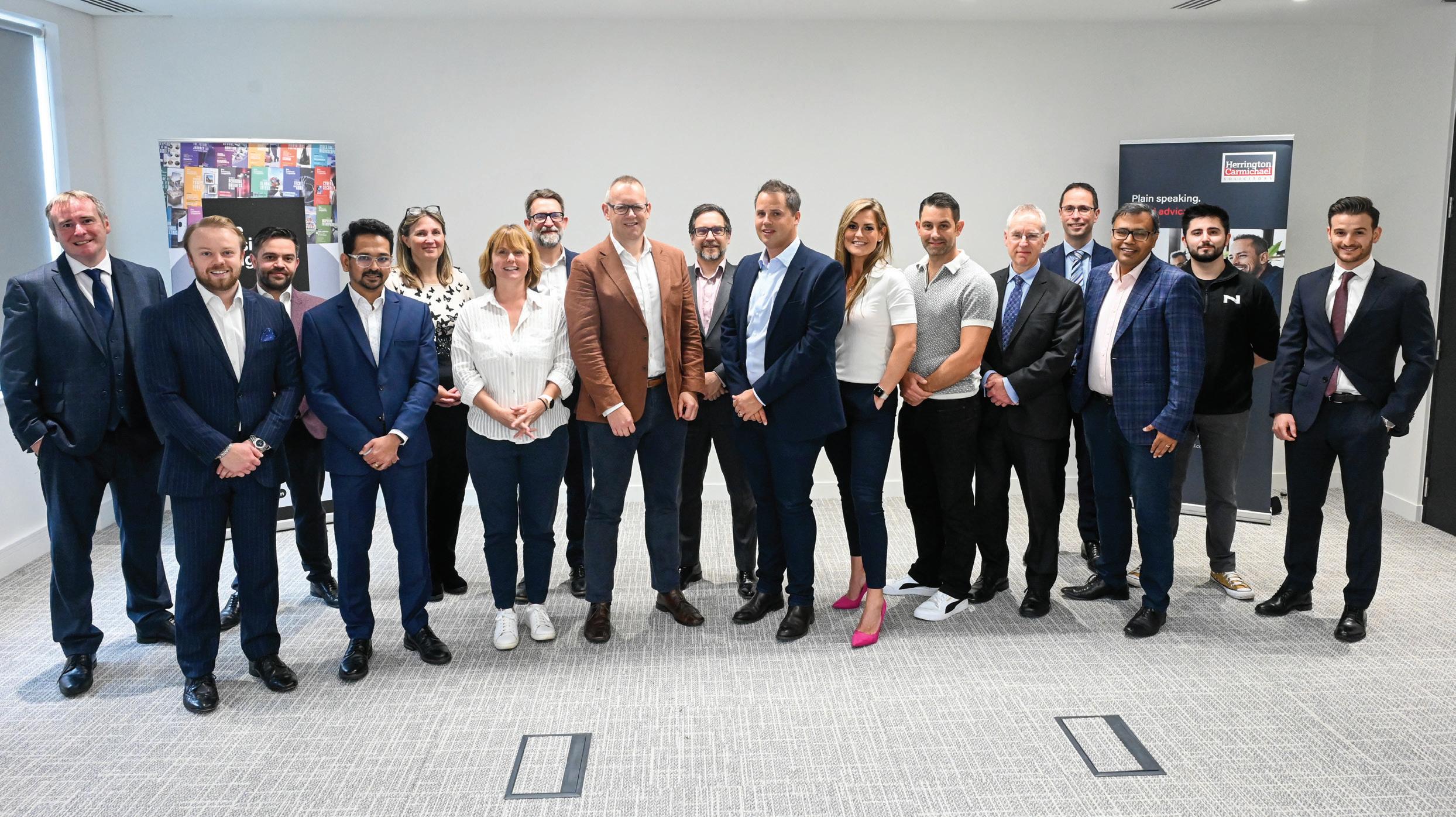

Moderator
Stephen Emerson, Managing Editor, The Business Magazine
Stephen Baker Partner & Head of Dispute Resolution, Herrington Carmichael
Darren Cheeseright Head of Technology, Procode Technology
Ian Cruickshank Managing Director, Spectrum IT
Thomas Dodd Commercial Director, entrust IT Group
Mark Chapman Partner & Head of Commercial, Herrington Carmichael
James Harcourt Founder, Novatura
Gemma Hood CEO & Founder, Culturehood
Stephen Jones Chief for Consulting, AND Digital
Matthew Lea Corporate Partner, Herrington Carmichael
Alistair McArthur Partner & Head of Employment, Herrington Carmichael
Michelle McClean Sector Growth Manager, Hampshire County Council
Raj Raghaven Co-Founder & CEO, RootQuotient
Martin Soltau Co-CEO, Space Solar
Madhur Srivastava CEO, Doc HQ
Stuart Weekes Tax Partner, Crowe UK
Tiago Veiga CEO, Aurum Solutions
Growth in the technology sector could provide a vital spark to the South East’s economic engine – however, getting all the sector’s components to fire in unison is no easy task.
The Business Magazine, in partnership with Herrington Carmichael, held a roundtable at the law firm’s Farnborough headquarters where it was agreed that the region’s tech economy has all the parts needed for growth – they just need to be put into gear.
Michelle McClean, Sector Growth Manager at Hampshire County Council, highlighted the importance of regional tech clusters and university partnerships in fostering innovation and collaboration within the tech ecosystem.
She said: “We are seeing clusters developing here that are supporting local talent and ensuring that graduates stay in the region.
“Five years ago, there wasn’t a space cluster in Hampshire and now it’s recognised as the biggest in the UK.
“This month we’re launching a defence and security cluster, led by Airbus, with a focus on cyber security.”
Matthew Lea, Corporate Partner at Herrington Carmichael, said defence would prove a key growth area for the South in the coming years.
He said: “Companies that are associated with cyber warfare, such as those preventing hacking or improving poor security, will see growth over the coming years.
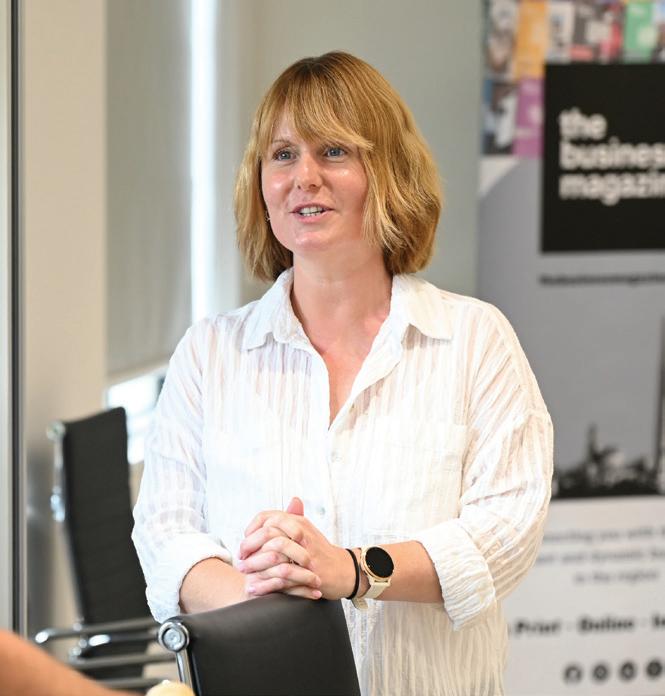
“The need for these services will be huge, especially with the geopolitical situation in the world at the moment.
“The UK is behind the curve on spending on this and will have to increase its capability.”
Ian Cruickshank, Managing Director of Southampton recruitment firm Spectrum IT, whose firm sponsors The Business Magazine’s South Coast Tech & Innovation Awards, said he was a big believer in the power of building communities, particularly in the tech sector.
He said: “We have put a lot of time and energy into building communities in the tech space.
“Our Women in Tech events in Hampshire bring people together to talk about tech and encourage confidence.
“We have had people land jobs off the back of attending these events due to the confidence it has given them.”
Hampshire County Council has also launched the Hampshire Prosperity

Partnership which has taken on much of the economic growth responsibility previously carried out by local enterprise partnerships.
Stephen Baker, Head of Dispute Resolution at Herrington Carmichael, said this was a welcome development and would help companies, particularly those at an early stage, find the advice they need when it comes to funding and growth.
He said: “Initiatives like the Hampshire Prosperity Partnership will help to provide consistency as companies have so many options when it comes to funding for growing their business.”
Darren Cheeseright, Head of Technology at Bournemouth-based Procode Technology, said that the clustering of fintech firms in Dorset had led to benefits for the wider tech economy.
He said: “During mid-2010 to 2015, there was a big explosion of fintech. As a result, the talent retained has spawned off and created their own businesses.
“The SMEs created an ecosystem that encourages collaboration.


“The talent is coming from universities and we have focused on providing pathways for these students by working with universities to make sure we have engagement with them and are on their graduate schemes.”
Clusters also create connections for services that businesses need, according to Mark Chapman, Partner and Head of Commercial at Herrington Carmichael.
He said: “The clients we have seen do very well are those that have been able to surround themselves with the right people from the start because they have had a good support network in place.
“From a legal perspective, some of the biggest decisions you make might come quite early on in the process. Even if you’re not engaging lawyers, talking to people who have been there before can be really helpful.”
The impact of remote working on innovation was also discussed round the table, with participants in agreement that a careful balance had to be struck between home and office working.

Alistair McArthur, Partner and Head of Employment at Herrington Carmichael, said that people needed to come together to work but the fact that the world had moved on since the pandemic also had to be recognised.
He said: “We’ve seen people now almost rebelling against that and coming back together again. The loss of office space will impact people, absolutely, because they won’t have the ability to come together and work.
“Amazon ordering all of their staff to get back to the office five days a week – I don’t think that’s helpful. It doesn’t encourage people to take time out and go to different environments.
“But equally there have to be opportunities for people to come together to make sure that people innovate and work together.”
The scaling back of large corporates from the Thames Valley was also discussed at the roundtable, highlighting the work of the Reading Tech Cluster, which aims to create a formal cluster in the region.
Tiago Veiga, CEO of Reading-based fintech Aurum Solutions, said: “Many of the large corporates in the Thames Valley are reducing their footprints.
“This has an impact on the tech economy and many people move from larger to smaller companies, and some also set up their own start-ups.”
Stuart Weekes of Crowe UK was optimistic that the Reading Tech Cluster could provide some focus to the Thames Valley tech sector.
He said: “I’ve been working in the Thames


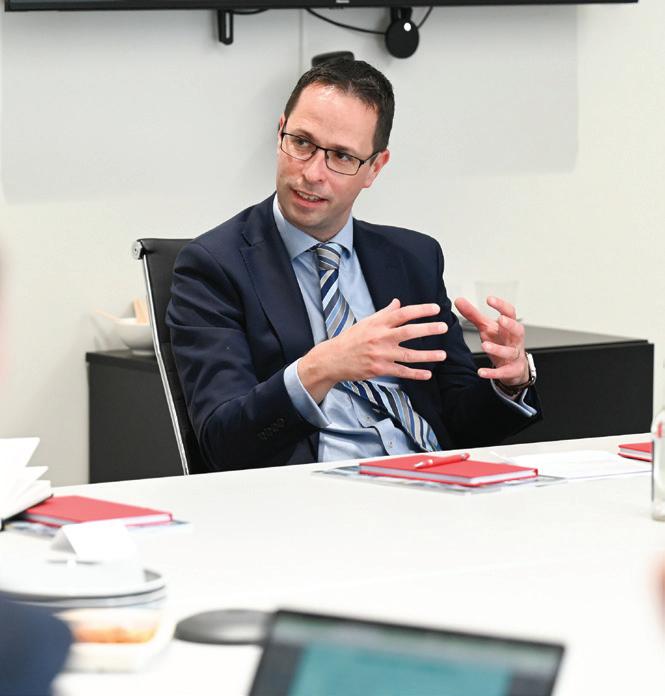
Encourage people to do things differently and create an environment where there are no stupid questions
Valley for nearly 30 years and there has always been an enthusiasm to do business together.
“I wonder whether some larger companies have taken their eye off the ball, whether they’ve lost focus, whether they’ve got too complacent?
“It is good to see a new tech cluster emerging which will hopefully bring some much-needed energy.”
While it was agreed that innovation and improvement was the key to tech growth, providing a culture of safety where experimentation can thrive was also highlighted as an essential driver.

Thomas Dodd, Commercial Director at Entrust IT Group, said: “Encourage people to do things differently and create an environment where there are no stupid questions. The thing that’s blocking people is the fear of not understanding something new, so let them try it.
“Leaders have to enable a psychologically safe environment where people feel that it’s okay to take this slight risk and that if it doesn’t work then that is okay also.
“If you encourage that psychological safety then you get more engagement and more ideas coming from more places.”
Gemma Hood, CEO and Founder of Reading-based HR consultancy Culturehood, said management was key in creating this culture and that they had to be open to a number of inputs and malleable in their outlook.
“Company culture eats strategy for breakfast,” she said.
“For businesses to be successful, they have to listen to their staff and understand what their wants and needs are.
“Leaders also need to be sponges rather than rocks deflecting feedback. They need to actively listen, be vulnerable and understand what is and isn’t working.”

The roundtable also discussed how innovation tends to thrive in smaller, founder-led companies compared to large corporates, which often resist change due to embedded systems.
Madhur Srivastava, CEO of Worcesterbased healthtech firm Doc HQ, said: “Large corporates are like an immune system and they’re used to certain things. They will reject anything that comes inside to try to change their behaviour.
“The NHS is an example of why it’s difficult. There are departments and layers that you have to work through if you are trying to work with them.
“They have a certain way of doing things and when you bring innovation in it can get rejected.”
Stephen Jones, Chief for Consulting at Berkshire-based AND Digital, said large companies had to invest in their R&D capabilities.
He said: “Experimentation is a beautiful thing, because it means you are fundamentally finding out how something works.
“You need a vision and leadership in terms of understanding the commercial return of what you are trying to do and what the customer need is that you are trying to fulfil.”
Funding is the lifeblood of innovation, with the panel discussing how companies can best access funding and what challenges they had experienced in accessing capital.

Crowe’s Stuart Weekes said it was vital that innovation is linked to constant improvements in the bottom line.
He said: “Innovation is fuelled by funding. It is great to have an innovative culture of experimentation, however if you are not getting that bottom line higher to fund the next stage of your development then you are not going to succeed.”
Space Solar has been granted more than £7 million by the government to fund its mission to develop solar technology which can harness power from space. The company is also working with a number of private investors.
The company’s Co-CEO Martin Soltau said that it was difficult to attract investors for capital intensive early-stage projects when they might have to wait a decade until they see a return.
He said: “We’re trying to solve a huge problem and top of the government’s list is how to maintain affordable energy security as we go through an energy transition.
Experimentation is a beautiful thing, because it means you are fundamentally finding out how something works
“There’s billions in green money sloshing around but no one is prepared to really go for high risk, high reward. It’s difficult to bring public and private finance together and share risk in a more ambitious way. It feels like the system is quite broken.”
James Harcourt, founder of Southamptonbased digital solutions provider Novatura, said that being ingrained within the tech ecosystem of the area in which you are based was vital.
He said: “Being affiliated with the university and the accelerators, the enterprise programmes down there, is really good for start-ups.
“In this country there are so many options. If you are looking for investors, you’ll find them here if you have a plan and can deliver returns.
“That’s what investors, in my opinion, are looking for. This is what I advise my clients. I give them a plan. If you can lay out the steps, so you’re not just saying, give me money and I’ll do something with it.”


Raj Raghavan, Co-founder and CEO of London-based software development firm Rootquotient, said: “A problem can only be solved through innovation.
“Using technology to solve a problem allows a company to differentiate itself in the market.
“To solve a problem, you need to use technology. With that use comes growth and innovation.”
Stephen Jones of AND Digital said that large game-changing technology innovations were rare and that organisations should focus on small continual improvements to their operations.
“There is massive commercial mileage in making things slightly better, as in iterative improvements,” he said.
“Whether you regard that as innovation is up to you, I don’t.
“Driving better outcomes, improving websites and applications are examples of this.
“However, breakthrough innovation, the genuine lifeblood of things, is not that common.
“It’s not something you can bank on happening in your financial year or your plan.”
The run-up period to the budget is a period of uncertainty according to roundtable participants.
The potential changes to the tax system had dented investor confidence, they said.
This magazine was printed before the government’s budget on October 30.
Stuart Weekes of Crowe UK said: “Government needs to create certainty, consistency and an environment of knowing what the future looks like.
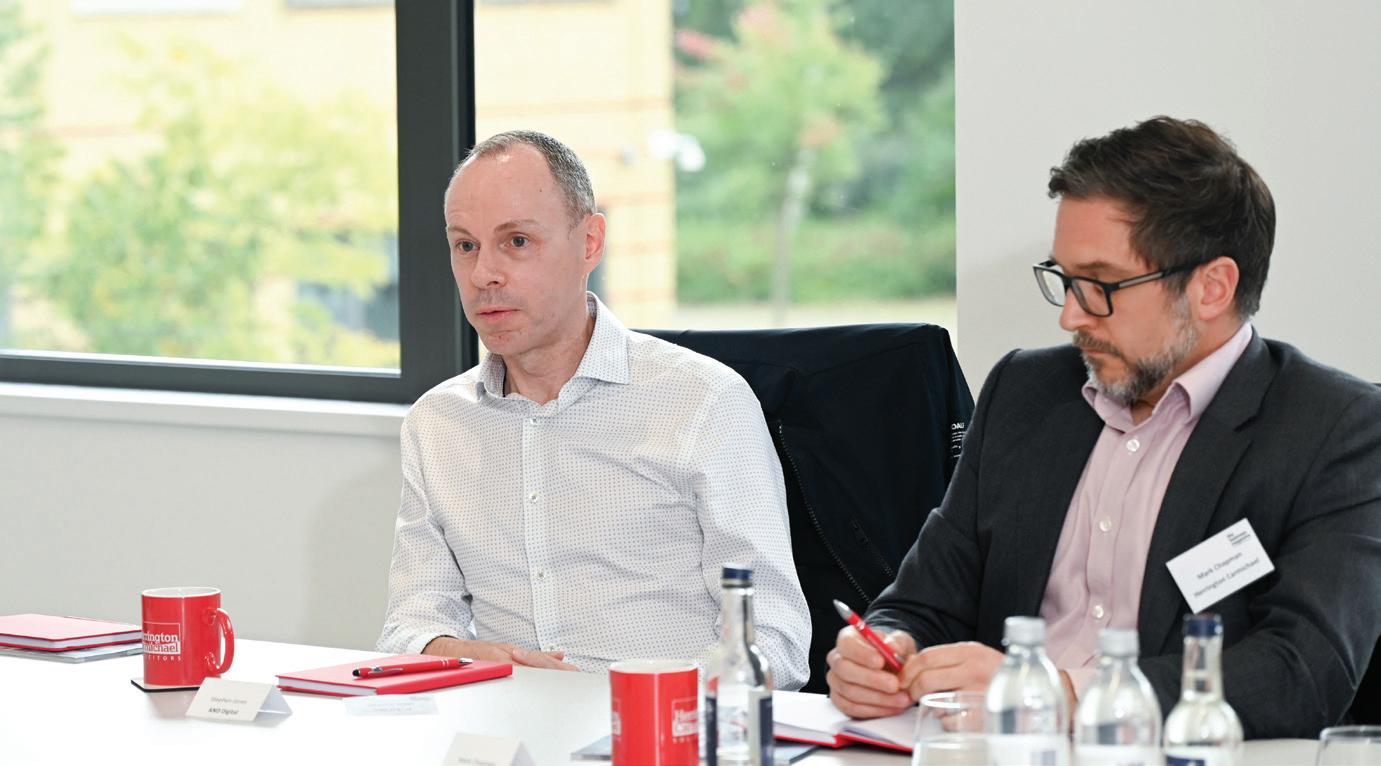
“At present there are predictions that the government will raise capital gains tax rates in the forthcoming budget, but the lack of clarity is creating uncertainty in the market. In terms of capital gains tax, currently when you sell shares in a trading company you pay between 10 and 20 per cent in tax.
“The highest published income tax rate is 45 per cent and the government is talking about aligning rates.
“Does this mean that people are going to pay 45 per cent tax when selling a business or a property?”
The first year of any new business is tough, with money tight. For many young entrepreneurs it means the prospect of dealing with a complex tax system for the first time.
James Harcourt of Novatura, whose firm spun out of the University of Southampton, said more start-ups would prosper if they were given assistance from HMRC during the early stages of their enterprises.
He said: “The tax system creates obstacles for young start-ups and creates a barrier to entry.
“There is not enough help available to help young companies through the process.”
Research and development tax credits for small and medium-sized entities (SMEs) have been curtailed in recent years due to perceived abuse within the system. However Stuart Weekes of Crowe UK said that when properly administered, tax credits could provide a much-needed economic stimulus.
He said: “R&D tax credits can be a positive stimulant, but they need to be made more accessible and beneficial.
“Lately, the move has been away from that. It’s not as beneficial for SMEs and seems to be focused more on the larger companies. The government needs to review the competitiveness of the UK’s R&D tax credits compared with R&D tax credits available in other countries, especially close neighbours such as France and Ireland.
“I’m very much in favour of tackling noncompliance within R&D tax credits.
Government needs to create certainty, consistency and try to create an environment of knowing what the future looks like



Those who don’t qualify shouldn’t claim them. Not addressing this effectively has caused problems.
“One issue at the moment is that our tax authorities have not adequately trained people to challenge those claims. Let’s improve the process of compliance.”
Collaboration is key to firing the engine of tech growth and if enthusiasm is the fuel of innovation, as demonstrated by the participants of this roundtable, then the South’s tech economy is on the right track.
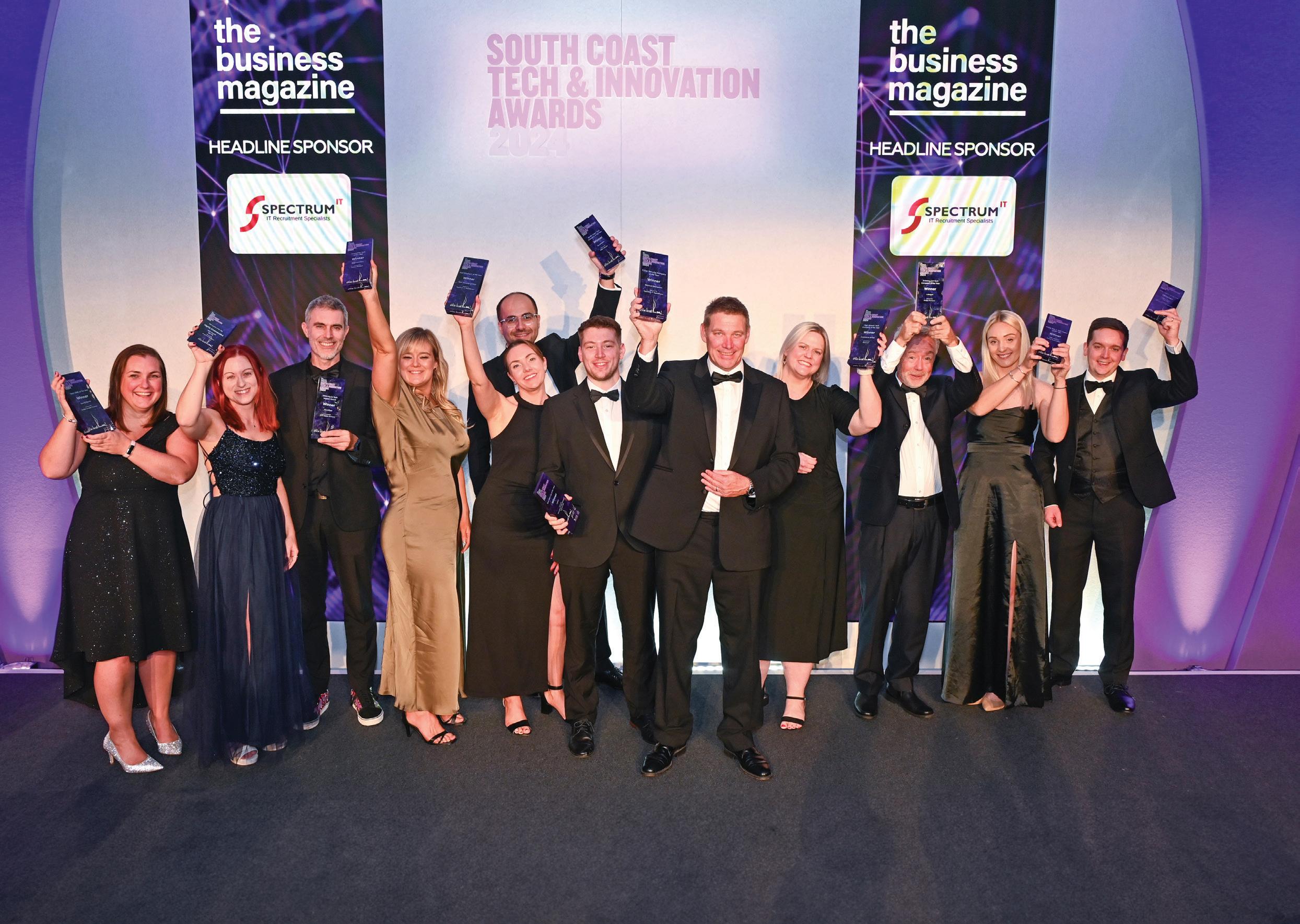
Winners from a record number of technology company entries were honoured at this year’s South Coast Tech & Innovation Awards. The judges said they were impressed with the quality of the finalists, who ranged from start-ups to industry veterans.
Richard Thompson, Chief Executive at event organiser The Business Magazine, commented: “This year, we received more nominations from more companies than ever before. You are shining examples of the diversity of tech talent in the region.”
The Awards were held at the Hilton Southampton – Utilita Bowl, home of Hampshire County Cricket Club. The headline sponsor for the event was Spectrum IT Recruitment


The category sponsors were BDO UK, James Cowper Kreston, Blake Morgan LLP, Evelyn Partners, University of Southampton Science Park, YFM Equity Partners, South Coast Institute of Technology and The Business Magazine
The all-important independent judges who scrutinised the selection of finalists were Matt Johnson from the South Coast Institute of Technology and Steve Northam from Northamtec Investments & Holdings
The Awards were also a fundraising opportunity to support local charity, the Wetwheels Foundation. The Portsmouthbased charity was set up in 2011 by disabled yachtsman Geoff Holt MBE DL to provide opportunities for disabled people

of all ages to enjoy the freedom of being on the sea. It takes about 3,000 disabled people on the water every year and now has eight boats around the country.
Media entrepreneur, podcaster writer and performer Cally Beaton hosted the gala evening.




CYBER SECURITY COMPANY OF THE YEAR
WINNER: Beyond Encryption
SPONSOR: Spectrum IT Recruitment

MARINE/PORT TECH COMPANY OF THE YEAR
WINNER: Actisense
SPONSOR: The Business Magazine


TECH START UP OF THE YEAR
WINNER: Labl.it
SPONSOR: University of Southampton Science Park





INNOVATIVE TECH COMPANY OF THE YEAR
WINNER: AugmentAero
SPONSOR: Evelyn Partners

DIVERSITY IN TECH IMPACT AWARD
WINNER: Sumillion
SPONSOR: YFM Equity Partners





TECH SME OF THE YEAR
WINNER: Savvy Navvy
SPONSOR: James Cowper Kreston
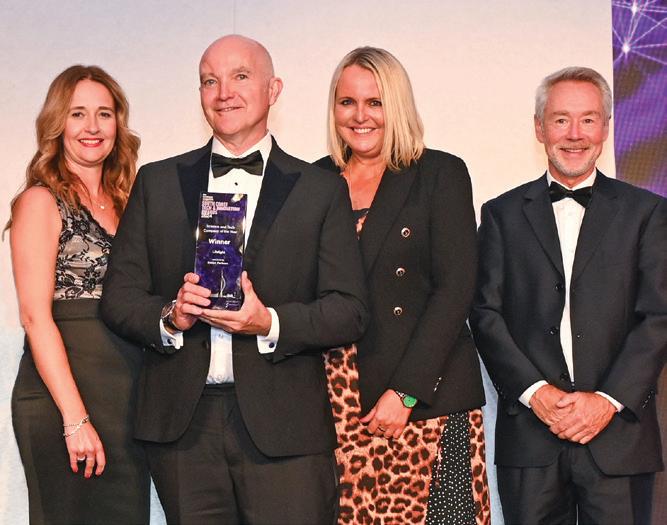
SCIENCE & TECH COMPANY OF THE YEAR
WINNER: Lifelight
SPONSOR: Evelyn Partners


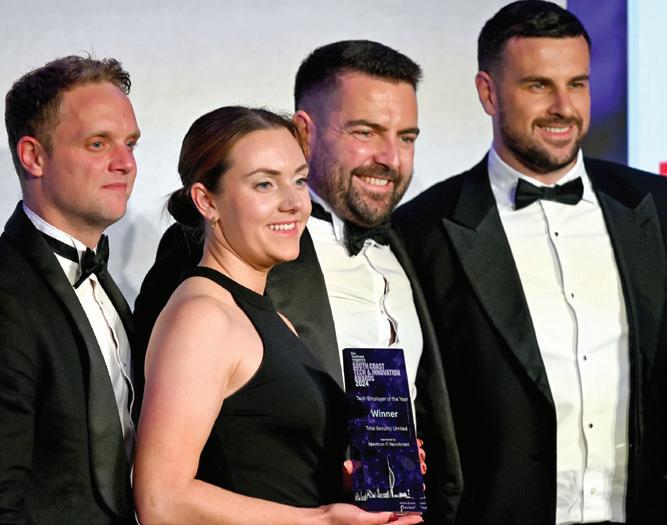
TECH EMPLOYER OF THE YEAR
WINNER: Total Security
SPONSOR: Spectrum IT Recruitment

RISING STAR IN TECH AWARD (UNDER 35)
WINNER: Ellie Merrick, Vizst Technology
SPONSOR: South Coast Institute of Technology





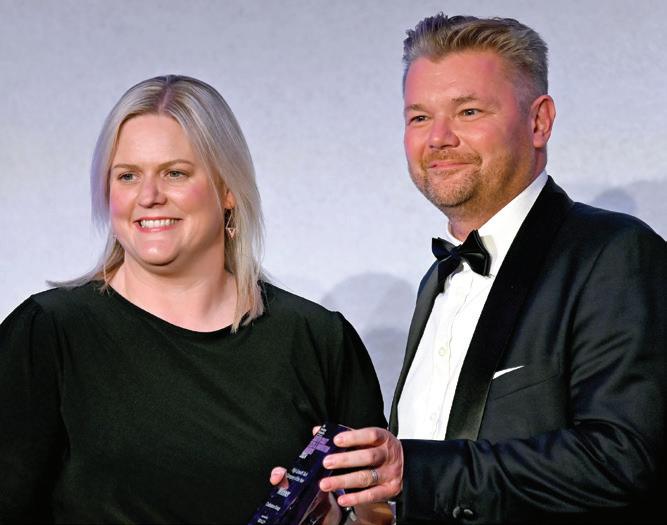
HIGH GROWTH TECH COMPANY OF THE YEAR
WINNER: Codestone Group
SPONSOR: BDO UK


SUSTAINABLE TECH COMPANY OF THE YEAR
WINNER: Universal Collaboration Research
SPONSOR: University of Southampton Science Park


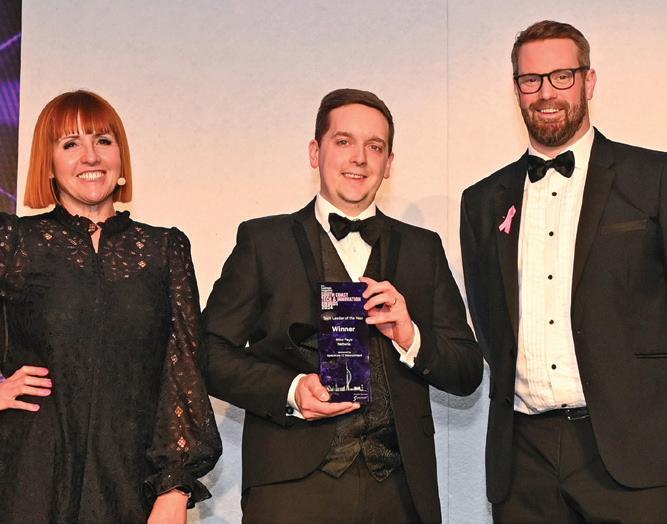
TECH LEADER OF THE YEAR
WINNER: Mike Paye, Netwrix
SPONSOR: Spectrum IT Recruitment

SOUTH COAST TECH COMPANY OF THE YEAR
WINNER: TouchNetix
SPONSOR: Blake Morgan LLP



TECH LEADER OF THE YEAR
HIGHLY COMMENDED: Sarah Neenam, IBM CIC
SPONSOR: Spectrum IT Recruitment
TO READ MORE ABOUT THE WINNERS USE THE QR CODE





Lush Manufacturing in Poole welcomed 150 students from local schools and colleges as part of the celebration of National Manufacturing Day in September, organised by Make UK.
The students were given a range of practical activities designed to showcase the potential careers in manufacturing and STEM (science, technology, engineering and mathematics) in Dorset.
The students, from Queen Elizabeth’s School, Magna Academy, St Edward’s School, SWRAC training centre and Linwood College, tried making products in Lush’s Bubbles Department.
They also heard from experts in fields such as microbiology, digital technology and 3D printing gaining insights into diverse career paths.
Lush, known for its fresh and handmade products, took students into its Green Hub, where they learned about environmental waste management and creating a circular economy.
Hayley Jones, Careers Advice and Guidance Manager at Queen Elizabeth’s School, said: “Our students always thoroughly enjoy and benefit from their

experience on National Manufacturing Day at Lush.
“It is wonderful for students to see how many different career options there are.”
Lush has been a staple of Poole’s manufacturing sector since 1995, producing more than 33 million products each year, including 13 million bath bombs. The company is one of the largest employers in the area, with 690 permanent staff.
Daniel Hendey, Lush Manufacturing Director, said: “Being a handmade manufacturer means that people are at the heart of our business. We believe in happy people making happy soap, and at Lush we take pride in the careers we are able to offer.
“We’ve really enjoyed opening our doors on National Manufacturing Day and showing our local community how much we have to offer.”
Hampshire’s STEM Returners has now helped 500 professionals return to employment after a career break.
The company works with leading STEM (science, technology, engineering and mathematics) organisations to host shortterm paid employment placements for people who have been out of work for some time.
Candidates undertake real work experience in a specific role, and at the end of the placement they have the opportunity to become permanent members of staff.
Natalie Desty founded STEM Returners in 2017 after she saw how hard it was for STEM professionals to return to work if they had a gap in their CV.
She said: “After working in recruitment for many years, I wanted to provide an inclusive way back for those talented people who were being let down by outdated recruitment methods.”
Natalie first established a small pilot returners programme with BAE Systems in Portsmouth.
It was a success for both returners and BAE Systems, and since then other big companies from the engineering, aerospace, renewables, tech and construction sectors have launched returners programmes across the UK and Ireland.

David from Southampton recently took part in a programme with global security company Leonardo as a systems engineer.
He had previously taught STEM subjects at college and holds a PhD in mathematics and two master’s degrees in data science and operational research from the University of Southampton. He wanted to use these qualifications and his skills in industry. However, he found that the transition became an uphill battle.
David said: “One of the challenges I faced was the combination of my age, unemployed status and my lack of recent experience in the industry.
“Initially, I doubted whether I’d be a good fit for a position at Leonardo, as I didn’t have any formal experience as a systems engineer.
“I was thrilled to be proven wrong. This opportunity has been transformative for me. Often, all we need is a chance to prove our potential. For many skilled and capable individuals, age or a career break can feel like significant barriers, but the programme gave me and the hiring managers the time to assess whether I
would be a good fit for the company.” Research from STEM Returners shows the challenges people face when trying to return to work following a career break, with recruitment bias against age, gender and recent experience being the main barriers to entry.
STEM Returners’ programme aims to eliminate these barriers by giving candidates real work experience and mentoring during their placement, as well as supporting them in adjusting to life back at work.
Natalie added: “For too long, returners have faced bias in the recruitment system and been penalised for a career break.
“We’re making some progress however, and this significant milestone is a testament to the hard work of every member of the team and the organisations who share our passion of creating a more inclusive recruitment process.
“Only by working together will we make vital changes in STEM recruitment, to help those who are finding it challenging to return to the sector and improve diversity and inclusion.”
Work being done to address skills shortages and grow the economy of Kent and Medway which has been detailed in its local skills improvement plan (LSIP), has been commended by the minister for skills, Baroness Smith.
The government-funded LSIPs aim to bridge the gap between education and industry, ensuring a skilled workforce that meets the region’s economic needs. The Kent and Medway LSIP is one of 38 across the country.
A recent progress report from Kent Invicta Chamber of Commerce spotlights the achievements and initiatives delivered since it was
launched in 2022. Among them has been more than £8 million of investment to support skills, education and training programmes aligned with the specific requirements of local businesses.
Tudor Price, CEO of Kent Invicta Chamber, said: “The willingness and desire of stakeholders to collaborate constructively for the benefit of the business community and the wider economy has been exemplary.
“Engagement with business will continue to play a vital role in the LSIP’s future activities and achieve even greater outcomes for Kent and Medway.”

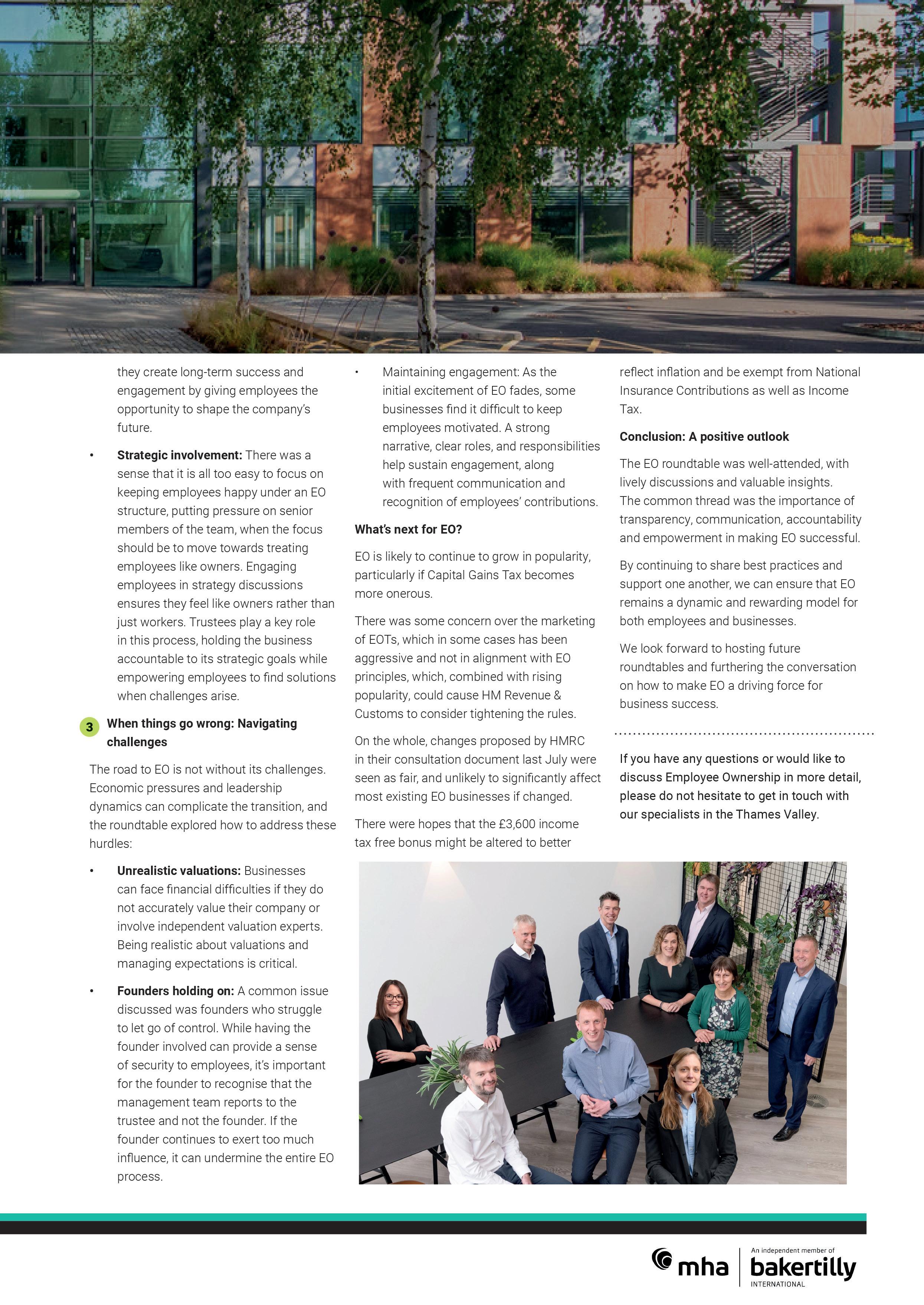
SEPTEMBER 2024 | (UNDISCLOSED)
Forklift dealer Stacatruc (Berkshire)

has completed an MBO backed by YFM Equity Partners (Yorkshire)
Sellside advisers include Interpath, James Cowper Kreston, Shoosmiths, Bishop Fleming, Cadence, Lockton, Catalysis, Sheridans, Fairgrove
SEPTEMBER 2024 | £1.35BN
Cala Homes (Surrey)

is to be acquired by Sixth Street Partners and Patron Capital
Buyside advisers include EY (financial), Eastdil Secured (financial), Travers Smith (legal), Simpson Thacher & Bartlett LLP (legal)
AUGUST 2024 | (UNDISCLOSED)
Condiments brand Condimaniac (Kent)

has received investment from Hurtwood Capital (Surrey)

has been acquired by Law firm Blandy & Blandy (Surrey)

has been acquired by Biotech firm Recursion (US)
Buyside advisers include Allen & Company (financial), Wilson Sonsini (legal)
Sellside advisers include Centerview Partners (financial), A&O Shearman (legal)
AUGUST 2024 | (UNDISCLOSED) AUGUST 2024 | (UNDISCLOSED)
Hartswood Films (Surrey)

has been acquired by ITV Studios (London)
Buyside advisers include CMS (legal)
Sellside advisers include Houlihan Lokey (financial), BDO (tax), Wiggin (legal)
Oxford Online Pharmacy (Oxfordshire)

has received investment from Rockpool Investments (London)
Buyside advisers include Bracher Rawlins, Crowe, Claritas, PwC Strategy&,Catalysis Advisory, Palladium Digital
Sellside advisers include Headpoint Advisors (corporate finance), Lodders (legal), PwC, Parisi Tax

has been acquired by Modella Capital (London)
Buyside advisers include Pinsent Masons (legal), Moore Kingston Smith, RJP
Sellside advisers include Raymond James (corporate finance), Cleary Gottlieb (legal), Strategy& (commercial DD), PwC, KPMG
AUGUST 2024 | (UNDISCLOSED)
Estate agent GPEA Limited (Dorset)

has been acquired by The Property Franchise Group (Dorset)
Buyside advisers include Trethowans

AUGUST 2024 | (UNDISCLOSED) AUGUST 2024 | (UNDISCLOSED)
Commercial hire firm Four Jays Group (Kent)

has been acquired by Heathcote Holdings (Kent)
2024 | (UNDISCLOSED)
L&S Waste Management (Hampshire)

has been acquired by Biffa (Buckinghamshire)
Sellside advisers include Azets (financial), Blake Morgan (legal)
AUGUST 2024 | £17.3M
Clean tech firm Sunswap (Surrey)

has secured investment led by BGF (London)
Buyside advisers include Panmure Liberum (financial)
Business services firm Oakford Advisors (Oxfordshire)

has been acquired by Alternative investor Centralis (Luxembourg)
Sellside advisers include Freeths (legal), James Cowper Kreston (corporate finance)
| (UNDISCLOSED)
Fencing contractor Littlewood Group (East Sussex)

has been acquired by Utilities provider Network Plus (Manchester)
Sellside advisers include Shakespeare Martineau (legal), FRP Advisory (corporate finance)
AUGUST 2024 | (UNDISCLOSED)
Monarch Chemicals (Kent)

has been acquired by Chemical distributor Brenntag (Germany)
Buyside advisers include Addleshaw Goddard
Sellside advisers include RWK Goodman, Barnes Roffe
AUGUST 2024 | (UNDISCLOSED)
Property consultancy BCM (Hampshire)

has merged with Property consultancy Wilson Hill (Hampshire)
Telecoms provider Silver Lining (Hampshire) SEPTEMBER 2024 | (UNDISCLOSED)

has been acquired by Telecoms provider Focus Group (West Sussex)
SEPTEMBER 2024 | (UNDISCLOSED)
Crown Precision Engineering (Buckinghamshire)

has been acquired by Manufacturer Beakbane (Worcestershire)
Sellside advisers include KBS Corporate

We take a detailed look at some transactions which have taken place over the past two months

Global investors Sixth Street and Patron Capital have signed an agreement to jointly acquire Cala Homes from Legal & General.
Based in Staines, Cala’s operations span the South of England, Cotswolds and Scotland, with around 3,000 new homes all due for completion by the end of the year.
The sale has an enterprise value of £1.35 billion and is expected to complete this year.
CEO Kevin Whitaker said: “We look forward to developing a strong partnership with Sixth Street and reigniting the excellent relationship we shared with Patron between 2013 and 2018.
“I’d like to thank Legal & General for their support since they first invested in Cala.
“With their backing, Cala has successfully tripled the number of homes we build each year, while revenue and profits have grown five and tenfold respectively.
“Cala is in a strong position to go forward, with new ownership and a platform to deliver our next stage of growth.”
Julian Salisbury, co-chief investment officer at Sixth Street, added: “Cala has a bright future and we’re proud to be entering this new chapter as stewards of a company with such a deep history and long track record of sustainable growth.
“We, together with Patron, look forward to continuing to support Cala and its management team – not only with capital, but also with the significant resources of our London-based real estate investment team led by Giulio Passanisi.”
Oxford business services company Oakford Advisors, has been acquired by Luxembourg-based alternative investor Centralis.
Oakford provides back-office services to start-ups and businesses within the financial services industry, with a particular focus on small and mediumsized businesses in investment management.
The deal will allow Centralis to bolster the breadth of its clientele and services internationally.
Oakford was advised on the deal by Freeths. Partner and head of corporate Leon Arnold led the team alongside associate Charlotte Collard.
They were supported by partners Claire Boyce and Stephen Jones, managing associate Nur Alzubeydi and trainee solicitors Dean Kansu, Freya Squizzoni and Dhruv Shah.
Leon said: “It’s been a pleasure to advise the shareholders of Oakford on its sale to Centralis.
“This transaction with Oakford will be pivotal in helping to secure further international growth for Centralis since the company launched in 2017.”
Jeremy Whetter, managing director of Oakford, added: “We’re extremely excited to be joining the Centralis Group, and I’m incredibly proud of what the Oakford team has achieved in the last seven years.
“We’re very grateful to Leon, Charlotte and all the Freeths team for their professionalism and focus in getting the transition executed.
“We’ve received excellent advice and service along the way and have been very appreciative of their support.”

Pharmaceutical company Exscientia has agreed to an acquisition by Recursion, a biotech from Utah, in a transaction worth $688 million.
The deal comes as major firms look to AI –as deployed by Oxford-based Exscientia in its pioneering drug discovery platform – to accelerate drug development.
Dr Chris Gibson, co-founder and CEO of Recursion, will head the newly-combined company.
“We believe the proposed combination is deeply complementary and aligned with our missions to industrialise drug discovery to deliver high quality medicines and lower prices for consumers,” he said.
“Exscientia’s precision chemistry tools
and capabilities, including its newlycommissioned automated small molecule synthesis platform, will augment our techenabled biology and chemistry exploration, hit discovery and translational capabilities.
“I’m excited to continue building the best example of the next generation of biotech companies. It still feels like we’re just getting started.”
Once integrated, the companies believe the extended Recursion Operating System will enable the discovery and translation of higher quality medicines more efficiently and at a higher scale through their small molecule discovery platform.
The combined business expects to publish results from around 10 clinical trials in the next 18 months, collaborating with top global firms including Roche-Genentech, Sanofi, Bayer and Merck KGaA.
There’s also the potential for approximately $200 million in milestone payments from partnerships over the next two years, as well as potential for more than $20 billion

in revenue before royalties on net sales of partnership programmes.
Centerview Partners acted as financial adviser to Exscientia and A&O Shearman provided legal advice.
Allen & Company and Wilson Sonsini advised Recursion.
YFM Equity Partners has supported the management buyout of Stacatruc, a forklift specialist with a 40-year pedigree.
Based in Thatcham, Berkshire, Stacatruc provides forklift hire, sales, maintenance and finance services for machines both new and used.
Joint managing directors Phill McConnell and Paul Vousden have now led a successful secondary buyout from Merino Capital, which acquired Stacatruc in 2021.
The investment from YFM will help the business capitalise on its recent acquisitions in the hire and service sector and further expand its geographical footprint.
To drive this plan, Darron Cavanagh –previously CEO of VPS Group Security
Services and managing director at Elliott UK – joins as chair of Stacatruc.
Phill said: “This investment is not just about financial growth – it’s about enhancing the quality of our service and the satisfaction of our customers. Together with YFM, we’re ready to take Stacatruc up a gear, ensuring that we retain the support our customers need when they need it.”
Paul added: “YFM have paved the way for the next phase of our company’s journey.
“Their financial and strategic support will enable us to realise our ambitions faster as we seek to provide the best, most costeffective solutions for a growing number of customers across a wider territory.”
The YFM team included investment director Matt Gordon-Smith and investment manager Callum Long.
Matt said: “As an investment prospect, Stacatruc demonstrated a winning combination of longevity and ambition.
“We’re excited to be backing a management team who are highly entrepreneurial.
“They have delivered growth by responding successfully to market conditions and live acquisition opportunities.
“We look forward to supporting the team as it builds upon this success.”
Interpath Advisory assisted the sellside shareholders, with a team led by Neil Sumner and supported by Nick Hill, Reuben Taylor and Luke Thomson.
Arbuthnot Commercial ABL provided funding facilities to support the buyout.


Metro Bank works with key partners to open up funding opportunities for small and medium-sized companies.
The relationship between a business and its bank can be one of its most valuable assets and while it may not register its worth on a balance sheet, it can prove invaluable in helping firms navigate the ups and downs of the business world.
We spoke to David Clegg, Founding Partner and Head of Client Relations at AMS Group and Mark Davies, Director of Commercial Banking at Metro Bank about how companies can best access funding.


Manchester-based AMS Group works closely with Metro Bank to introduce customers who are looking for funds to grow their business, refinance debt or assist with succession planning.
Metro Bank is a relationship banking specialist and has a presence across England and Wales with a substantial presence in the South East.
AMS Group, established in 1982, is a national full-service professional services firm specialising in creating value for mid-market companies. Differentiating themselves by investing in client relationships through Relationship Managers, personality-profiled to each client.
Their award-winning teams deliver services across Audit, Accounting, Tax Advisory,
Corporate Finance, Debt Advisory, Business Recovery and HMRC dispute resolution.
Is it not hard for companies to get money from banks?
David Clegg: "It comes down to how you package the deal and your relationship with the bank. We make sure that we put the client's best foot forward in terms of what that funding proposition looks like.
"You've got to have a bank that's got the appetite to get money out of the door and Metro Bank certainly is that bank at this moment in time."
How does the process work?
David Clegg: "We recently completed a £7m deal with one of our clients in the healthcare sector, the success of this was down to our strong partnership with Metro Bank who understand and are active in that area.
"Business Development Director at Metro Bank Danny Pennington, worked closely with Ali Raza, Debt Advisory Direct at AMS Group to structure the deal and engage with the client.”
Mark Davies added: "We brought the full resources of Metro Bank to this transaction including our healthcare specialist who worked closely with Ali and Danny to find the right solution for the client. Members of our Corporate Finance team and a debt advisory specialist also worked on the transaction to fully understand the client’s business and needs.
"One of our strengths at Metro Bank is having sector specialists, including healthcare, as well as local Relationship
Managers who have deep knowledge of the areas that they work in."
What is different about Metro Bank?
Mark Davies: "Our point of difference is relationship management and taking the time to listen to the customer and their advisors. We work with David and the team to help them achieve what they want from the transaction.
"Our business is evolving to best face the market correctly and making sure that we've got local Relationship Managers who understand those local markets."
David Clegg: “We operate in the midmarket and often find that this segment is underserviced in terms of advisory capability from a debt and growth perspective. Clients at this level want a relationship-based approach to their banking. When the clients come to us, they trust us to act in their best interests and we ensure that we place them with a bank that shares the same ambition as they do. It's incredibly important because we need to know that the bank is going to look after our client.
"This trust underpins the relationship with AMS Group and Metro Bank.”
What feedback do you get from clients?
Mark Davies: "They like the fact that we are pragmatic, and more importantly, they like the fact that we have got an appetite to lend money. We like to think that our relationship approach is centred around taking the time to listen. We value honesty and aim to be seen as a trusted partner throughout the process."
To find out what funding opportunities Metro Bank can offer your business, visit metrobankonline.co.uk/commercial-referrals
Lending is subject to eligibility criteria, terms and conditions apply.


01 SpyBiotech appoints CMO
Oxford-based SpyBiotech has appointed Dr Prakash Bhuyan as Chief Medical Officer as it looks to develop its platform technology that can target infectious diseases, cancer, and chronic diseases. Dr Bhuyan is an infectious disease specialist with more than 20 years’ experience in academia and industry.

02 MSP Capital makes senior appointment
Property finance lender MSP Capital has promoted two senior team members to its board of directors. Nicky Hollamby and Lee Merrifield, who both joined the Poolebased firm in 2017, step up from associate director roles having taken on extra strategic responsibilities in the past year.

03 Baggette + Co appoint new marketing head
Dorset wealth management firm Baggette + Co has appointed Lee Taylor (centre, pictured with CEO Oscar Hjalmas and Managing Director Jo Hjalmas) as head of marketing. Lee has spent 20 years in professional services marketing, working with national and regional law firms –including Irwin Mitchell and Mills & Reeve.

04 Tokamak Energy makes senior engineering appointment
Oxfordshire’s Tokamak Energy has appointed engineer Itxaso Ariza as the fusion firm’s first chief technology officer. She previously spent 19 years at British engineering giant Rolls Royce and was chief engineer in the group’s civil aerospace division for the last seven years.
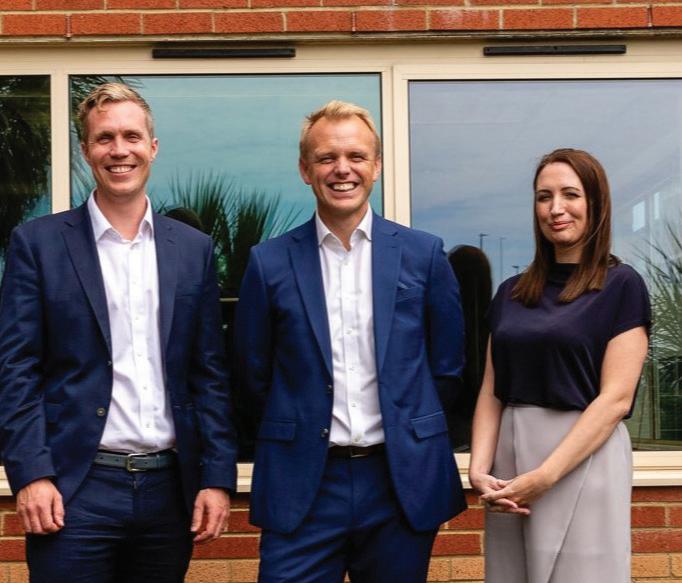

Oxford-Harrington Rare Disease Centre appoints Baroness Blackwood
The Oxford-Harrington Rare Disease Centre has appointed Baroness Nicola Blackwood to its advisory council. A partnership between the University of Oxford and the Harrington Discovery Institute at University Hospitals in Ohio, the OHC looks to drive cutting-edge breakthroughs in rare diseases.

Blandy & Blandy announces senior hire
Thames Valley law firm Blandy & Blandy has appointed Minnaar Badenhorst as an associate solicitor in its wills, probate, tax and trusts team. With 17 years’ experience as a private client solicitor in England following a career as a lawyer in South Africa, Minnaar joins from an established firm based in Hampshire.
07 Lester Aldridge makes addition to real estate finance team
South Coast law firm Lester Aldridge has welcomed Zara Goh to its real estate team as a senior associate. Zara, who brings more than 10 years of experience, will be part of the firm’s borrower real estate finance team, specialising in commercial real estate and property finance.

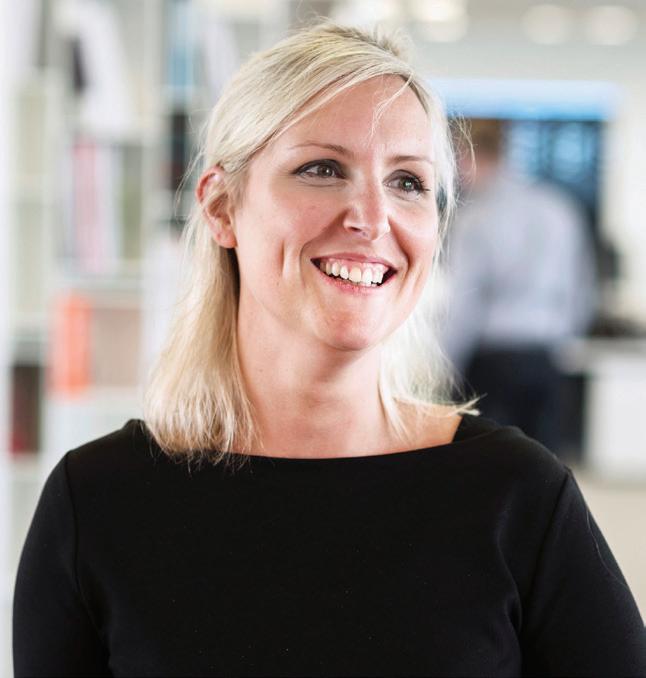

11 Hendy welcomes Duncan McPhee to COO role
Eastleigh-based Hendy Group has appointed Duncan McPhee to the new role of Chief Operating Officer (COO). The move further strengthens the executive board in preparation for the organisation’s next phase of growth. He will join the business in October and will report direct to the Chief Executive of Hendy Group, Paul Hendy.

OXB appoints CFO
OXB (formerly Oxford Biomedica), a cell and gene therapy firm, has welcomed Dr Lucinda Crabtree as chief financial officer. Lucinda had been serving as CFO of MorphoSys AG, where she led a finance team across the US and Germany until the company’s acquisition by Novartis. Before that, she was CFO at Autolus Therapeutics, a Nasdaq listed clinical stage biopharmaceutical company.
10 Kent’s Logical Biological names new CEO
Logical Biological, a provider of biospecimens based at Kent’s Discovery Park, has announced Stephane Argivier as its new CEO. Stephane will lead the next stage in the company’s expansion and succeeds founder Dr James Steggles, founder of Logical Biological, who will stay on as chair of the board.
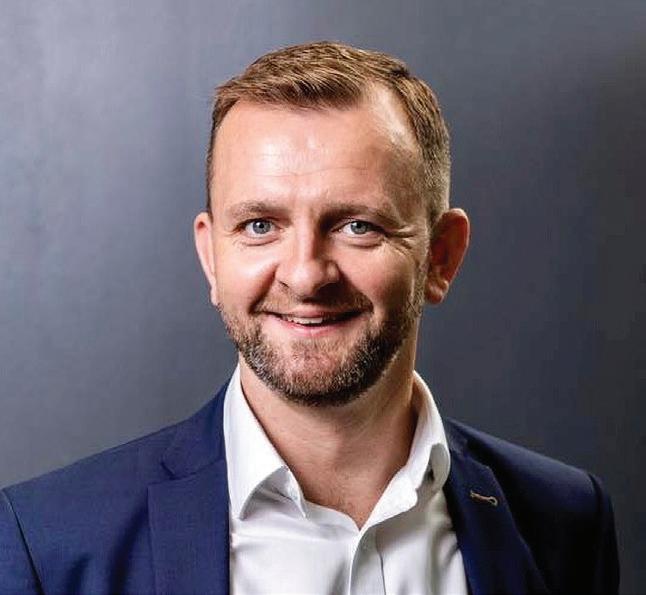
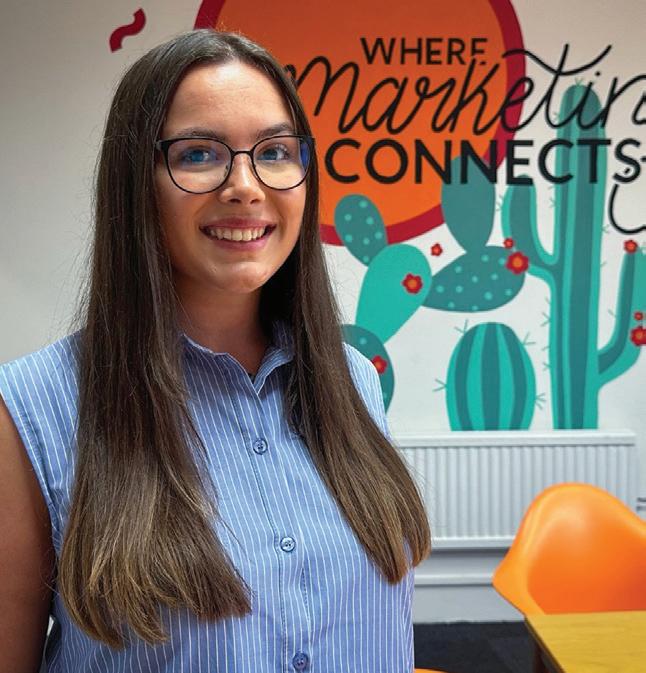
09
Carswell Gould boosts martech capabilities
Carswell Gould has welcomed Mia Parmiter as the Southampton agency’s newest marketing account manager. Mia brings experience gained from previous work on technical projects, data analytics, consulting and client relationship management. Having studied business management with marketing at Cardiff University, Mia launched her career with Clevertouch Marketing, building a skillset in marketing technology.
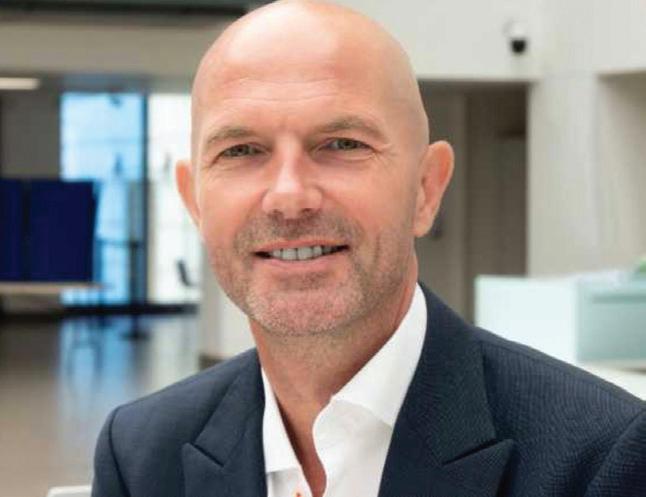
12 Surrey County Council appoints chief executive
Terence Herbert has been named the new chief executive of Surrey County Council. He joins from Wiltshire Council, where he was appointed chief executive in June 2020. Terence has held other senior leadership roles, including head of service for safeguarding, associate director for children’s services, executive director for children and families, leisure and communities, corporate services, HR and organisational development.

Moore Kingston Smith has long been supporting the mid-market and is a leading accountancy firm working with owner-managed business (OMB) and private equity backed companies. It has had a base in West London, close to Heathrow, since 1973, which is led today by partners Jonathan Seymour and Jon Roberts – and plans to double their Thames Valley presence over the next five years are underway.
“We understand that OMBs, particularly in today’s environment, face a variety of challenges and concerns, such as declining confidence and investment, a talent shortage, market uncertainty and taxation concerns. We bring a wealth of tools, connections, and expert guidance to help them navigate these challenges and achieve their strategic objectives.” says Audit Partner Jon Roberts.
Those at the helm of OMBs work tirelessly, often for decades, building their businesses. At pivotal moments – such as acquisitions, securing additional finance or preparing for a sale, owners must place their trust in their advisers to navigate the way forward.
It’s this trust of OMB leaders that the team at Moore Kingston Smith has set their sights on building as a key pillar of their expansion plans in the Thames Valley.
Along with Jon, we caught up with Stephen Orriss and Mike Orton about their plans to drive forward the growth of the Heathrow office and support the Thames Valley business community.
Having worked in M&A for over 30 years, Corporate Finance Partner Stephen Orriss said: “People running OMBs have often dedicated their lives to their business, putting their all into it.
They’ve created it, invested money and sweat, and they then have to place their trust in advisers to sell what they’ve built up. The majority of their wealth is tied up in this asset and now they’ve got to realise it. We understand that can be a really tough, emotional decision.”
The team say sellers quickly conclude whether they trust the adviser they’re speaking to.
Mike Orton, a corporate finance partner specialising in transaction services, explains: “We are open and transparent from the get-go. We don’t take on projects unless we are confident they’ll reach a successful conclusion.”
Mike, who joined Moore Kingston Smith after spending much of his career in due diligence-focused roles at Grant Thornton, said: “We get that it’s not easy. It’s our job to help, give commercial advice and be objective, challenging, where necessary, to ensure the best outcome.
“Supporting the success of our clients is at the heart of all we do as a firm.”


The team say they appreciate they’re amongst other established firms in the region.
They believe that having existing relationships among the community and an established client base, developed over many years, as well as local insight, combined with the multi-faceted expertise of the firm and international reach provided by the Moore Global network, creates a strong proposition for existing and potential clients to leverage.
Jon, who spent 18 years at BDO before joining Moore Kingston Smith as a partner, said: “While we’re up against some well-known faces, we bring a personal approach, backed by our size and scale. We build strong relationships with our clients and take time getting to know them and understand their aspirations.”
Stephen Orriss added, “We focus on the people within deals, the highest price may not provide the best answer. We look at things holistically.”
The firm, part of the Moore network and the 11th largest in the UK, which recently welcomed Guy Taylor, a specialist in debt advisory services, is keen to impart its experience of working with OMBs and private equity backed businesses to the region. The team’s expertise will help owners achieve their growth ambitions and get the best value for their business.
Stephen said: “Owners need to begin preparations around 18 months before the date they want to sell. FDs and CFOs have been doing much more than simply operational finance for a while now, particularly in the OMB space that we operate in. We’re there to provide a sounding board and support them through the challenges and complexities of a process.”
Jon Roberts added that the depth of Moore Kingston Smith’s resources, expertise and capabilities complement the team’s local insight and regional focus. He said: “We have over 1,000 people working across multiple disciplines in London and the surrounding areas, and recently expanded further afield, with acquisitions in Ireland and Northern Ireland.
“The collaborative nature of the firm means our clients benefit from a wide pool of professional services specialists. Whether they require advice in international tax matters, valuation and financial reporting guidance, or digital transformation, to name a few, our expertise is from an established bench of connected people and teams, readily available to them.”
The Moore Kingston Smith team says the collaborative professional services sector is one of the Thames Valley’s strengths, particularly when it comes to encouraging the flow of private equity money into the region’s businesses.
Stephen Orriss said: “Private Equity seeks places to deploy their cash. They are looking for good quality businesses, and despite all the issues faced in a challenging environment, they still need to deploy that cash. The Thames Valley continues to be an excellent region to invest.”
The past 18 months have seen a leadership transition with Matt Meadows becoming Managing Partner following Maureen Penfold’s retirement. Having taken on private equity investment in 2023, whilst retaining operational control and a traditional LLP structure – a combination of which is unique in the professional services market – the firm has continued to grow its offering to better serve clients’ needs in a changing world, while investing in its people and innovation.
Jon explains that this lived experience means the team appreciates the importance of finding the most suitable PE partner for the business. He said: “It’s about matching the right VC or private equity investor with the right business. It must be a good fit.
“We’re living and breathing private equity investment ourselves. We can bring that experience to our clients.”
The team say they are building on the Heathrow office’s strong foundations and will continue to attract more talent as momentum gathers.
Jon Roberts said: “If you look at the management teams in the Thames Valley and the quality of the businesses across several sectors, there is so much opportunity for us to support their growth.
“The Thames Valley is a sophisticated market. We can leverage our relationships, experience, particularly in the tech and media space, and bring real value to those who are scaling up and selling their business.”
With passion and an understanding of the local business community, a network of connected experts and a growing team, Moore Kingston Smith is well placed to achieve its growth plans through supporting owner-managed and private equity backed businesses in the Thames Valley.
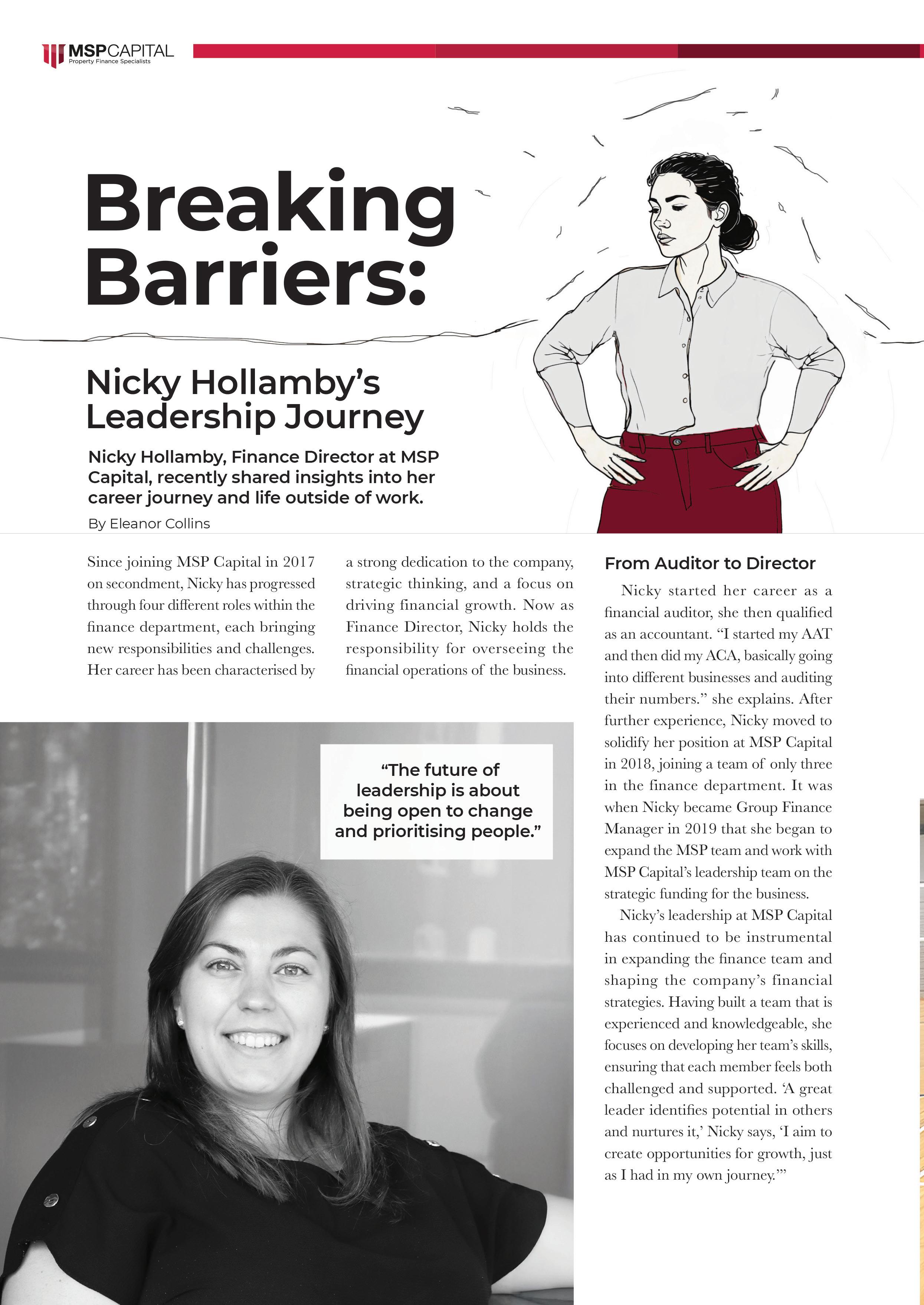
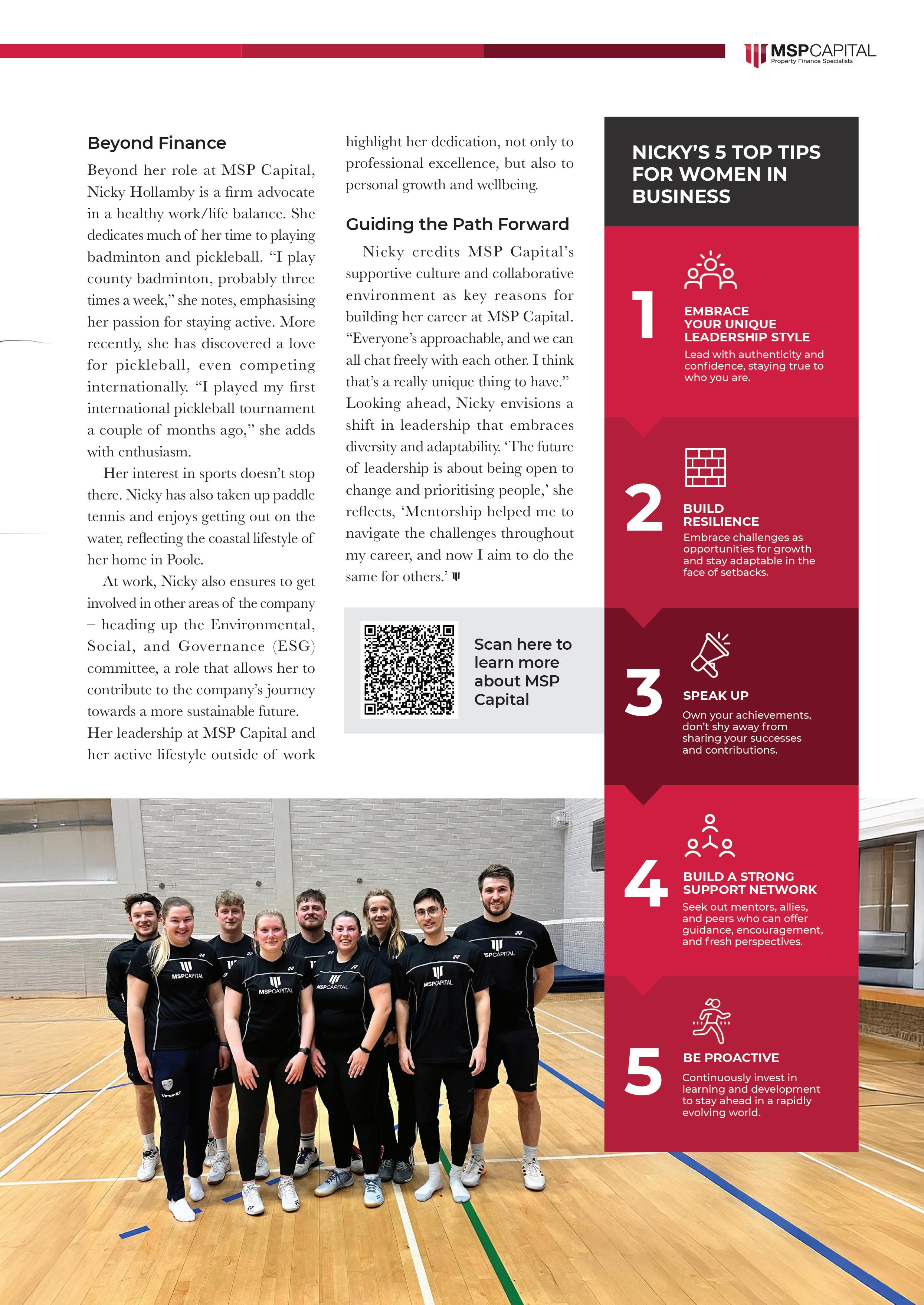
How entrepreneurs can best structure the sale of their company to maximise wealth preservation.
Hard work, planning and diligence are some of the qualities that will have helped an entrepreneur create an in-demand business.
We spoke to Adam Dowdney and Jane Beaven of IBB Law about the importance of planning ahead when selling your business and how the lead up to a sale is when these attributes become increasingly vital to add value to how the sale proceeds.
Jane Beaven, a Senior Associate in IBB Law’s Wills, Trust and Probate team, said: “Pre-sale planning is important and so is getting the right advice before any steps are taken, either with regard to the sale, or in considering your personal estate planning pre and post transaction.”
Jane Beaven explained that prior to the sale of a business the entrepreneur should carefully consider if it qualifies for business relief, thereby potentially realising 100% or 50% relief from Inheritance Tax (IHT). If it does, it may be worthwhile putting the shares into trust prior to disposal to reduce your longer-term IHT exposure and avoid wasting this relief.
A trust is a flexible instrument and does not need to have an absolute beneficiary, meaning it can be set up as a discretionary trust with potential beneficiaries.
Entrepreneurs who have completed a sale of their business can otherwise be left with a sizable amount of money in their bank account that can be disadvantageous from a tax perspective.
Often founders want to ensure that their children, and the generations that follow them, are set up for life. They may also want to invest in more businesses through starting


a family investment company. Ideally this is considered prior to a sale to be most tax efficient, but if not, it is not too late to consider the use of trusts or family investment companies in your succession plan.
Jane Beaven said: “You need to plan ahead to achieve what is important to you.”
Also, what is the purpose and what are you trying to achieve? Sometimes a trust is worthwhile and sometimes it’s not.”
Whether you’re making a gift to an individual or even into a trust, you have to survive seven years from the date of making that gift, otherwise the funds could be liable to an IHT charge. However, this is not the case if you transfer your qualifying business shares into a trust prior to sale, as they are immediately tax free.
Conversely, if the business is sold and it is cash being transferred into a trust, it is important to note that an individual gifting more than £325,000 will incur an immediate charge to IHT at 20 per cent on the excess.
Trusts also have a ten-yearly charge which means that if the value in the trust at that time exceeds £325,000, then it will have a charge of up to six per cent on the value above this figure. Again, this is not the case if the assets in the trust are qualifying business

assets. This is why it is important to plan and get the advice before any action is taken.
Earnouts have increased in popularity in recent years in share sale transactions as a popular means of bridging the gap in price expectations between the buyer and the seller, however, it is vital to ensure that appropriate conditions are in place, from a seller’s perspective, according to Adam Dowdney.
He said: “Your ability to get payment under the earnout mechanism can be quite challenging, you will need to negotiate a number of seller-friendly provisions, including suitable earnout protections and a very clear understanding of how the earn-out is calculated. Deferred payments and earn outs are increasingly common, however if possible it is better to get the cash up front – then you’ve got your money and your risks of getting payment under any deferred consideration elements are lower. There is a delicate balance between a higher amount payable by way of payment on completion and a large deferred element, and a lower overall consideration figure, but with a higher amount payable on day one in cash.”
This article is not providing tax, legal or accounting advice and is for information purposes only.
By Stephen Emerson, Managing Editor

The prospects for the region’s wealth management sector are delicately balanced with the promises of lower interest rates countered with domestic pressures and international turmoil.
However, as any wealth manager will tell you, there are opportunities out there during any period of economic uncertainty – you just have to know where to look.
Those who contributed to this feature say there are seismic changes happening in the marketplace with investments in private equity, private markets and property normally reserved for the few, opening to a broader spectrum of investors.
Technology, as in other sectors throughout the economy, continues to drive change and the wealth management sector is no different.
The Private Equity industry has been one of the shining lights of the UK economy in recent years, however access to the returns that it generates has been limited mainly to institutional investors.
Justin Bates, Head of UK Research at independent, full-service financial services firm Canaccord Genuity, says that this situation is changing and points to the
announcement in September by Swissbased private equity firm Partners Group and US investment company Blackrock that a change in the market is on the way.
BlackRock and Partners Group have struck a deal to offer access to portfolios containing private equity, private credit and real estate funds to wealth managers and retail investors.
Justin said: "Retail investors have never really been able to directly participate in private equity markets.
"That's been a source of some frustration not just to clients but to fund managers, private equity fund managers as well.
"For many years they've been considering how best to access the retail market."
There has also been a strategy shift in recent years across the wealth management industry, away from the sole pursuit of growth towards preservation.
This pivot has been driven by instability in the markets due to conflicts in the Middle East and Ukraine, and soaring interest rates following the pandemic.
Labour's first budget, announced after this magazine had gone to press, looks set to
cement this change with expected rises in capital gains tax, inheritance tax with carried interest on private equity profits also under scrutiny.
A poll by Bristol-headquartered financial services company Hargreaves Lansdown surveyed basic and higher rate taxpayers and found increases in inheritance levies and capital gains taxes are among the top five budget fears.
Hargreaves Lansdown's Head of Retirement Analysis, Helen Morrissey, said: “Almost one in 10 are concerned about losing inheritance tax allowances or exemptions.
“This includes things that keep millions of estates from facing tax – like the nil rate bands that mean the first £325,000 of your estate, and £175,000 of property, can be left tax free — if the home is being left to a child or grandchild.
“Some seven per cent of higher-rate taxpayers are worried about higher rates of Capital Gains Tax, which is payable on profits from investments.
“The concern is that rates could rise from 10 per cent for basic rate taxpayers — 18 per cent on property — and 20 per cent for higher and additional rate taxpayers — 24 per cent on property — to match their income tax rates of 20 per cent, 40 per cent and 45 per cent.”

Technology has had a democratising effect on the wealth management industry with Hargreaves Lansdown and investment platform AJ Bell empowering retail investors.
Their platforms have enabled retail investors to access a range of asset classes while generated AI applications are equipping investors with a wealth of investment information.
Does technology, therefore, pose a
threat to those working in the wealth management industry?
A survey of independent financial advisers (IFAs) and wealth managers by asset manager Schroders, found that 76 per cent think the development of AI applications such as ChatGPT actually represents an opportunity rather than a threat to their business, up from 57 per cent a year ago.
Justin Bates of Canaccord Genuity said the industry had been pushing to upgrade
its customer-facing systems. He said: "Traditional wealth managers would sit down with their clients once or twice a year and provide them with a quarterly update on paper.
"The entire wealth management industry has been making investments into their systems over the last five to 10 years.
“These will get them into a position where they can allow their clients to see the value of their portfolios in real time."

Investing in property has traditionally been seen as a good hedge against inflation and a means of not only preserving but growing capital.
However, one of the main means of investing in property, through open ended property funds, has seen patchy performance in recent years.
Many property investment funds suspended outflows for periods, notably
We have seen news stories over the years about asset managers gating their property funds when times are tough ...
around Brexit and the pandemic, which in turn has dented investor confidence.
The Financial Conduct Authority (FCA) is exploring new regulation to reform open-ended property funds that could tie investors in for longer.
Justin Bates of Cannacord Genuity said: "We have seen news stories over the years about asset managers gating their property funds when times are
tough so people can't sell and get their money out.
"That is a terrible situation for anyone to be in and we, as an industry, need to be able to overcome that as an issue because otherwise who is going to invest in property funds?
"It's happened in the last two cycles and we need to try and prevent that from happening again."


How would you like to invest in a piece of Wembley or The Shard? If this appeals to you from an emotional or pragmatic viewpoint, then you may not have to wait too long to be able to own a share in some of the country's most iconic buildings.
London-based real estate investment
company Martley Capital Group is working with the Aquis Exchange to establish a new segment of the Aquis Stock Exchange Growth Market dedicated to real asset backed investments.
The Aquis Stock Exchange (AQSE) is one of only two recognised investment exchanges for equities in the UK. It is regulated by the FCA.
The Aquis Real Asset Market (Aram) is
expected to launch early next year and will be open to companies owning commercial and residential real estate and other real estate assets including infrastructure, land and forestry.
Rob Bould is working as a consultant for Martley Capital on the project, having previously served as adviser for the now closed International Property Securities Exchange (IPSX), which operated as the UK's first standalone real estate property exchange.
IPSX launched in 2019 to enable the listing of commercial properties, with the idea that owners could realise some of their investment without a refinancing or a sale and leaseback. But it only attracted three listings – all linked to one of the
founding IPSX shareholders, M7 Real Estate. There were also wholesale listings not open to retail investors. The exchange closed last year after failing to find new investment.
Rob explained the key differential between the new Aquis-based exchange and IPSX.
He said: "The difference between this version and IPSX is the fact that it's going to be running on Aquis.
"Although IPSX tried very hard, it didn't have connectivity with the main retail platforms.
"Aquis already has that connectivity and the team have worked hard on getting this connectivity to the real estate investor."


We're in the process of encouraging the issuers to invest and to prepare admission documents for an IPO, then private investors will be able to buy shares
The 2007 Labour government encouraged private investors to invest in property through the establishment of Real Estate Investment Trusts (REITs).
The move attracted investment mainly from large institutions and bolstered the fortunes of some of the biggest players in today’s property market including SEGRO (Slough Estates), British Land and LandSec.
Today, however, the entire REIT section of the main London Stock Exchange, is only 2.6 per cent of its entire make up.
Rob said that the weight of regulation required to set up a public listed company and become a REIT, coupled with current limited returns, were two reasons REITs were failing to gain traction with retail investors.
“The existing stock exchange for real assets and retail investors does not really work. We see a need for a dedicated market just for real assets, isolated from the fluctuations of the main London exchange.”
While the IPSX failed, Martley Capital saw value in the concept and entered into a license agreement with the Aquis Exchange to launch a new platform.
Rob Bould said: “We have a pipeline of real assets including infrastructure that will be traded on Aram.”
He added: “We’re in the process of encouraging the issuers to prepare admission documents for an IPO, then private investors will be able to buy shares.
“We hope that interest rates are heading in one direction and Aram will provide another option for investors to receive income and a share of a recognisable real asset.”
Rob says that investors are attracted to the concept by the returns offered in comparison to the bond market, the diversification opportunities it offers and the inflationary-proof nature of property.
He said: "If we use gilts as an example, which are sub four per cent now, and you can get two or three per cent above that, then that's a very attractive proposition going forward."
"Historically, real estate has also been a very good hedge against inflation. Now we're down to 2.2 per cent but we've also seen it hit 12 per cent in the last three years.”
Rob said that the platform may also be of interest to family offices looking to free up some liquidity in their assets.
He said: “A lot of family offices are second, third, fourth generation. A number of those
people who have shares in those family offices are saying, ‘I’m locked into this, we haven’t got a structure that we can use to raise money’.
“If they’re a fourth generation, by using a public market structure, you can leave control of the family office where it should be, but give liquidity and flexibility to some of those beneficiaries.”
Aram would also appeal, Rob said, to owners of buildings that did want to offload their asset in its entirety.
“Many owners don’t want to sell completely but they do like the idea of diversifying their holdings, he added.
“If they have a market where they can pick a percentage and sell to that market then that is very interesting to them especially if it gives them access to retail investors.”
Rob added that Aram also aligned with the growing trend of people wanting more involvement in their own portfolios.
“People are increasingly wanting more control over their portfolios while at the same having the balance of an adviser in place.
“Aram fits well into this market and could provide sensible returns. Wouldn’t it be nice to have a share of Wembley or a bit of the Shard?”

Maya Prabhu of JP Morgan Private Bank says that a founder’s business journey does not end when they sell

Entrepreneurs put their heart and soul into getting their business off the ground, building it into a profitable entity and then navigating an exit.
The financial and emotional investment, which is also shared with their families, is one reason why a long-term plan to help them achieve the goals for their acquired wealth is vital, according to Maya Prabhu of JP Morgan Private Bank.
Maya, who leads the bank’s domestic market in the UK, said: “Many entrepreneurs create their own wealth rather than coming from wealthy backgrounds.
“They have taken enormous risks to get to where they are, and their partners have also been through this journey.
“Along the way or after an exit, they perhaps want to take some capital off the table.
“Perhaps as a reward for their hard work, to ensure their own financial security and often to secure their children’s future.”
Entrepreneurs should have clear goals, according to Maya, and an investment plan
can help to deliver those goals, whether it is preserving or growing wealth, donating to charity or investing in new businesses.
She said: “The most important question to consider -‘what is this money for?’
“Markets will go up and come down. There will be short-term movements.
“That is all to be expected, especially in the fragile world that we are in at the moment.
“It’s key to have your long-term goals as an anchor to guide you when navigating those risks and opportunities.”
With goals set, says Maya, entrepreneurs need a plan to achieve them, with diverse asset allocation being key.
She said: “When entrepreneurs sell their business, they need to consider their longterm goals and allocate their funds based on that vision.
“The right asset allocation can holistically
accomplish all their objectives rather than a silo-approach of choosing between preservation or growth.”
After exiting a business they have built up, many entrepreneurs want to remain involved in the business world by investing in start-ups to help them to reach their potential and support them along their journey.
Maya said: “We see that with a lot of entrepreneurs because they love the idea of championing new businesses.
“They see this an opportunity to support the entrepreneurial ecosystem.”
Having a diverse portfolio is key to achieving wealth goals, according to Maya, who said that diversification can help mitigate risk in an increasingly dynamic and complex landscape.
She said: “In an age of heightened political and economic uncertainty, investors are seeking benefit from geographically diversified portfolios.


“People want exposure to markets around the world and turn to JP Morgan because we have unparalleled access and deep knowledge in a broad range of asset classes and markets.”
Maya also said that JP Morgan was seeing growing interest in alternative investments.
She stressed, however, the value of gaining advice to navigate the complexity of this landscape.
She said: “We have a very robust alternatives platform to support our clients, with more investors wanting to add this to their portfolios.
“Investors are looking for ways to diversify their portfolio outside the traditional landscape, with the alternatives helping achieve them greater additional returns.
“This universe has become very broad, with more than 18,000 private investment funds and 9,000 hedge funds.
“We have dedicated teams with decades of experiences that look across this universe to identify opportunities which align with our clients’ goals.”
Maya said that, sector wise, technology companies and those focused on the
There is much greater interest in private markets now. Exposure to private markets is part of the advice that we give to clients especially to provide long-term growth and preservation
health sector were attracting investment. She said: “We are seeing a lot of investment activity around AI-powered companies and health.”
Sustainability was also proving to be a popular investment choice for entrepreneurs, said Maya, who added that the green economy was an interesting growth area.
She said: “When you think about the themes that people are investing in, these are the trends and growth opportunities.
“These include the green economy, sustainable investing and clean energy.
“The next generation in their twenties and thirties are very interested in these areas.
“They are starting to think about the family’s wealth in the long term, and how their financial wealth plan can encompass their values.
“They have a great interest in these areas not only from a value point of view but from an opportunity point of view as well.”
Some of JP Morgan Private Bank’s clients are interested in meeting early stage companies.
Oxford and Cambridge have become incubators for life sciences and deep tech start-ups in recent years.
Maya said: “We host annual Entrepreneurs Forums in Oxford and Cambridge to learn about the cutting edge research in areas such as health and technology, connecting key players in the entrepreneurial ecosystem. These events brings together entrepreneurs and investors who have a focus on the life sciences, deep tech and health sectors.”



Brighton is known as a creative and lively city, but that brings
its
own challenges. We invited property experts to debate some of
the issues it’s
facing at our first Women in Property lunch, sponsored by SHW
Participants

Moderator
Nicky Godding, Editor, The Business Magazine
Sharon Briggs, HR Director, SHW
Carlie Edgerton, Associate, SHW
Tina George, Partner and Head of Real Estate, DMH Stallard Solicitors
Victoria James, Managing Director, Chartwell Properties
Emma Ormiston, Partner, SHW
Jane Pinnock, Brighton and Hove City Council
Gemma Quinn, Partner, SHW
Sam Sherrard, Managing Director of CHP Management and Head of Commercial at The William Pears Group
Kate Titchmarsh, Flashbulb Property PR and Marketing
Tarniah Thompson, Head of Facilities Management & Sustainability, SHW
Tracey Welch, Co-owner, Cuthbert Property
Brighton is one of the UK’s most creative and lively cities. But that comes with its own challenges. Its population is increasing – more than 290,000 people live in and around Brighton and Hove which means the demands on the city’s housing, office and industrial stock are not only growing but changing too.
As a result, the city seems in a state of flux. Drive into the centre and scaffolding and huge cranes are everywhere, as though Brighton is deciding what it wants to be when it grows up. Its potential shines brightly alongside its iconic seafront, but there’s still work to do. It is indeed a diamond in the rough.
We invited some of the region’s most well-informed property experts to debate key issues facing the city in our first Women in Property lunch, sponsored by SHW, one of London and the South East’s most active independent property real estate advisers.


specialising in the sale, letting and acquisition of offices and mixed-use properties across the area.
She’s seen a number of derelict sites redeveloped in recent years delivering some much-needed mixed-use schemes while other sites in Brighton have sat undeveloped for decades. She cites the King Alfred Leisure Centre as a good example.
“It’s right on the seafront, a real community asset, but its redevelopment has been talked about all my life. Along the coast, Worthing has redeveloped its leisure centre where perhaps the cost was offset by the new block of flats next to it. Why can’t we do that in Brighton?”
Emma also highlighted the approach to the city centre from the train station. “It’s not as smart as it could be and that’s a shame. Brighton has so much going for it as a city, a lot could be done to improve the arrival experience for new visitors.”
But, as she points out, development is often going to be piecemeal because the buildings are all in different ownership.
While the city is currently deploying a £9.6 million government levelling-up grant to improve sport and leisure facilities on Hove seafront, a highly-regarded local amenity, more needs to be done.
Brighton, like any seaside town, will always be a difficult place to develop.
With the sea on one side, and in Brighton’s case the South Downs on the other, the potential for development is tight.
“People need housing, but we also need to ensure commercial space is available in the city,” said Emma. “In recent years, following the government granting permitted development rights (where property owners can convert or extend to a certain size without seeking planning permission), there has been some conversion of older office stock into residential as new, more sustainable offices are being built.”
This made sense to landlords when residential values were much higher than
offices, but it has taken away secondary office space, leading to a lack of office accommodation in the city.
While sustainable new office space is being built, such as The Portland Building, where does that leave all the smaller businesses and start-ups which traditionally have taken less expensive space? The demand for serviced/coworking space has increased, especially post-Covid, but there is still demand from occupiers wanting their own front door.
Local authority planners have a job on their hands to manage changing demand and demographics, balancing the need to protect industrial and office land which offers local employment with freeing up appropriate buildings for much-needed residential conversion.
Whether a developer is converting old office space, upgrading houses or building new residential units, what is clear is that building high-rise blocks is no longer the answer, according to Tracey Welch, co-owner of Lewes-based Cuthbert Property.
“More people now want to live in a community, where there are shared spaces such as courtyards or little allotments. We are seeing more demand for what I call flat builds.”



Sam Sherrard, Managing Director of property management company CHP Management and Head of Commercial at The William Pears Group, one of Britain’s largest property companies, flagged up a relatively new asset class outside London: co-living.
Co-living offers individuals the opportunity to rent a room or small apartment within a communal property, benefitting from shared amenities and activities.
According to reports, investment in the development of co-living spaces has reached nearly £1 billion since 2020, and this figure is set to rise significantly.
In Brighton, the first co-living development to have secured planning permission is being built. The cutely-named Kosy Village at Enterprise Point will have 269 self-contained studios set within generous outdoor and indoor amenity spaces.
Sam said: “The studios are smaller because there are more shared communal areas, which includes cafes or working areas for those who have hybrid or workfrom-home jobs.”
Another similar development in the city is Edward Street Quarter, according to
Victoria James, Managing Director at Ascot-based Chartwell Properties. “This is a new mixed-use project in Brighton being developed by Socius and Patron Capital.
“While not strictly co-living, the thinking behind it is similar as it provides a lot of communal facilities.”
There are other similar projects such as a major build-to-rent scheme by Brighton station (and another one at Hove station), being driven by Legal & General.
Tina George, Partner and Head of Real Estate at South East law firm DMH Stallard, explained that demand for this newish asset class is principally coming from the younger generation.
“Young professionals increasingly demand flexibility. They don’t want to be tied to mortgages, or more likely can’t afford them. Some clients who have invested in residential portfolios as an income stream are now diversifying into build to rent, and there are very few voids in their schemes.”
Looking at it from a societal point of view, roundtable participants agreed there could be issues in the future.
Emma said: “Renting has been the norm in Europe for generations, where many haven’t seen the need to buy. Instead, they pay less to rent and put the rest into savings. The issue in the UK is that rents are so high that young people are not going to be able to save that much.
“What happens when they get to retirement age? They don’t have their own house as an asset and may have few savings to speak of.”



Carlie Edgerton, Associate at SHW, added: “A co-living space offers reduced bills, and the opportunity to have something of their own. It’s a difficult trade-off for young people which hasn’t yet been resolved.”
Gemma Quinn, London-based Partner at SHW, reports on a different solution.
“In London, the HMO (house of multiple occupation) has always been a stopgap for the younger generation.
“But I’m seeing residential investors buying three-bed terrace properties, carving them up and upgrading them to a high standard. People who are earning £25,000 to £35,000 a year are happy to stay there. They have their own space, and while it’s
small, it’s higher quality and they can still afford to save money for the future.
“I value these all the time for the banks and our clients, and the standard of such properties has risen significantly.”
But despite these creative ways to provide accommodation while making an income, there remains a lack of adequate housing for different demographics at the right price point.
And even if a young person does have enough money to buy a doer-upper in a bid to get on the housing ladder earlier, said Carlie, there’s no longer such a difference between buying a three-bedroom property

in need of full renovation and one that’s already been done up.
A problem for landlords of both office and residential property is that to bring a building up to the standard at which it can be let is getting more expensive, said Tarniah Thompson, Head of Facilities Management and Sustainability at SHW.
“When a landlord tries to let a lower grade office building, they won’t attract top quality companies. Large established corporate businesses must consider their carbon reporting when looking for office space. SMEs come with higher financial risks to the landlord, and start-up businesses want flexibility. If a start-up is being lent money, one of the strings attached to the investment or loan may be an ESG (environmental, societal and governance) commitment that stops them from moving into substandard office space, even if they want to.”
Even reducing rents may not be enough to attract tenants, said Emma. “Many landlords we work with do maintain their properties, but to those who haven’t and those that have not kept up with sustainability in their buildings, we have to break the news that even if they do invest in the building and bring it up to standard, they won’t necessarily be able to command a higher rent.”


Investing in a property with due consideration as to its future occupants can pay dividends, according to Tracey.
“We bought an old council building in Worthing. It was very run down, and we did indeed secure it with a brown discount.
“But we invested, keeping the whole external structure while completely refurbishing it with eco-credentials inside, working in partnership with our now tenant who leases the property from us.”
“It is possible to take these old buildings, do them up sensitively and make a return.”
For a city to rethink the way it develops and progresses, new perspectives are needed, and the roundtable discussion
turned to widening the talent pool. Should an industry which has traditionally attracted a certain sort of professional do more to open up to those who may not consider real estate, planning or the law as possible careers? Sharon Briggs, HR Director at SHW, thinks so.
“A few years ago we set up a respect, diversity and inclusion committee. It’s still in the early stages, but we want to get into schools to talk to students about what a career in property and surveying really means.”
SHW has also embraced work experience. Every year its offers around 20 students the opportunity.
“The firm is used to taking graduates. But when I joined, I pointed out that it was paying but not utilising the apprenticeship levy,” explained Sharon.“So we started bringing in apprentices.”
At times this had its difficulties because an 18-year-old’s experience of life is
different to a graduate at 21 or 22, but the firm adjusted to the different levels of experience and expectations. Sharon added: “Our apprentices are renumerated well and as a firm we flourish in diversity. We can offer school-leavers a fantastic career without them having to incur
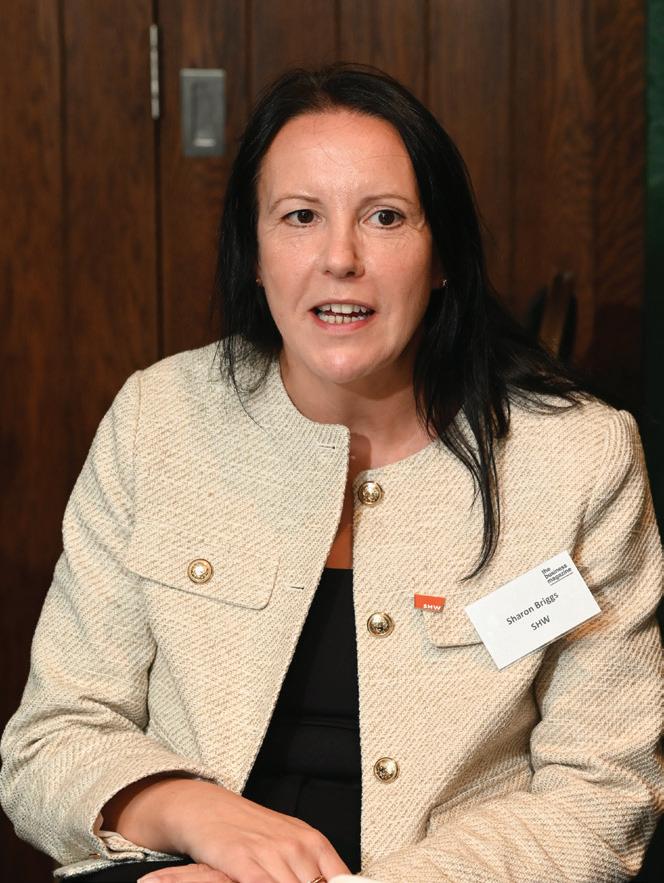


the costs of university. By doing so, we can really change who joins the industry, whether that be in a surveying, accounting or an IT role.”
SHW isn’t alone in its approach to broadening its recruitment. The wider professional sector is opening up opportunities.
Tina George said: “I’ve been at DMH for more than 30 years and it has changed a lot in terms of diversity, especially over the last decade. We encourage applications from people from all different backgrounds and the profession itself is changing. The introduction of the SQE route to qualify is opening up law to a wider demographic.
“Students can train on the job rather than having to get a degree first. This opens up the career to more people
from different backgrounds who wouldn’t necessarily be able to afford, or choose to go to university.
“We have 360 partners and staff. And of our 85 partners, 43 per cent are women –higher than average.
“I sit on the management team and three of the nine-strong team are women.”
In fact, Tina points out that there are more females entering the legal profession than males.
And the power of role models shouldn’t be underestimated. As a black female Tarniah Thompson began her career in
property thanks to an older woman she met while undertaking work experience. The woman took the trouble to talk to Tarniah about what she had achieved.
“I was raised in Brixton, South London and didn’t get much exposure to the property world to be able to explore a career in the sector,” she said.
“You can’t be what you can’t see and having opportunities such as work experience is a fantastic step to be able to encourage social mobility.
“People from different backgrounds want different things, so if they’re in a company where they have influence, and their views are respected and listened to, they’re going to suggest doing things differently. That’s a really healthy thing for not only the property world, but for wider society.”

Demand continues to grow for warehousing, but more investment is needed for mid-box logistics
By Nicky Godding, Editor

A report published this summer by Logistics UK revealed that the sector generates phenomenal annual revenues of £1.3 trillion and contributes around £185 billion to the UK’s GVA performance.
These are seriously big figures but coming from one of the biggest business groups in the UK, which represents the road, rail, sea and air industries as well as the buyers of freight services such as retailers and manufacturers, they have to be taken seriously.
And supporting this behemoth industry is the warehousing sector. Every van, lorry and shipping container needs a warehouse into which it can disgorge its cargo. As a result, the number of big logistics parks being built at key nodal points across the UK transport network has grown exponentially.
The Office of National Statistics confirms this. It says that the number of business premises used for transport, logistics and warehousing in the UK has doubled in the last decade.
It puts this down in some large part to supply change adjustments thanks to our exit from the EU, the onset of the coronavirus pandemic and the continuing rise in online shopping as a percentage of retail sales.
Many of the biggest sites are naturally located in the Midlands, home to the “golden logistics triangle”, but big logistics sites have proliferated further north and around the country’s key economic hubs.
And demand for suitable warehousing continues to rise.
Gilbert Harvey at Eddisons oversees the warehouse and logistics sector in the Midlands for Eddisons. He says that the demand for large logistics sites remains high in key locations.
“Magna Park at Lutterworth, on the M1
between Coventry and Kettering, is Europe’s largest logistics and distribution park thanks to its key location,” he said.
Magna Park is owned by GLP, the global developer and operator of logistics real estate, data centres and renewable energy projects.
Its Lutterworth site currently has more than 13 million sq ft of floor space and GLP is building two significant extensions: Magna Park North and Magna Park South.
Magna Park North has so far seen the speculative development of around one million sq ft of space across three units, all of which were leased ahead of completion. There remains a further two million sq ft to develop.
Magna Park South offers 2.9 million sq ft of logistics space. The first phase saw the development of around 1.2 million sq ft of speculative development across four units. All units were leased ahead of completion to Amazon, JD.com, Whistl and Movianto.


While there is strong demand from occupiers, such as logistics businesses looking for warehousing for last mile deliveries, such warehousing is more expensive to build ...

“With speculative development on such large and well-established sites on-going, supply is just about keeping up with demand,” said Gilbert.
However, where challenges remain is in the smaller, 20,0000-100,000 sq ft mid-box market.
“There is a shortage of commercial space of this size of warehousing,” Gilbert said.
“While there is strong demand from occupiers, such as logistics businesses looking for warehousing for last mile deliveries, this type of warehousing is more expensive to build, so many developers have concentrated on the larger sites. Here the build costs are likely to be lower, and they can achieve better yields than on smaller warehousing sites.”
Gilbert highlights another problem for this
sector of the market. Some of the smaller and and mid-sized sites which were built a few years ago are starting to age. Many already require redevelopment, or refurbishment and certainly investment in improving their energy performance, where the legal requirements were not as stringent as they are now.
And when occupiers will seldom commit to leases longer than five years, and often demand even more flexibility, developers are concerned that they won’t see a timely return on their investment.
“There are not enough small to mid-box developments being built to meet current demand,” said Gilbert.
And this will stifle economic growth, something that the UK Warehousing Association is concerned about.
Ahead of the October 30 budget it wrote to the Chancellor, Rachel Reeves, highlighting the compelling case for the government to support warehousing
and logistics businesses “by fostering a regulatory and fiscal framework that acknowledges our sector as a facilitator of trade and economic growth.”
However, across the UK’s commercial real estate sector there is hope that with the price of land stabilising somewhat after a turbulent few years, a commitment by the new government to put more planning officers back into local councils to speed up the UK’s famously slow planning process, construction costs flattening and interest rates going down (which in turn drives yields up), the attractiveness of developing smaller sites could begin to rise.
“I have seen some smaller schemes which were put on hold because of these issues start up again, and that will all help,” added Gilbert.
Another positive (for the big box sites at any rate) is that Amazon has returned to the market and is looking for space in a bid to become more competitive with other online retailers.
Panattoni, the largest logistics real estate developer in the UK and Europe has begun speculatively developing 1.3 million sq ft of logistics space, which will include the UK’s largest-ever speculative logistics building, in Avonmouth, Bristol. There are rumours across the industry that this will be taken by Amazon.
The £280 million development, Panattoni Park Avonmouth, comprises two units of 406,000 sq ft and 882,000 sq ft. The larger of the two will be the UK’s largestever speculatively built warehouse. Both units are being built in one phase and are expected to be completed in September 2025. ISG has been appointed main contractor.
Across the commercial property sector, industrial and retail warehouse sectors are expected to continue to perform the strongest out of all asset classes over the next few years.


A government decision on whether to build the much-discussed Lower Thames Crossing, linking Gravesend in Kent and Tilbury in Essex under the Thames, will not now be made until at least 23 May 2025.
In October, Transport Secretary Louise Haigh said the delay was to allow more time for the application to be considered further, including any decisions made as part of the spending review.
This is the third time the decision has been extended.
The news has been met with dismay across the transport industry.
Logistics UK Chief Executive David Wells OBE said: “The postponement of the decision is deeply concerning and runs counter to what the new government has said about getting Britain building again.
“Industry is united in its opinion that the Lower Thames Crossing needs to be built so the decision to delay the development consent order will be met with bitter disappointment and frustration by businesses up and down the country. The new crossing can pay for itself many times over, driving growth by generating billions for the economy and creating thousands of high-quality jobs. It should not be delayed further.
“While geographically in Kent and Essex, the proposed crossing is nationally significant and vital for improving connections between the North, Midlands and Channel ports, where the Short Straits crossings between England and France handle more than half of all goods traded between Great Britain and mainland Europe.”
Plans emerged as early as 2009 for the Lower Thames Crossing (LTC) to relieve pressure on the existing Dartford Crossing.
The latest proposal would see a 14.3 mile route branch off the M2 south of the Thames and link up with the M25 and A13 to the north, at a projected cost of £9 billion.
Those backing the project say it’s set to provide a massive boost to the Kent economy, cutting delays at the Port of Dover and thus salvaging millions in lost productivity.
That is, if it ever gets the green light.
Costs for the planning application alone have already reached £300 million – but this latest delay puts the project in limbo until May next year.
Other proponents of the LTC are as frustrated at Logistics UK.
“This isn’t just any road scheme,” said Nick Fenton, CEO of business support service Locate in Kent.
“It represents the biggest infrastructure project for a generation. Kent is key to UK trade, from transporting fruit to supermarkets to exporting goods to and from Europe.
“Businesses in Kent and across the UK will be bitterly disappointed by the decision to delay this vital project even further, especially given the overwhelming support for the scheme from across industry and the political spectrum.”
However, some experts have argued that the economic promises have been vastly overstated.
A recent report from activist group Transport Action Network dismisses the LTC as “a dinosaur scheme” destined to return just 22p to the public purse for every pound spent.
The findings come from Dr Colin Black, a transport consultant who served as strategic
lead to Thurrock Council in Essex during the six-month examination of the scheme’s development consent order.
He forecasts that the existing Dartford Crossing will return to its present level of congestion just five years after the opening of the new route.
And not only will the project intrude on Kent’s green belt, but it’s also expected to generate around 6.6 million tonnes of CO2 during construction and operation.
Chris Todd, founder and director of Transport Action Network, said: “Investment should instead be focused on public transport and active travel schemes which genuinely support the government’s five missions.”
However, the burden may not end up on the taxpayer – at least not directly.
The Labour government has reportedly considered a new form of PFI-style private finance initiative to finally get the £9 billion project moving.
The government may still need to underwrite construction risks to attract investors, and the new route could require tolls to start paying them back.
Nick Fenton hailed the prospect a “welcome development”.
“It’s encouraging that ministers are keeping an open mind and considering all possible means to deliver a project that will be critical to keeping UK freight passing through the Channel Ports,” he said.
Other parties hoping for a positive resolution are Bluewater shopping centre owners Landsec, Asda, the British Chambers of Commerce and the Port of Dover. Unfortunately, they’ll need to hold out hope another seven months.


New construction of lab-enabled real estate in Oxford reached a record high during the third quarter of 2024, according to commercial real estate analytics firm CoStar.
The 12-month rolling total for construction starts reached almost 800,000 sq ft, the highest ever recorded across the Oxford market.
Ongoing developments include Trinity by Breakthrough at Oxford Business Park – a new 214,000 sq ft of lab and office space due for completion in late 2025 – as well as 450,000 sq ft across three new buildings at The Daubeney Project, Oxford Science Park.
There is now more than 800,000 sq ft of lab-compatible space under construction, a 70 per cent increase over the last six months and one of the highest levels on record.
Even with rising supply, developers and investors are confident that the market supports enough demand to accommodate more stock.
Earlier this year, The Crown Estate launched a major investment drive into science, technology and innovation workspace development alongside Oxford Science Enterprises and Pioneer Group.
Together, they committed to a £125 million redevelopment of the former Debenhams store in Oxford’s city centre.
Subject to planning, construction of the new 100,000 sq ft building will begin next year.
Take-up of lab space reached one of its highest levels on record in 2022, but declined sharply during 2023 as foreign direct investment and venture capital funding fell.
The fall was largely attributed to the rise in rebate rates that manufacturers of branded medicines must pay on their UK revenues.
Last year was also the first since 2012 in which the UK had no initial public offerings in life sciences.
However, activity has gathered pace this year – driven by acquisitions by firms like Oxford Ionics, which took 30,000 sq ft at Oxford Technology Park in Kidlington at the start of the year.
More recently, the Ellison Institute acquired 28,000 sq ft at Oxford Science Park, while Nucleome Therapeutics acquired 20,000 sq ft at Inventa on Botley Road.
Early indications suggest that the third quarter may see takeup rise further.
QinetiQ sells Hampshire tech park but will keep HQ on site
Security and defence contractor QinetiQ has agreed to sell its 407-acre site at Cody Technology Park in Farnborough for £112 million.
The site has now been acquired by a fund managed by Tristan Capital Partners.
Steve Wadey, group CEO of QinetiQ, said: “I’m delighted we’ve found a partner committed to investing in Cody Technology Park and developing its long-term future as a centre of excellence in defence, science and technology in Hampshire.
“We remain committed to Farnborough as the location of our group headquarters and will become the principal tenant on the site.”
Tristan Capital Partners will further develop and modernise the technology park. The deal is expected to complete by December with QinetiQ entering into a 15-year lease with TCP for its existing footprint.

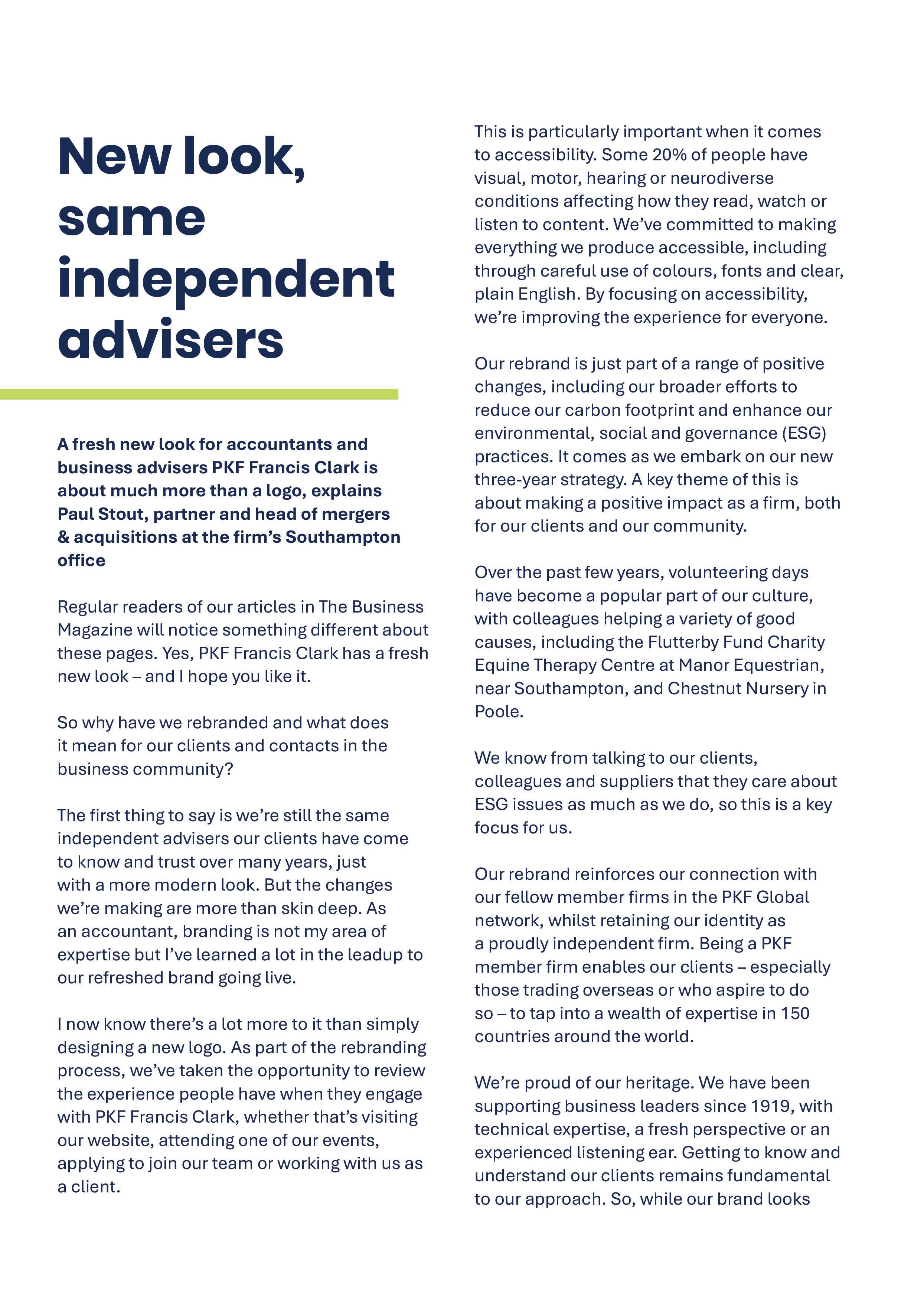
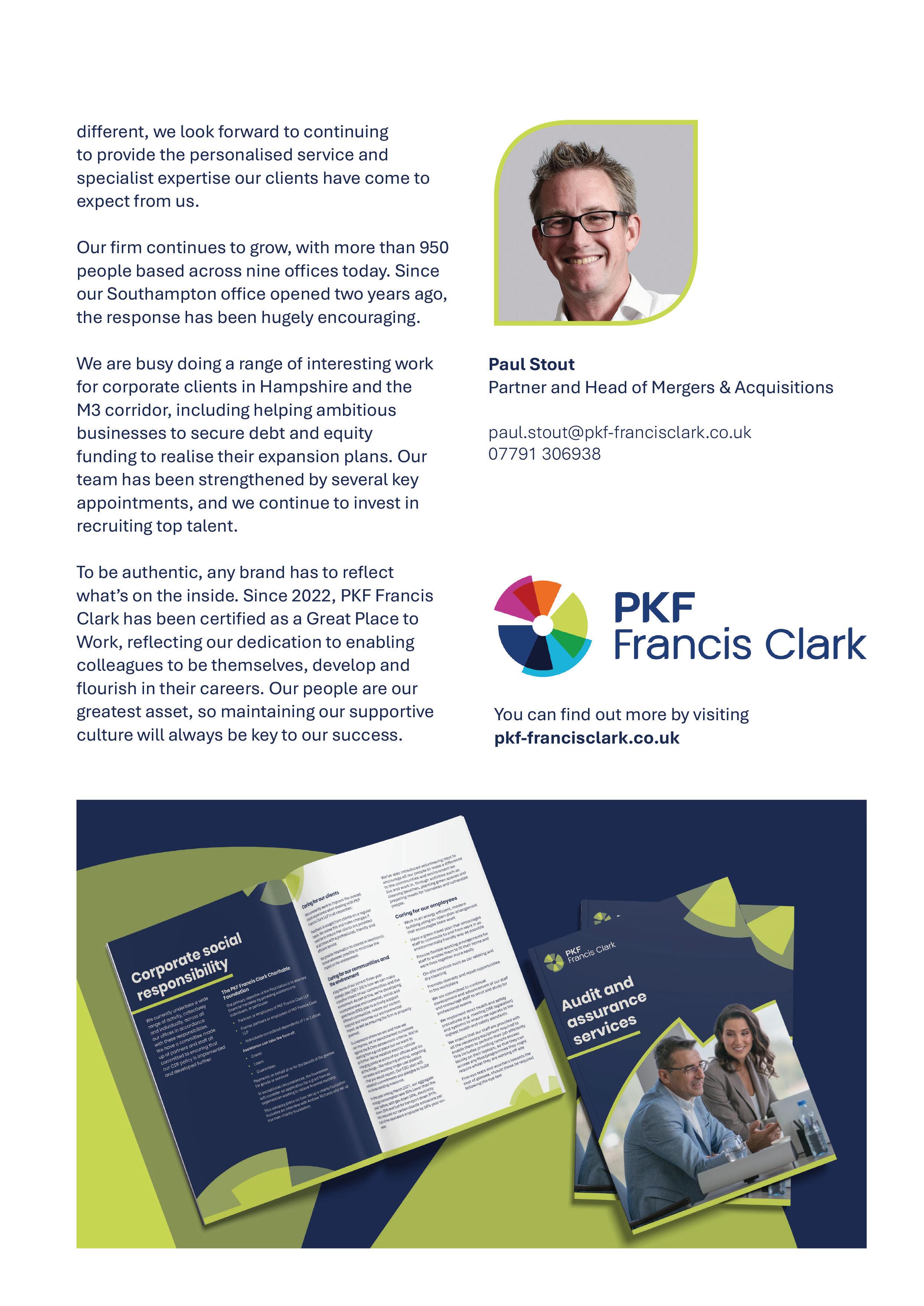

The Thames Valley Property Awards 2024 culminated with its traditional annual gala celebration and crowning of winners across 12 award categories. For its 11th event, the region’s largest property showcase saw an impressive line-up of finalists drawn from an extensive list of entries.
Welcoming guests to host venue Ascot Racecourse, Richard Thompson, Chief Executive at event organiser The Business Magazine, said: “These awards celebrate the best of commercial and residential property in the Thames Valley. They bring together developers, agents, planners, consultants, property lawyers and dealmakers to recognise the achievers – firms and the individuals – who have stood out in the past 12 months.”
The event sponsors were Boyes Turner,

IBB Law, Morgan Lovell, Haslams Surveyors LLP, Diales, Mac Mic Group and B P Collins LLP. The supporting sponsors were measurable.energy and Rybull Group
A strong independent panel adjudicated decisions on finalists, alongside category sponsors. The independent judges were Andy Jansons, Managing Director at Jansons; Fiona Brownfoot, Director at Hicks Baker; Mel Magee, Managing Director at Carless + Adams; Kathy Pain, Professor of Real Estate Development at Henley Business School; and Chris Ryall, Co-founder at Rybull Group
Sharp-tongued comedian Simon Evans hosted the proceedings with his trademark curmudgeonly wit.
TVPA was proud to sponsor Alexander



Devine Children’s Hospice Service for another year. The Maidenhead-based charity offers a children’s hospice service to families in the Berkshire area. On the night, the audience donated nearly £3,300 to the charity.



ARCHITECTURAL PRACTICE OF THE YEAR
WINNER: Edgingtons Architects
SPONSOR: B P Collins LLP


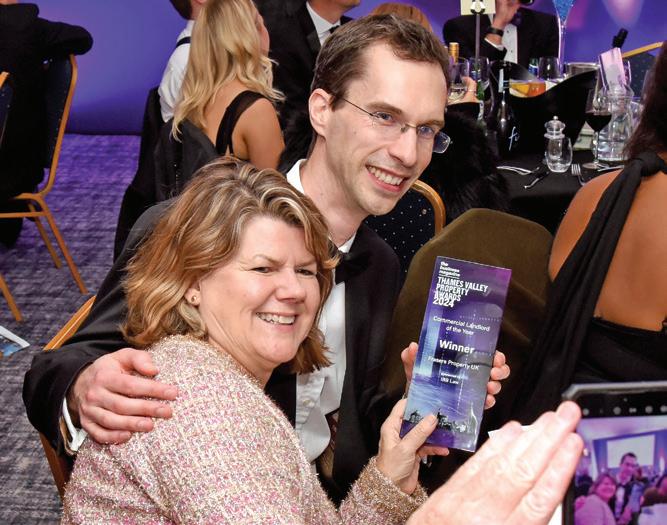
COMMERCIAL LANDLORD OF THE YEAR
WINNER: Frasers Property UK
SPONSOR: IBB Law





COMMERCIAL PROPERTY AGENCY OF THE YEAR
WINNER: Hollis Hockley
SPONSOR: Morgan Lovell

COMMERCIAL DEVELOPMENT OF THE YEAR
WINNER: Plus X Innovation – Oktra
SPONSOR: Boyes Turner




SUSTAINABLE DEVELOPMENT OF THE YEAR
WINNER: Maxis, Bracknell – Frasers Property UK
SPONSOR: Diales

WORKPLACE DESIGN OF THE YEAR
WINNER: Area - TD SYNNEX
SPONSOR: IBB Law



PROPERTY DEAL OF THE YEAR
WINNER: Mapletree (Green Park) letting to Wood
SPONSOR: Haslams Surveyors LLP

HOUSEBUILDER OF THE YEAR
WINNER: Castlethorpe Homes
SPONSOR: Boyes Turner








YOUNG PROPERTY PERSON OF THE YEAR
WINNER: Elliott Brookes –B P Collins LLP
SPONSOR: Morgan Lovell

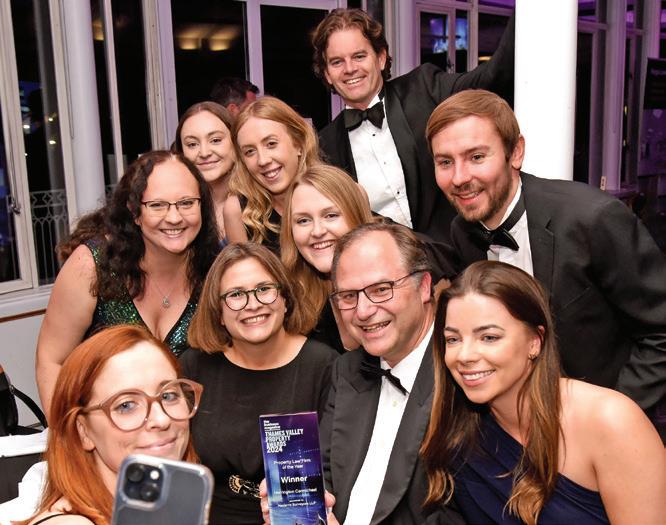
PROPERTY LAW FIRM OF THE YEAR
WINNER: Herrington Carmichael
SPONSOR: Haslams Surveyors LLP



REGENERATION PROJECT OF THE YEAR
WINNER: Horlicks Quarter –Berkeley Homes
SPONSOR: Diales

RESIDENTIAL DEVELOPMENT OF THE YEAR
WINNER: The Crescent, Thame – Rectory Homes
SPONSOR: B P Collins LLP
TO READ MORE ABOUT THE WINNERS USE THE QR CODE




Reading-headquartered tech scale-up measurable.energy secured £4 million Series A+ funding in October 2024 to globalise sales of its AI-powered smart sockets. CEO and Co-founder Dan Williams explains how the award-winning company aims to change the way the world consumes energy.

Leaving electrical devices switched on or in standby mode is an eco-sin most of us are probably guilty of committing. Wasting energy also burns a hole in the pocket of whoever pays the electricity bill.
One answer to the challenge of lowering energy use and carbon emissions from plugged-in devices is taking shape in Berkshire. Having completed engineering doctorates at the University of Reading, Dan and measurable.energy co-founder Josh Eadie decided the solution was to put AI into the humble plug socket.
measurable.energy’s revolutionary smart technology automatically detects what is plugged in and where power savings can be made. The company estimates that most commercial and office buildings could cut their electricity bills by at least 20%.
It’s not just a new way of measuring power use, Dan emphasises, it tackles the problem head on by making data-driven decisions to automatically turn off plugged in devices when not in use and on again when they are. The company also aims to shift

behaviours in how we manage our energy use. “We use the analogy of ‘you wouldn’t ignore a dripping tap’ to get across the collective impact of daily energy waste and to take control of it like you would waste water,” says Dan.
Notable early beneficiaries of the technology include construction company Kier, which cut energy usage by half. The University of Reading reduced its energy usage by 872kWh in two months, while modular building manufacturer Wernick Group reduced carbon emissions by 23% in four months.
This high-tech, but ultimately simple answer to a growing global problem has earned the company recognition. measurable.energy won this year’s Sustainable Tech Company of the Year at The Business Magazine’s Thames Valley Technology & Innovation Awards, having been a finalist in the category for the previous two years. It was Tech SME of the Year in 2023.
Switched on to growth potential
The technology combines Dan’s doctorate
research at Microsoft assessing the environmental impact of its technology with Chief Technology Officer Josh’s work in robotics and machine learning. The impetus was Dan’s desire to change things for the better.
“We asked each other: ‘Why isn’t it simpler to measure and control equipment?’. The physical hardware to measure power has been around for a long time, so why not put the technology inside a plug socket?” says Dan.
Within a week of deciding to find the solution, Josh had designed and 3D-printed their first-ever socket with a microchip he created. “It wasn’t very good, but it proved the point that it could be done,” Dan observes.
The pair describe it like putting a human brain into a simple power socket. For example, it has the intelligence to know it’s not a good idea to switch off a freezer to save energy.
The database and algorithms generated from the technology makes the product


unique, according to Dan. The sockets connect to an online dashboard so users can visualise, understand and control their power usage at device level, although the system automatically controls itself too.
Financing global expansion
Convinced that their technology could answer business needs, the duo sought funding to get it off the ground.
A £100,000 Thames Valley Local Enterprise Partnership grant helped kick-start the business. Reading Borough Council also provided financial support in the early days. “The funding enabled us to develop the prototype,” says Dan.
The business interruption caused by the Covid-19 pandemic proved to be something of a sort of blessing in disguise. “It was a horrible period for us, but we were able to spend a lot of time refining our hardware and machine learning. So, on balance, it was good in hindsight,” he says.
It was a tough task obtaining further financing for a product that didn’t yet exist commercially. “We had to prove that the technology works, which is where the Reading LEP grant really helped,” says Dan.
Next, measurable.energy landed £1.5 million of seed funding from Bonheur, a renewable energy specialist based in Norway.
The cash injection enabled the company to begin mass manufacturing. This is done at a factory in Scotland and it hopes to retain
UK manufacturing if it can. For Dan, it was at this stage that measurable.energy felt like a ‘real’ company.
Securing Series A funding was the next financial step. Like many start-ups this involved a seemingly endless round of meetings – 120 in all, Dan recalls. The result was £4.5 million led by the venture capital group Clean Growth Fund in 2023.
This was followed in October 2024 with a further £4 million in Series A+ funding co-led by new investor Vertex, another global venture capital company based in Singapore.
“We now have funding from outside the UK with global opportunities opening up,” he said. “We continue to sell well in the UK, with 17,000 units sold since our commercial launch in 2023. We are prototyping power sockets for the European, North American and South East Asian markets,”
Along the way, the company has been helped by some high-profile coverage. It won a competition to be one of five companies invited to present to delegates at the United Nations’ COP 26 Climate Change Conference in 2021. “An awesome experience,” Dan recalls.
Appearing on a BBC News programme about the use of its product on the planetorbiting International Space Station also gained it publicity, with the clip viewed regularly online.
The company is currently targeting the commercial market and the construction sector. Customers include offices, retailers and universities. “We plan to go into the residential sector and are building up a waiting list of potential customers. Our staff are conducting tests in their homes at the moment,” says Dan.
He makes a point about differentiating its smart socket from competitors who will inevitably emerge. “We have been collecting data since 2020, so we have the largest data set on earth about measuring power in a plug socket.”
measurable.energy’s growing R&D team in Reading is busy generating new ideas and patenting them. They’re confidential but hint at even bigger things to come. The team has quickly grown to 27 and Dan anticipates significant expansion in the coming years.
Meanwhile, Dan and Josh maintain links with their alma mater, giving occasional lectures that showcase how entrepreneurial talent can flourish.
While it is still early days, Dan also talks of long-term plans to grow the company. “So far, it has been an interesting journey for both of us – from academia to consultancy to running a business. We’re excited to continue to build a future where every power socket in the world is a measurable. energy socket,” he says.


70% of 18-34 year olds said a refurbished office would draw them back to the workplace, yet only 9% of leaders have acted – so where can they start?*
Step one, talk to us. When you work with us, we make you a promise – to deliver your office fit out with no fuss. We look after everything through your design-and-build journey, so you can relax knowing our team is by your side. Our parallel working approach means we look after different stages of your project in tandem – reducing handover and downtime between milestones. We can even bring your designs to life through renders and 3D walkthroughs, so you can be confident with your new space before we begin.
Our designers are known for their innovative and inspirational designs that exceed expectations and encourage staff back into the office. Our attention to detail, focus on diversity, equity and inclusion (DEI) and ability to understand and interpret your unique requirements set us apart. Our work is award winning, with Sage’s new Winnersh Triangle workplace taking home Regional Winner in this year’s SBID International Design Awards.
At Morgan Lovell, we pride ourselves on delivering exactly what we promise. Our reputation for completing projects both on time and within budget means you can trust us to meet your expectations every step of the way. With us, you’ll enjoy peace of mind, knowing your project will be finished to the highest standards. This level of reliability and professionalism is key to ensuring a smooth and successful project from start to finish.
Additionally, we prioritise social value and sustainability in every fit out project we undertake. With our innovative carbon counting tool, Carbonica, we can accurately measure and minimise the environmental impact of your project. Our dedicated environmental team is ready to assist you in reaching your sustainability goals, whether that includes certifying your project with BREEAM, LEED, SKA or NABERS. By focusing on sustainability, we contribute to a healthier planet while ensuring your project adheres to the highest environmental
standards, enhancing your corporate social responsibility and reducing operational costs.
Don’t just take our word for it – here’s what our clients say:
"Working with Morgan Lovell was a seamless and enjoyable journey. It's also the first time I have ever had the client say that he loved the first design and didn't want to make any changes. You clearly captured the brief perfectly.” Oliver Lewis, Project Manager, CBRE.
"We felt like we needed someone we could trust, and Morgan Lovell brought that. Working with the team was great." - Lee Bartram, Head of Marketing & Cultural Influence, Gibson.
Morgan Lovell is the UK’s leading office interior design and fit out specialist. Established in 1977, based in London and the South of England, we work with a wide range of clients, including businesses of all sizes, from startups to large corporations.
*Survey: Refurbishing with Purpose: What leaders want versus the employee view, Morgan Lovell.
Need some extra persuasion to return to work? Be inspired by our pick of the best
Buildings are the backdrop to human civilization. More than just structures of brick, glass and steel, a building tells a story of its time, place and people.
Commercial buildings are no different. The buildings we do business in become part of a narrative, told alongside another distinct yet linked one told by the construction industry itself.
As we see buildings of all uses becoming ever more sustainable, as developments in the centres of our towns and cities change to accommodate new ways of working, we see in them a reflection of contemporary culture.
Almost all the buildings on this list promote their sustainability credentials, with some making it a focal point of their design.
Others, such as Bobby’s in Bournemouth, are examples of how the spaces we live in, such as the high-street, are adapting to changes in daily life.

Durley Chine Environmental Hub in Bournemouth houses an education centre and welfare block for the beach cleaning team. The development aims to make the public more aware of what they throw away.
As such, the architects on the project – Footprint Architects – made sure that reuse and recycling were central to the project and ensured any new materials were carefully considered to choose those with the lowest carbon footprint.
The development was recognised as a Royal Institute of British Achitects (RIBA) South West Award winner.





Global consulting and engineering company, Wood, recently relocated to 400 Longwater in Reading’s Green Park, designed and delivered by Morgan Lovell.
Featuring a stunning reception area, business lounge, open plan desk space and café, Wood’s new home was thoughtfully designed to be flexible and future proof, ensuring the space is efficient now and for years to come.
Building a cool development doesn’t necessarily mean creating something new.
The Priestley Building in Surrey Research Park is a net zero redevelopment delivering sustainable, energy-efficient office and lab-enabled space.
Its redesign features high-performance glazing and photovoltaic panels, ensuring the building stays energy-efficient while creating a sleek, modern look. Inside, flexible office layouts and lab spaces meet the needs of cutting-edge industries like tech and biotech.
It’s also got facilities for cyclists, electric vehicle charging and has a focus on wellness through natural light and green spaces.

Skateboarding is probably the coolest sport going. It would be remiss, then, not to include the world’s first multi-storey skate park in this feature.
The striking building also happens to be home to the tallest climbing venue in the South East, meaning it offers a place for a variety of different flavours of adrenaline junkie.
We could go on about how important it is to offer young people places to engage in social activities – which it is – but instead we’ll just point out how interesting it is that the bottom of the bowls can be seen protruding from the outside of the building.



Sage set out to revitalise its office environment, transforming new space into a dynamic next generation hub for innovation and productivity supporting a hybrid first approach. The new Winnersh Triangle office is engaging, inclusive and sustainable.

To call Bicester Motion any old development feels a little like selling it short. The 444-acre development has been split into four separate quarters, each with its own unique identity.
The Heritage Quarter features 50 specialist motoring businesses. The Experience Quarter offers track experience days and will house leading mobility brands in a space they can showcase the latest technology.
Wilderness will be home to multiple day-out activities, from waterborne fun and nature trail discovery to time spent unwinding on the lake shores.
Finally, the Innovation Quarter is possibly the most exciting. Currently under construction, by early next year it will start to house industry-leading technology firms, with access to an airfield, test track and open space.

Of course, buildings don’t have to house extreme sports to be cool.
RHS Hilltop is a gardening science hub which gives the public the ability to view research being carried out there.
As such, it features protective, climatecontrolled spaces for the plant and library collections, while allowing for visitor access and engagement.
This modern development features all of the appealing glass and wood features you would expect from a contemporary project, making it beautiful and functional.

The spirit of adventure and entertainment comes alive at Butlin’s newly-designed office space.
Embracing the Butlin’s brand, Morgan Lovell infused vibrant colours, playful elements and flexible design features to create a workplace that inspires collaboration, creativity and endless possibilities.





The new Engineering Centre at Southampton Science Park is a testament to the south coast’s growing innovation community.
The centre brings together academia and business, featuring labs, workshops and creative spaces all under one roof.
It’s also home to the Future Towns Innovation Hub, aimed at tackling some of the biggest challenges facing modern towns – think energy-efficient housing and water conservation.
Add in resident companies like Windracers and Audioscenic and you’ve got a space that’s brimming with technological innovation


In a bold move to reinvent the high street, Bournemouth’s iconic Bobby’s department store is undergoing a thoughtful transformation that blends historical preservation with modern uses.
Originally opened in 1915 and later becoming Debenhams, Bobby’s is being brought back to life, with its signature copper domes, flagpoles and 1930s front entrance restored to their former glory.
Spearheaded by Verve Properties, Bobby’s now incorporates a mix of uses, including office spaces and cultural hubs like art galleries.
This hybrid approach signals a growing trend where buildings serve not just as shopping destinations but as multi-functional community spaces.

We support and celebrate regional business: From start-ups to scale-ups, SMEs to large corporates and all the professional companies and people who support them.
Our regular, and growing events calendar throughout the year attracts hundreds of businesspeople to network, enjoy the region’s vibrant business community and identify opportunities for growth.
Our events are supported by this magazine, published bi-monthly, and our daily news website.
To get involved in The Business Magazine events programme, through participation, sponsorship – or if you just want to know more, please get in touch.
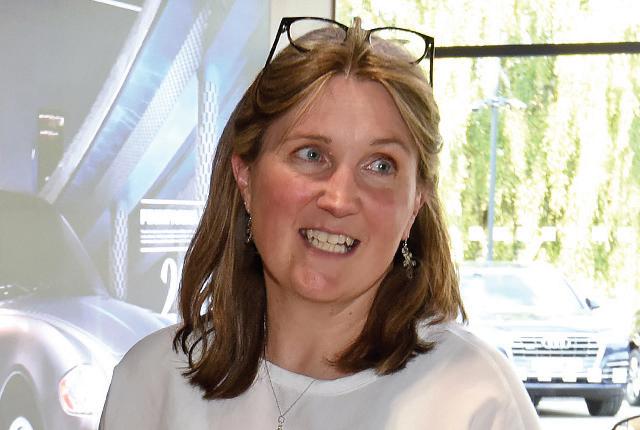
Jo Whittle Operations Director
Jo.whittle@thebusinessmagazine.co.uk
Events team events@thebusinessmagazine.co.uk



Date: November 13
Venue:






South West & West Midlands edition: Bristol & Bath, Gloucestershire, Worcestershire & Hereford, Coventry & Warwickshire, Swindon & North Wiltshire
Editorial
Print Editor Nicky Godding nicky.godding@thebusinessmagazine.co.uk
The region’s most influential B2B magazine, in print and online for news, features, interviews and business sector analysis.
2025 Print issues will be published in January, March, May, July, September and November
Managing Director Richard Thompson richard.thompson@thebusinessmagazine.co.uk
Managing Editor Stephen Emerson stephen.emerson@thebusinessmagazine.co.uk
Operations Director Jo Whittle jo.whittle@thebusinessmagazine.co.uk
South East edition: Oxfordshire & Thames Valley Berkshire & Buckinghamshire Surrey, Kent & Sussex Solent & South Coast Magazine Design: Origin Creative I www.origin-creative.com
Senior Reporter Daniel Face daniel.face@thebusinessmagazine.co.uk
Research & Rankings
Researcher Laura Clarke laura.clarke@thebusinessmagazine.co.uk
Events
Events Executive Lauren McCarron lauren.mccarron@thebusinessmagazine.co.uk
Events Assistant Katie Jackson katie.jackson@thebusinessmagazine.co.uk
Marketing
Digital Marketing Scott Whittle scott.whittle@thebusinessmagazine.co.uk
Commercial
Head of Client Relations Peter Laurie Thames Valley peter.laurie@thebusinessmagazine.co.uk
Business Manager Alan Lindstrom South Coast alan.lindstrom@thebusinessmagazine.co.uk
Business Development Owen Thomas Manager South West owen.thomas@thebusinessmagazine.co.uk & West Midlands
Production Manager Steve Banbury steve.banbury@thebusinessmagazine.co.uk
Events events@thebusinessmagazine.co.uk
Accounts finance@thebusinessmagazine.co.uk
General Enquiries editorial@thebusinessmagazine.co.uk
Magazine Printers: The Manson Group I www.mansongroup.co.uk Registered Office: 24 Bell lane, Blackwater, Camberley, Surrey, GU17 0NW Contact


